Welcome to Essential Politics, our in-the-moment look at California political and government news.
You’ll find coverage of the 13 congressional races key to the midterm elections, the race to be California’s next governor and what’s happening in Sacramento. Learn what California’s members of Congress are worth.
Visit Essential Washington for coverage of the White House and goings on in the nation’s capital.
Sign up for our free newsletter for analysis and more, and subscribe to the California Politics Podcast. Share your feedback here. To support in-depth journalism, subscribe to The Times. And don’t miss our Essential Politics page in Sunday’s California section.
- Share via
Gavin Newsom releases ad that highlights his push to allow same-sex couples to marry
A new ad from Democratic gubernatorial candidate Gavin Newsom features Phyllis Lyon, who with her partner, Del Martin, received the first marriage license after Newsom vowed to allow same-sex couples to marry when he was mayor of San Francisco in 2004.
The current lieutenant governor’s push for marriage equality thrust him into the national spotlight and he has emphasized that effort to portray himself as a bold, progressive leader.
- Share via
Failed California housing bill was ‘not a bad idea,’ Gov. Jerry Brown says
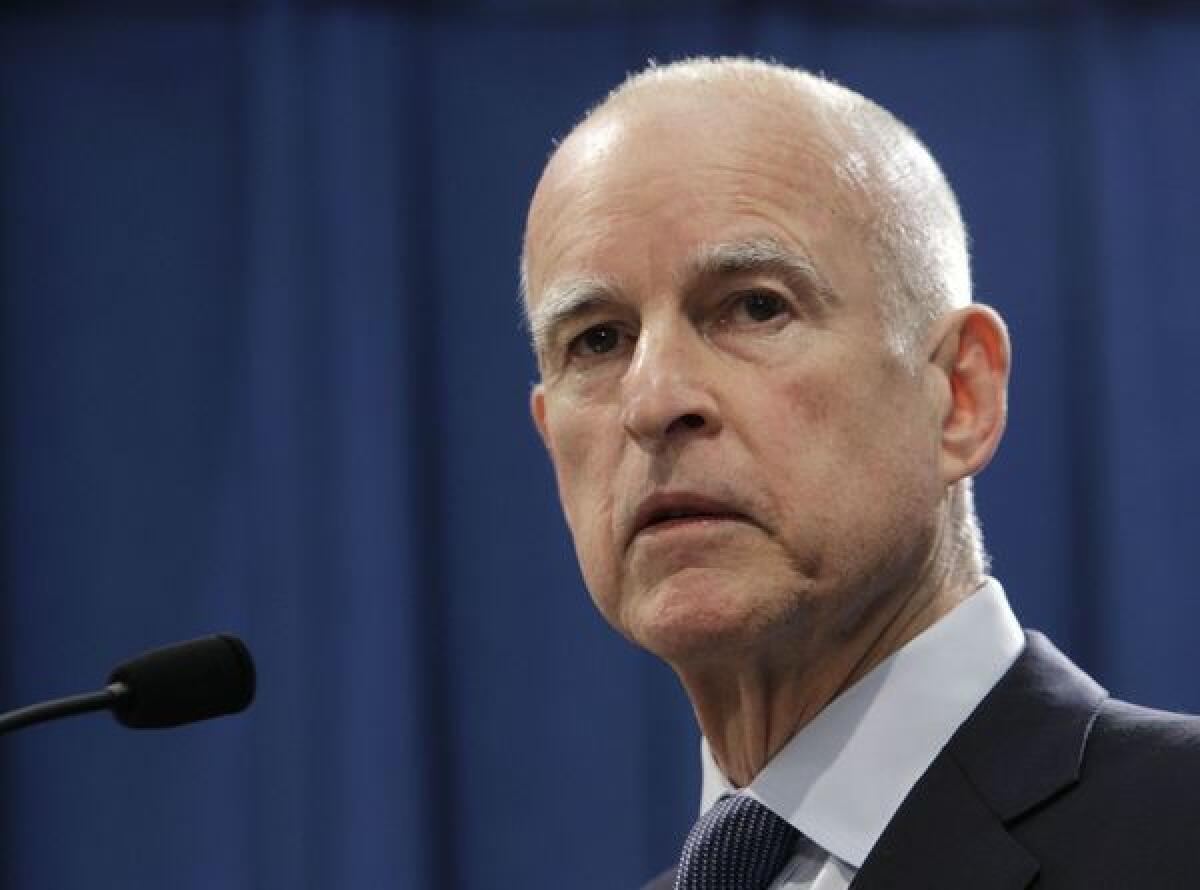
Earlier this month, high-profile housing legislation that would have allowed for four- to five-story apartments and condominiums near transit stops failed to advance in the state Legislature. But had it reached his desk, would Gov. Jerry Brown have signed it? Maybe.
“I think that was not a bad idea,” Brown said of Senate Bill 827 at a meeting with business leaders from the Bay Area Council on Monday afternoon.
The bill, written by Sen. Scott Wiener (D-San Francisco), attracted national attention and a maelstrom of opposition in part because it would have eliminated single-family zoning near transit stops in favor of apartments or condominiums. Brown said that a relative of his who lives in West Portal, a low-density neighborhood in San Francisco, told the governor he was “horrified” by the bill.
Brown also lamented dramatically rising housing costs. He said he bought his first house in Los Angeles in 1973 for $75,000 at a time when his salary as secretary of state was $35,000. Now, he said, buying a house for a little over twice one’s annual salary is virtually impossible anywhere in the state.
FOR THE RECORD
May 1, 9:32 a.m.: This post originally misstated the year Brown purchased his house as 1970. It was 1973.
- Share via
John Cox begins California barnstorm with the delivery of gas tax repeal signatures
GOP gubernatorial candidate John Cox strolled up to the stack of 12 boxes in front of the Los Angeles County registrar-recorder’s offices in Norwalk on Monday and placed his hands on top of his party’s hope for success in 2018.
The boxes, stacked four across and three high, contained 211,000 signatures for an initiative to repeal recent increases in California’s gas tax and vehicle fees.
Cox says the effort has gathered more than 940,000 signatures from registered voters to put the measure on the ballot — far more than the 585,407 signatures that are required.
The aim: to bring out the party’s base to the polls this November and help candidates in tough congressional and legislative races down the ticket.
A USC Dornsife/Los Angeles Times poll in November found 54.2% of registered voters surveyed said they would repeal the tax and fee hike, but a survey a month earlier by another group said a majority would vote to keep the higher taxes.
Cox was flanked by Bill Essayli, a former federal prosecutor who is challenging Democratic Assemblywoman Sabrina Cervantes of Riverside in the June primary.
Cervantes voted for the gas tax and Essayli plans to use that vote against her. He even launched his campaign at a 76 gas station in Norco.
“This is a central issue in my campaign,” he said.
Cox also submitted signatures in San Diego on Monday and is headed to Bakersfield, Fresno and Sacramento, as well as Shasta and Butte counties in coming days.
“We are going all across the state,” Cox said. “The whole state is paying this tax and the whole state wants it gone.”
- Share via
All Californians would be able to serve on state boards — even people in the U.S. illegally — under new bill
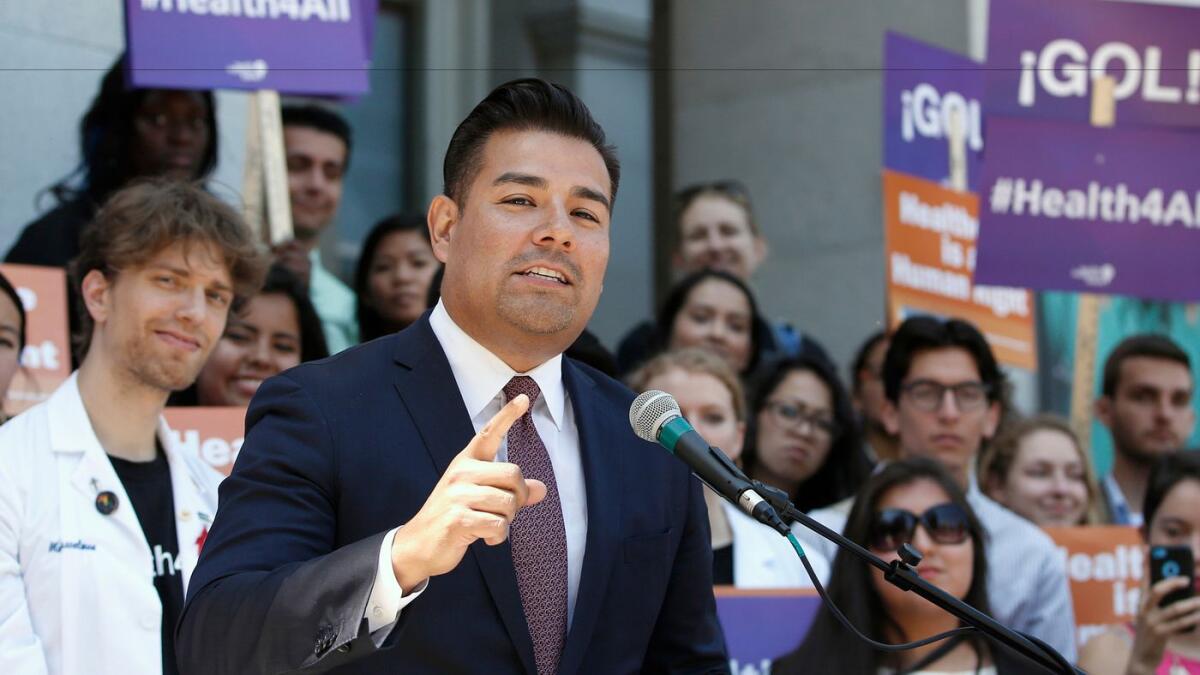
State lawmakers on Monday introduced legislation that would allow all Californians to serve on state boards and commissions regardless of immigration status.
Senate Bill 174, by Sen. Ricardo Lara (D-Bell Gardens) and Assemblywoman Wendy Carrillo (D-Los Angeles), comes as the state is locked in a broader legal battle with the Trump administration over state immigration laws and his call for mass deportations. Lawmakers point to what they say is the state’s own discriminatory history as their basis for introducing the legislation.
The proposal would amend an 1872 provision that was first adopted to exclude Chinese immigrants and other “transient aliens” from holding appointed civil positions. At the time, antipathy toward the Chinese had been building in California, though, Chinese immigrants opened hundreds of businesses across the state and would play a critical role in building the transcontinental railroad.
The Senate bill would delete the phrase “transient aliens” from the government code and make clear that any person, regardless of citizenship or immigration status, can hold an appointed civil office if they are at least 18 years old and a resident of the state. That would allow any Californian to serve on hundreds of boards and commissions that advice in an array of policy areas, including farm labor, history and employment development.
“California’s two million undocumented immigrants are a source of energy for our state,” Lara said in a statement. “It is shocking to read the words of fear and exclusion that are still in California law but belong in history’s trash can.”
- Share via
Tony Mendoza’s fundraising dries up after resignation amid harassment inquiry
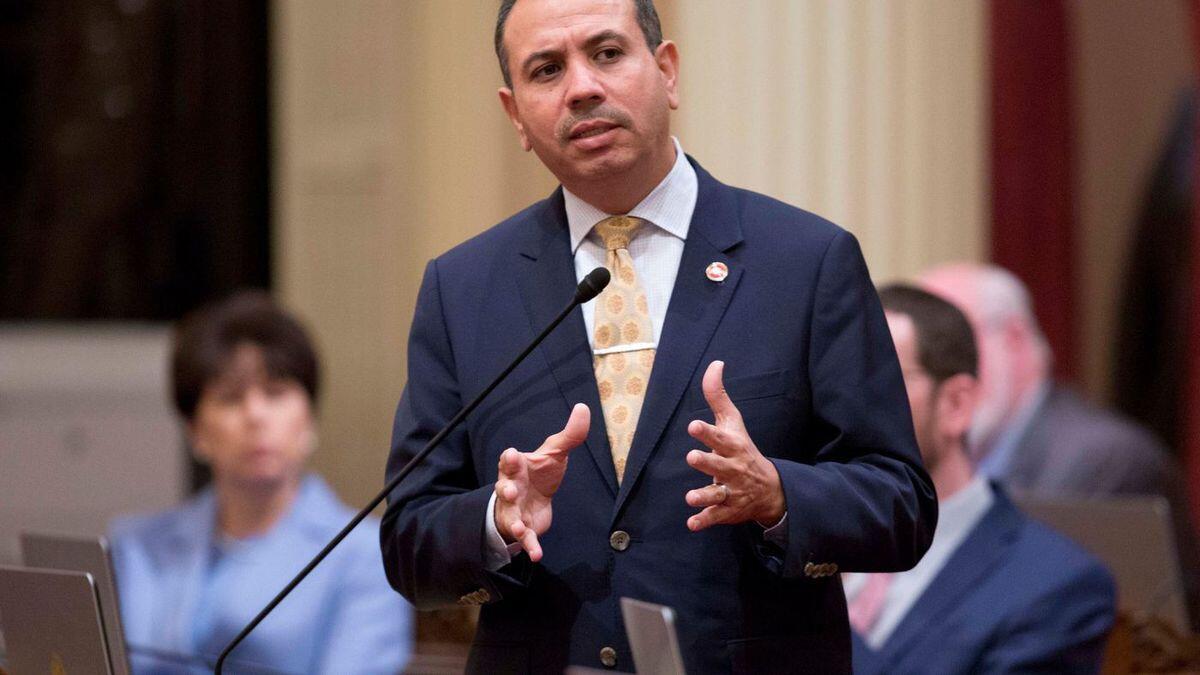
Political contributions to Tony Mendoza, who resigned from the state Senate under pressure amid sexual harassment allegations, have nearly dried up. New documents he filed with the state in his bid to reclaim the seat he once held show that his support has eroded.
As a result, five other candidates for the 32nd District senate seat in the June 5 election have raised more than Mendoza so far this year. With the June 5 election approaching, Mendoza has reported raising just $7,750 in cash from six supporters during the nearly four-month period from Jan. 1 to April 21.
Mendoza, a Democrat from Artesia, went on a leave of absence from the Senate Jan. 3 and resigned a month later under the threat of expulsion from colleagues. An investigation ordered by the Senate found a pattern of “unwanted flirtatious or sexually suggestive behavior” based on testimony from six women. Mendoza has denied wrongdoing.
Last year, Mendoza’s reelection campaign raised $412,600, or an average of about $34,000 per month, from more than 350 supporters.
Most of Mendoza’s 2018 total was contributed by the political arm of the Southern California Pipe Trades District Council 16 on Jan. 22, a month before Mendoza resigned. Mendoza also reported that his campaign loaned $125,000 this year to his legal defense fund. That left him with $446,600 in his campaign account at the end of April.
Mendoza is running against eight Democrats and two Republicans. Democrat Bob J. Archuleta, a Pico Rivera city councilman, raised the most, $210,000, during the period.
On Monday, Mendoza suffered another setback when the State Legislative Women’s Caucus endorsed Democrat Vicky Santana, a member of the Rio Hondo College Board.
- Share via
Newsom and Villaraigosa affairs coming to TV ads in California
An independent political committee backing Republican John Cox for governor released an ad blasting both Lt. Gov. Gavin Newsom and former Los Angeles Mayor Antonio Villaraigosa for their past sexual affairs.
The “California Deserves Better” ad, which was first reported by Politico, criticizes Newsom for having an affair with a woman on his staff in 2005 while he served as mayor of San Francisco. It also goes after Villaraigosa for having an extramarital affair with a television reporter in 2007 while he was mayor of Los Angeles.
The ad, which begins airing on Fox stations in the state’s top media markets Monday, links Newsom and Villaraigosa to the men accused of sexual impropriety in the #MeToo movement, including movie mogul Harvey Weinstein and disgraced “Today” show veteran Matt Lauer.
“Powerful men are finally being held to account, punished for inappropriate sexual conduct with women over whom they exercise power,” the ad begins. “…Newsom and Villaraigosa think the rules shouldn’t apply to them.”
The independent campaign committee, called Restore Our Values, already has raised more than $100,000, said Leigh Teece of Emeryville in Northern California, co-founder of the group.
Teece, the CEO of a nonprofit that helps line up students with professional mentors, said the campaign will actively support Cox. She called him a “true conservative” and noted that he supports cutting taxes and opposes California’s sanctuary state policy.
“John is a business person who has demonstrated integrity,” Teece said.
- Share via
Was that Cisneros in the voicemail? Dispute is latest espisode of Democratic infighting in crowded primary races
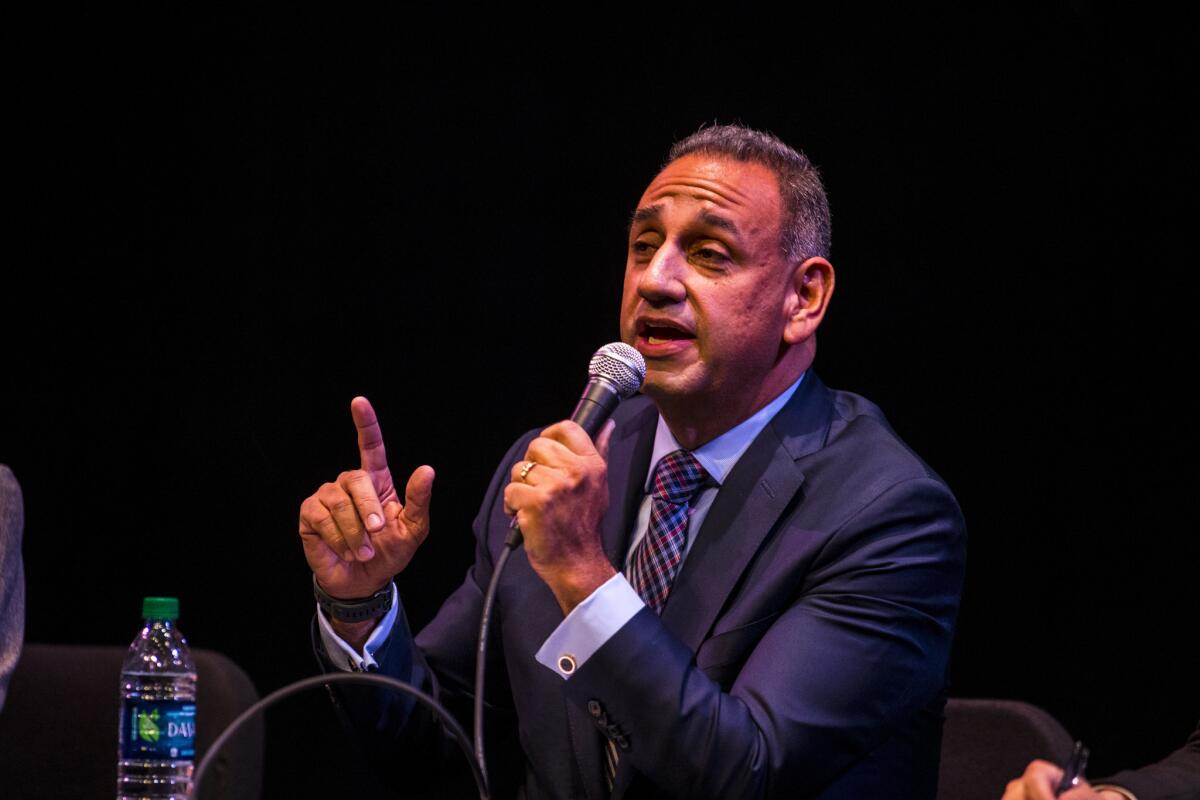
With less than five weeks to go before California’s primary, insults and accusations are flying with abandon in the most crowded races Democrats hope to ultimately win.
The latest example of this is in the 39th Congressional District, where a half dozen Democrats are vying for a chance to replace Rep. Ed Royce, who’s retiring.
It’s one of several California contests where Democratic leaders are already worried that divisions could ultimately split votes and shut Democrats out of key pickup opportunities.
In that race, millionaires Gil Cisneros and Andy Thorburn are going negative … about going negative. Cisneros was recently elevated to the Democratic Congressional Campaign Committee’s “Red to Blue” program in hopes it would serve as a signal to Democratic activists and donors that his campaign was the most viable. But both Cisneros and Thorburn have poured millions into the race, which promises to be a knock down, drag out fight through June 5.
At the center of the latest controversy is a voicemail, allegedly left by Cisneros on Thorburn’s home answering machine earlier this month.
The recording, which the Thorburn campaign turned over to media outlet The Intercept, lasts less than 10 seconds. “Hi Andy, it’s Gil Cisneros. I’m gonna go negative on you,” a man’s voice is heard saying.
Cisneros’ campaign manager Orrin Evans denied the candidate made the call, posting a cease and desist letter to The Intercept on Twitter. The letter, sent by a Cisneros campaign attorney, called the voicemail “fabricated” and demanded that the story be taken down, calling it “defamatory.” It gave the publication until 3 p.m. Friday to take down the story before they “pursue all legal rights and remedies.”
An attorney for The Intercept, in a letter to Cisneros, said the publication confirmed with “multiple sources familiar with Mr. Cisneros” that his voice was on the recording, and that it stands by its reporting.
Thorburn’s camp says it “flatly rejects” Cisneros’ denial, and that the timing of a negative website filled with unflattering background on Thorburn, released three days later, suggests it was him.
Track the California races that could flip the House
According to The Intercept’s report, Cisneros’ campaign manager did not respond to initial inquiries about the voicemail, calling its questions “ridiculous.” In a follow-up statement Friday, Evans said called the episode a “dirty, desperate trick” by the Thorburn campaign and said they are “readying to pursue legal action for defamation and false light” against both him and the publication.
“It sounded like him to me!” said Thorburn’s wife, Karen, in a statement released by the campaign. She was the one who first heard the voicemail, they said.
Thorburn campaign manager Nancy Leeds called Cisneros’ threats “Trump-like tactics” and accused the candidate of trying to “harass and intimidate anyone who stands in his way.”
It’s not the first time candidates from the same party have clashed in the lead-up to the June 5 primary, and it’s all but certain to not be the last. Cisneros sued two of his opponents, Thorburn and Sam Jammal, over their ballot descriptions until they had to change them.
Earlier this month, Democrat Bryan Caforio asked his opponent, Katie Hill, to sign a pledge rejecting the use of independent expenditure committees, entities that neither of them can legally coordinate with, in the race to unseat Rep. Steve Knight (R-Lancaster). Hill refused and called the attempt “hollow” and likened it to “political theater,” while Caforio accused her of “empty campaign promises.”
- Share via
California Politics Podcast: The money raised in the race for governor hints at a race that’s now red hot
With less than six weeks before election day, the cash raised in the California governor’s race mirrors the overall dynamics: one major front-runner and a heated race for second place.
This week’s podcast episode offers a glimpse into those cash reports and how the Republican field seems more settled in a new statewide poll than the battle between Democrats.
We also examine the reasons why a nationally talked-about housing bill in Sacramento was killed by the Democratic author’s own allies.
I’m joined by Times staff writers Melanie Mason and Liam Dillon. You can subscribe to the podcast on iTunes, SoundCloud and Stitcher.
- Share via
L.A. County politician sexually assaulted woman when she was 16, lawsuit claims
A woman sued an unnamed politician in Los Angeles County on Friday, alleging the man sexually assaulted her when she was a teenager after he gave her an unusual-tasting drink.
The politician, identified as John Doe, was in his early 40s and a “public figure” at the time of the 2007 assault, according to the lawsuit filed in Los Angeles Superior Court.
The man is an elected official today and lives in Los Angeles, said attorney Lisa Bloom, who is representing the woman identified in the lawsuit as Jane Doe. Bloom declined to say what branch of government the man represents.
- Share via
Villaraigosa touts his working-class upbringing, accomplishments as mayor in first TV ad
Democrat Antonio Villaraigosa released his first TV ad in the governor’s race Friday, touting his record and accomplishments as mayor of Los Angeles when up against the economic downturn during the recession.
The 30-second television spot opens with a sweeping shot of Los Angeles and cuts to Villaraigosa sitting on a bus.
“In kindergarten, my sister and I took three buses to get to school. As mayor, I remembered that,” Villaraigosa says into the camera. “And despite the recession, we built more new schools and rail lines than any city in America, added 200,000 living wage jobs, built 20,000 units of affordable housing and nearly doubled graduation rates.”
Campaign spokesman Luis Vizcaino said the ad will air statewide over the next week at a cost of approximately $1 million. The commercial will being airing Saturday.
Two Democratic rivals in California’s race for governor, Lt. Gov. Gavin Newsom and state Treasurer John Chiang, also launched ads this week, signaling the biggest ramp-up of the campaign as the June 5 primary approaches.
Newsom is the front-runner, while Villaraigosa is battling for second place with Republican John Cox. One recent poll has Villaraigosa trailing both Cox and Republican Assemblyman Travis Allen of Huntington Beach. Chiang has been stuck in the single digits in almost all polling in the race.
Last week, an independent expenditure group called Families and Teachers for Antonio Villaraigosa for Governor, funded largely by a trio of wealthy charter school backers, launched a spot in support of the former mayor of Los Angeles. That ad campaign is focused on increasing Villaraigosa’s chances of coming in second in the June 5 primary and moving on to the general election.
Villaraigosa’s ad, titled “Three Buses,” emphasizes the struggles he faced growing up in East Los Angeles and addresses one of his central campaign themes — that he’s the candidate best suited to help working-class Californians.
“I know how far a bus can take you,” Villaraigosa says in the ad.
- Share via
California lawmakers shelve proposal to ban tackle football for children under 12

Faced with a lobbying blitz by youth football fans, state lawmakers have sidelined a proposal that would have made California the first state to prohibit minors from playing organized tackle football before age 12, representatives said Friday.
The measure had been proposed after consultation with medical professionals who believe limiting tackle football would help prevent young athletes from sustaining long-term brain damage caused by repetitive tackling, hitting and blocking.
Assemblyman Kevin McCarty (D-Sacramento) confirmed Friday that he has cancelled a committee hearing scheduled for next week on the Safe Youth Football Act, signaling his decision that AB 2108 will not advance to a vote this year.
“We’re taking a time out,” McCarty said Friday.
Multiple studies are expected in the coming months on the health impacts of football on the brains of children and they could inform a future debate, said Terry Schanz, the assemblyman’s chief of staff.
“It’s an important issue that he is going to continue to look at,” Schanz said.
The bill, which originally banned tackle football for minors before high school, was amended but still faced a lack of support in the Legislature after youth football backers launched a social media drive under the banner of a new Save California Football Coalition. They collected more than 45,000 signatures opposing the legislation.
Pop Warner spokesman Brian Heffron said Friday the decision to shelve the bill “is welcome news for the 100,000 kids who play youth football in California. We’re grateful to those in the Assembly who recognize that tackle football has never been safer, thanks to our many rule changes, improved coaching education and commitment to player safety.”
Assemblywoman Lorena Gonzalez Fletcher (D-San Diego), a co-author of the measure, said the bill may not get a vote this year but the issue is not going away.
“I’m going to continue to talk about the dangers of youth tackle football whether there’s a bill or not,” she said. “I’m confident that one day in California, kids under 12 will be playing only flag football.”
Supporters of the bill had cited studies that show chronic traumatic encephalopathy is caused by repetitive impacts to the head sustained over a period of time. Gonzalez Fletcher said children who play contact sports during critical years of brain development are at a significantly greater risk for neurological impairments and CTE later in life.
However, Pop Warner officials said they have taken steps to make the sport safer for young kids, including “a series of dramatic rule changes and safety protocols” implemented since 2010 with guidance from an independent medical advisory committee of neurologists, sports medicine professionals and medical researchers.
- Share via
Sen. Dianne Feinstein won’t participate in pre-primary debate
California Sen. Dianne Feinstein will not participate in a proposed pre-primary debate because there are too many candidates in the race, her campaign spokesman said Thursday.
Political activists with the group Indivisible Los Angeles said they had a venue and date — May 5 — reserved for a debate with four of the Senate candidates. But they said if Feinstein does not participate, it will be canceled.
Feinstein faces 31 primary opponents in her bid for a fifth full term representing California in the Senate.
Feinstein staffers initially said she had a prior commitment on May 5 in San Francisco. When organizers offered to let her campaign pick another date, her campaign said it wasn’t fair for the group to invite only some of the candidates when there is such a big field, said Tudor Popescu, volunteer community organizer with Indivisible Los Angeles.
The invited candidates, all Democrats, were Feinstein, state Sen. Kevin de León, political action committee director Alison Hartson and lawyer Pat Harris. They were selected based on fundraising and poll numbers. There are 11 Republicans, 10 Democrats, nine independents and 2 third-party candidates running for Senate on the June ballot.
Indivisible Los Angeles is still hoping Feinstein will pick another date, Popescu said.
Feinstein spokesman Jeff Millman pointed to a San Francisco Chronicle endorsement of Feinstein, which indicates that she told the editorial board she would be willing to have a debate ahead of November’s general election.
“Senator Feinstein looks forward to debating her opponent in the general election,” Millman said in an email.
Feinstein holds a substantial lead in both fundraising and in the polls. Front-runners in statewide races have routinely declined to debate their challengers, knowing that it’s free publicity for candidates who don’t have the cash to increase their name recognition on their own.
De León spokesman Jonathan Underland said the state senator has done candidate forums before, but planned to attend the May 5 debate only if Feinstein did.
“We basically said we’ll clear his calendar 100%, we’ll clear his calendar if Feinstein shows up,” Underland said. “We‘d love to make it happen, but we want her to be there.”
- Share via
NRA, Olympic shooter sue California over its restrictions on ammunition sales

The National Rifle Assn. and its state affiliate have filed a fourth lawsuit against California over its gun control laws, this time challenging new restrictions on the sale and transfer of ammunition.
The NRA and the California Rifle and Pistol Assn. filed a challenge in federal court to a requirement that ammunition sales and transfers be conducted “face to face” with California firearms dealers or licensed vendors, ending purchases made directly from out-of-state sellers on the internet. The lawsuit in the United States District Court for the Southern District of California also challenged a requirement starting next year for background checks for people buying ammunition.
The lawsuit was filed in the name of Kim Rhode, a six-time Olympic medal-winning shooter, and others. It challenges California’s new ammunition sales restrictions as a violation of the 2nd Amendment and the commerce clause of the United States Constitution.
Restrictions on ammunition purchases were included in Proposition 63, approved by voters in 2016, and in bills approved by the Legislature.
“As a result of these laws, millions of constitutionally protected ammunition transfers are banned in California,” Chris W. Cox, executive director of the NRA’s Institute for Legislative Action, said in a statement. “California’s law-abiding gun owners are sick of being treated like criminals and the NRA is proud to assist in this fight.”
Lt. Gov. Gavin Newsom, who is running for governor, defended his initiative and vowed to fight the NRA lawsuit.
“We wrote Proposition 63 on solid legal ground and principle: If you’re a felon banned from possessing guns in California, then you should not be able to purchase the ammunition that makes a firearm deadly,” Newsom said in a statement. “California voters said loudly and clearly that guns and ammunition do not belong in the hands of dangerous individuals — but once again, the NRA has prioritized gun industry profits over the lives of law-abiding Californians.”
- Share via
Nunes, McClintock races downgraded from ‘safe’ to ‘likely’ Republican by one election handicapper
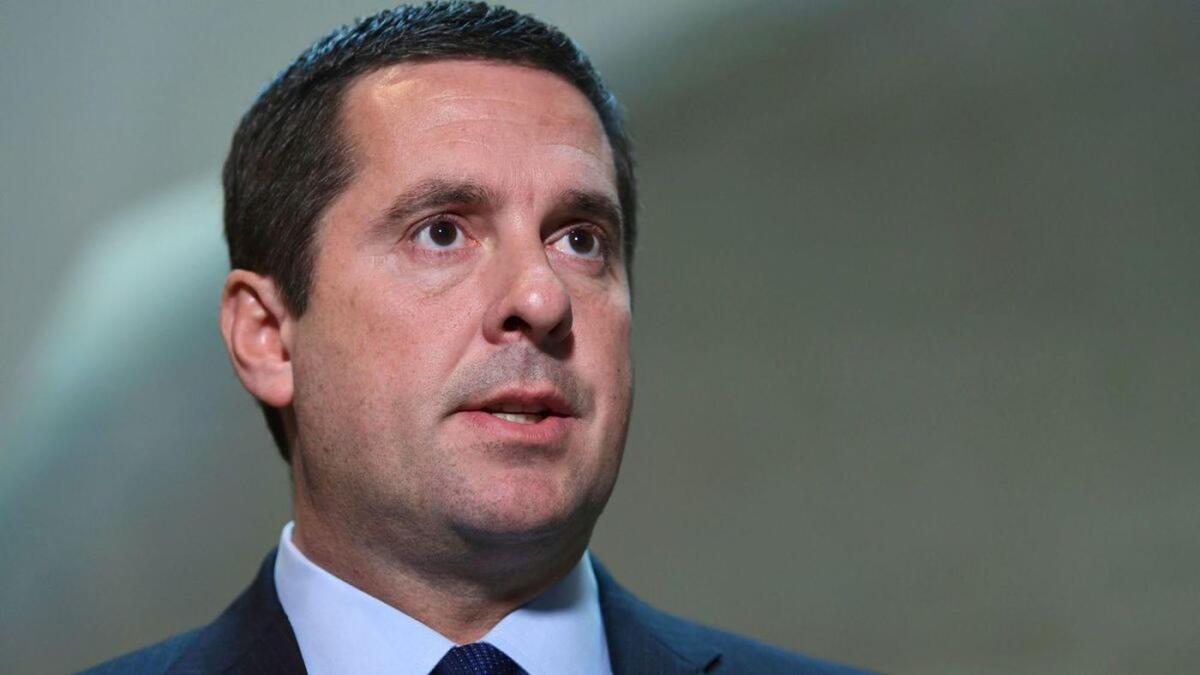
Reps. Devin Nunes (R-Tulare) and Tom McClintock (R-Elk Grove) fell behind in one election handicapper’s ratings on Thursday, giving more optimism to Democrats who hope to regain control of the House in November.
Nunes’ and McClintock’s districts were downgraded to “likely Republican” from “safe Republican” by analysts at Larry J. Sabato’s Crystal Ball at the University of Virginia Center for Politics on Thursday.
Nunes has made a name for himself as a Trump defender and as chairman of the House Intelligence Committee, a newfound notoriety that the analysts said could both hurt and help him. He raised more than $1 million in the first quarter of 2018, but so did his Democratic opponent, Andrew Janz, a Fresno County deputy district attorney.
McClintock, who only scraped out a close victory in 2008, a strong Democratic year, sits in a suburban Sacramento district Trump won, but it’s likely he will have a credible Democratic challenger in November.
See how Times politics editors rank the toughness of those races.
- Share via
Republicans hope to ride a gas-tax repeal to victory
In a Central Valley barn decked out in red, white and blue, dairyman and state Senate candidate Johnny Tacherra drew cheers from a crowd of fellow farmers when he said he opposes the California Legislature’s hike on gas taxes and vehicle fees.
“I would not have voted for that. It is not the time to be voting on (raising) the gas tax,” said Tacherra, a Republican running against Democratic Assemblywoman Anna Caballero, who voted for the tax increase last year.
Three hundred miles away the same week, a campaign mailer arrived at homes in Orange County from an Assembly candidate with a message blaring from the cover in bold type: “Republican Greg Haskin — tough enough to stand up to Jerry Brown and repeal the gas tax.”
- Share via
Treasurer John Chiang launches ad in governor’s race touting his record as a fiscal steward
In his first television ad in the governor’s race, state Treasurer John Chiang touts his record on fiscal issues as California faced the recession.
“Some thought we were done,” Chiang says in a voiceover in the 30-second spot he released Thursday, with images of him standing seriously at a lectern and complimentary headlines about his work as controller and treasurer. “But I knew better. I made the tough calls. And brought California back from the brink of financial disaster because you trusted me to manage our economy.”
Chiang’s campaign is spending about $500,000 to air the ad in Los Angeles and San Diego in coming days.
That buy is dwarfed by seven-figure purchases for ads supporting Lt. Gov. Gavin Newsom and former Los Angeles Mayor Antonio Villaraigosa. Newsom is the front-runner, while Villaraigosa is battling for second place with Republican businessman John Cox. Chiang has been mired in the single digits in almost all polling in the race.
His ad, called “Quiet Storm,” tries to portray Chiang as a progressive who is effective and can move policy in Sacramento.
Chiang points to his work challenging Wells Fargo before arguing that he could accomplish what “doubters” say is impossible to improve the state’s healthcare, housing and schools.
“I say, we got this,” Chiang concludes.
- Share via
Been ignoring the race for California governor? That’s OK, in some ways it’s just starting
On a recent trip to Iowa, Eric Garcetti — the mayor of Los Angeles and a possible 2020 White House contestant — raised eyebrows with a bit of exuberant outreach.
Los Angeles and Iowa, Garcetti insisted, “have a ton in common,” and he didn’t simply mean both are inhabited by carbon-based life forms needing oxygen to survive.
Urban or rural, farmer or fashion plate, all of us harbor the same hopes and dreams, the mayor suggested, and if it wasn’t a terribly original thought it also wasn’t the most egregious sort of political pandering — like, say, ordering that every home in Los Angeles be powered by Iowa-produced ethanol.
- Share via
California voters should expect to decide on an $8.9-billion water bond in November

A proposal to borrow $8.9 billion for improvements to California’s water quality systems and watersheds and protection of natural habitats is eligible for the statewide ballot in November, Secretary of State Alex Padilla announced in a press release Wednesday.
Padilla said the measure, which is backed by agricultural interests, had exceeded the 365,800 valid signatures it needed to qualify for the general election ballot.
The bond measure will appear on the ballot unless proponents withdraw it by June 28, the release said.
The bond is one of many voters could decide on in 2018. A $4-billion bond for parks and water infrastructure improvements will appear on the June 5 ballot. State lawmakers approved it last year.
- Share via
They came for Darrell Issa. They stayed with their inflatable chicken, blue wall and signs for political therapy
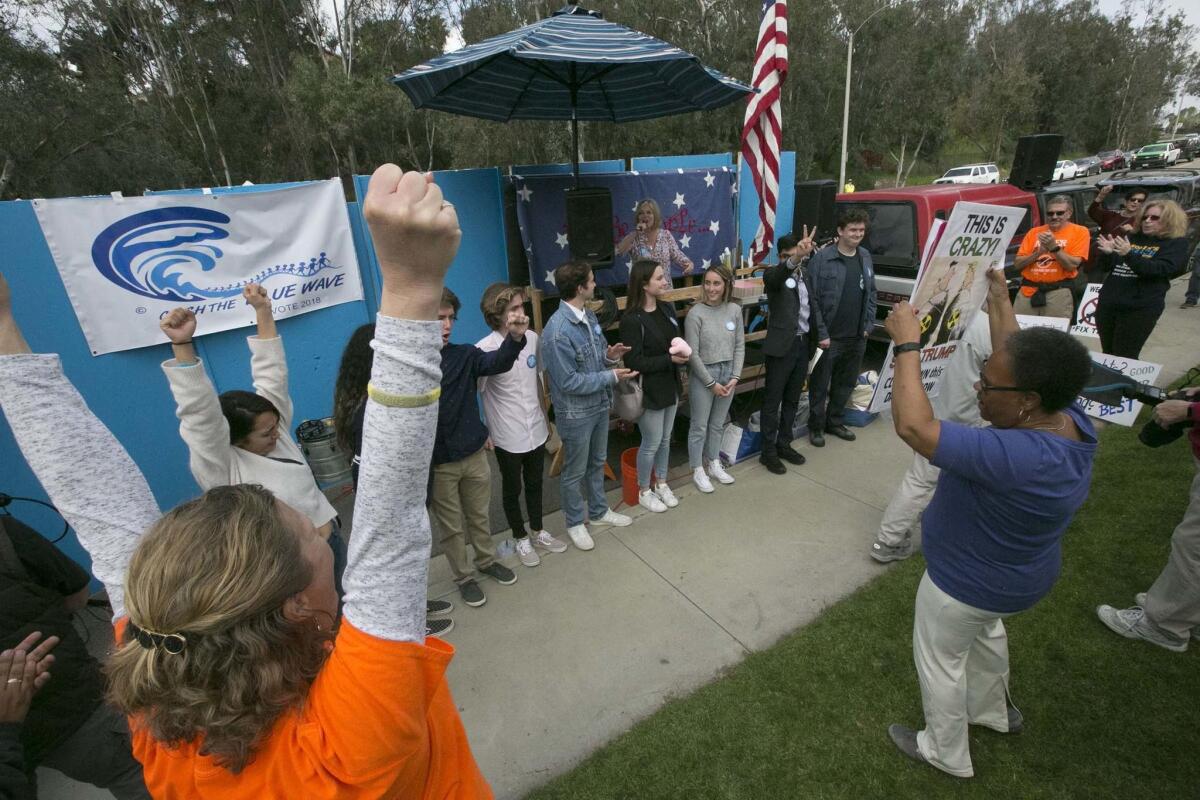
A mother of two turned ringleader of “the resistance” and more than a hundred of her faithful followers gathered on Tuesday morning outside Rep. Darrell Issa’s office in a northern San Diego County suburb. Across the street was her foil, a wedding DJ in a red “Make American Great Again” cap, setting up hefty speakers for an upcoming war of words.
For about 65 weeks the deep divide in America played out along this 100-yard stretch of road in Vista. Here, at 10 a.m. every Tuesday, passersby found signs, chants, songs and, if they were lucky, sometimes a 20-foot-tall inflatable chicken with a Trump-esque coif.
They’d also glimpse the state of the body politic in 2018, a time when shock has turned to anger and post-2016 calls for reconciliation have morphed into grudging acceptance that each side might be better off in their respective corners. Or in this case, their sides of the street.
On Tuesday, the anti-Issa, anti-Trump contingent fought this particular battle for the last time, declaring it their final protest at the congressman’s office. They said they planned to use their energy to knock on doors and get out the vote, with an occasional protest on the side. Their pro-Trump rivals vowed to show up wherever they do.
- Share via
Efforts to regulate bail companies have some unlikely allies: bail agents

In recent years, the seriousness and number of official complaints related to the bail industry in California have significantly increased while bail agents and bounty hunters face limited oversight, putting vulnerable communities at risk of fraud, embezzlement and other forms of victimization.
This year, as Gov. Jerry Brown has pledged to work with lawmakers in a push to overhaul how courts assign defendants bail and to better regulate bail agencies, even some who profit from the court practice admit it’s time for regulation. These bail and bail-recovery agents could become unlikely allies, saying they advocate for change because they’ve seen the system abuse the poor.
- Share via
California voters: Get ready for an onslaught of television ads
After a sleepy campaign, California voters are now being bombarded with television advertisements in the governor’s race, an onslaught that is expected to ramp up in coming weeks.
The ads most frequently seen on television are those promoting Lt. Gov. Gavin Newsom, the front-runner in the race, and former Los Angeles Mayor Antonio Villaraigosa, who is trying to secure the second spot in the June primary.
Newsom’s campaign and an outside group backing Villaraigosa are spending seven figures weekly on these efforts, according to filings with the California secretary of state’s office and a media buyer who asked not to be identified in order to freely discuss the ads.
Other gubernatorial candidates are expected to hit the airwaves soon, the media buyer said. State Treasurer John Chiang has reserved a half-million dollars in the coming days in the Los Angeles and San Diego markets, and Villaraigosa’s campaign has requested availability in at least five of the state’s biggest TV markets.
The GOP candidates in the race, who will be seeking the state Republican Party’s endorsement at its convention next weekend, have been much less active.
Businessman John Cox in recent weeks has been spending about $90,000 per week, but doubled that this week in Los Angeles and added small buys on KFI-AM radio and cable in markets including Fresno, Bakersfield and Salinas.
State Assemblyman Travis Allen of Huntington Beach, who has been scooping up Republican Party endorsements across the state, has yet to make a notable television or radio buy, though he and Cox have received some attention as commentators on Fox News.
- Share via
Republicans ready to turn in signatures for ballot measure to repeal California gas-tax increase

Republican activists said Tuesday that they have collected at least 830,000 signatures for an initiative to repeal recent increases in California’s gas tax and vehicle fees, more than enough to qualify the measure for the November ballot.
The activists need 585,407 signatures of registered voters to qualify the ballot measure.
Because signatures are still being processed and counted by the campaign, backers hope to have 900,000 by the time they begin turning them in to the counties on Friday, according to Carl DeMaio, a former San Diego City Council member and organizer of the drive.
“The breadth and depth of voter anger over the car and gas tax hikes is just amazing,” said DeMaio, who hosts a radio talk show. “We are seeing Democrats, independents and Republicans sign the petition and volunteering to carry the petition, people from all walks of life.”
The initiative targets a law approved in April 2017 by the Legislature and Gov. Jerry Brown that is expected to raise $5.4 billion annually for road and bridge repairs and improvements to mass transit.
The money comes from a recent 12-cents-per-gallon increase in the gas tax, a 20-cent increase in the diesel fuel excise tax and a new annual vehicle fee ranging from $25 for cars valued at under $5,000, to $175 for cars worth $60,000 or more.
The petition drive raised more than $2 million with significant contributions from the California Republican Party and Republican members of Congress from California, including House Majority Leader Kevin McCarthy of Bakersfield and Reps. Ken Calvert of Corona and Mimi Walters of Irvine.
Republicans hope the issue will help their candidates for office in this year’s election and hurt Democrats who support the higher taxes.
“I think this is going to put Democrats in real bad spot,” DeMaio said.
A spokesman for Brown declined to comment until the signatures are filed.
DeMaio said there were approximately 20,000 volunteer petition circulators who brought in more than 250,000 signatures, with the rest collected by paid circulators who received $1 to $2.50 per signature.
“It’s a pretty comfortable margin [of signatures] that we have been able to hit here,” DeMaio said.
Opposition will grow, he said, as more Californians get their annual vehicle registration notice.
The repeal campaign hopes to raise $5 million for the campaign to pass the constitutional amendment, which would not only repeal the increase in the gas tax and vehicle fees but require future increases to be submitted to voters.
“We know that Gov. Brown and his cohorts are going to spend an amazing amount of money to mislead voters,” DeMaio said. “But I feel pretty confident that we will repeal the gas tax.”
- Share via
Rep. Duncan Hunter sets up trust to raise money for legal expenses amid ongoing criminal investigation
Rep. Duncan Hunter, R-Alpine, has filed paperwork to establish a legal expense fund amid an ongoing federal criminal investigation into misused campaign cash.
Hunter filed the required paperwork March 27, seeking a rarely granted “Legal Expense Fund” through which members of Congress under investigation or being sued in connection with doing their jobs or running for office can raise money for their legal expenses.
Such funds are administered by an independent trustee and allow donors to give above the maximum amount they can contribute a candidate’s campaign. Hunter has spent more than $600,000 of campaign money on lawyers.
- Share via
Kamala Harris says she won’t take corporate donations anymore
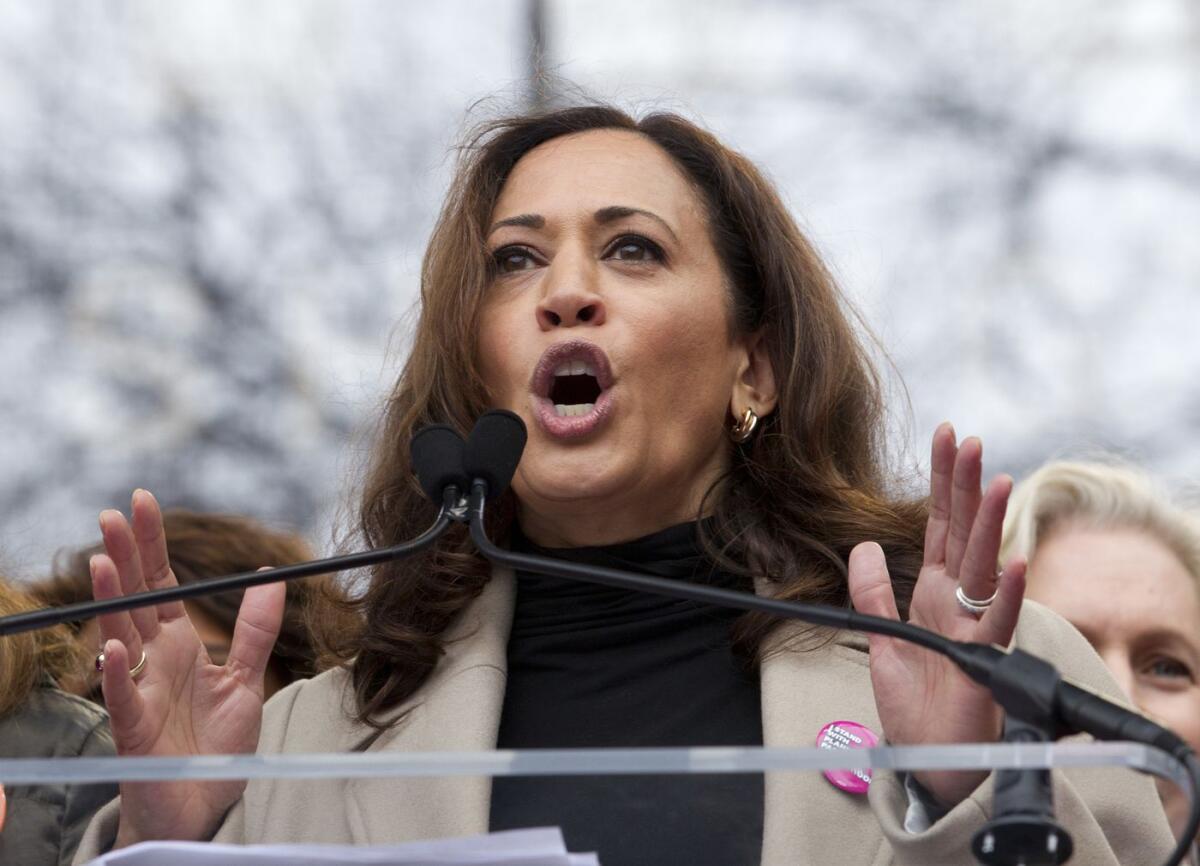
California Sen. Kamala Harris says she will no longer accept money from corporate political action committees.
In an interview with WWPM-FM’s “The Breakfast Club,” in New York that aired Monday, the senator said she wasn’t expecting a question at a town hall this month about whether she would accept money for corporations or corporate lobbyists.
At the time, Harris said “it depends,” but she said on Monday that she had reflected on the matter and changed her mind.
“Money has had such an outside influence on politics, and especially with the Supreme Court determining Citizens United, which basically means that big corporations can spend unlimited amounts of money influencing a campaign, right?” Harris said. “We’re all supposed to have an equal vote, but money has now really tipped the balance between an individual having equal power in an election to a corporation. So I’ve actually made a decision since I had that conversation that I’m not going to accept corporate PAC checks. I just — I’m not.”
You can watch the video of the interview here. (Harris’ corporate money comments come about 30 minutes in.)
Harris wouldn’t be on the ballot for a second Senate term until 2022, though it’s widely believed that she is planning a presidential bid in 2020. Other potential 2020 presidential candidates, including Sens. Bernie Sanders (I-Vt.), Cory Booker (D-N.J.) and Elizabeth Warren (D-Mass.), have also ruled out taking corporate PAC money.
Soon after Monday’s show aired, Harris’ campaign sent out a fundraising request noting her new stance.
“As corporate PACs continue to corrupt our politics and twist Congress’ priorities at your expense, we’re going to focus on raising money from small-dollar, individual donors like you,” the email says.
- Share via
With money tied up in court, California lawmakers try again with new plan to spend $2 billion on homeless housing

A measure to spend $2 billion on housing homeless Californians could be on the November statewide ballot.
State Sen. Kevin de León (D-Los Angeles) is pushing the idea to deal with what he said was a “burgeoning humanitarian crisis whose epicenter is here in California.”
De León’s new measure is a do-over for a 2016 plan passed by the Legislature to redirect $2 billion toward building homeless housing from a voter-approved 1% income tax surcharge on millionaires that funds mental health services. A Sacramento attorney sued over that decision, arguing that the move violated constitutional rules on approving loans without a public vote and that lawmakers shouldn’t take money away from mental health treatment. The case remains active in Sacramento Superior Court and it’s unclear when, or if, the state will be able to spend the $2 billion.
De León’s Senate Bill 1206 would put the $2-billion loan on the ballot in November, freeing up the money if voters approve the measure. De León said had he been able to predict the 2016 plan would end up in court, he would have sought a ballot measure at the time.
“We thought this was like apple pie and baseball and puppies,” De León said. “Who would oppose the idea of repurposing the dollars to build immediate housing as a permanent solution for homelessness? Obviously with a crystal ball, had I anticipated the litigation, I would have worked to place it on the ballot.”
De León noted that the 2016 plan had bipartisan supermajority support in the Legislature, something his new bill also will need to get on the ballot. Sen. John Moorlach (R-Costa Mesa) is a coauthor of the plan.
SB 1206 is scheduled for its first hearing in the Legislature on Wednesday.
Should De León’s measure be approved, it will join a crowded list of housing issues before voters in November. Californians will decide on a separate $4-billion bond to help finance new low-income housing and home loans for veterans. De León said he’s not worried those two measures will compete against each other because voters are aware of the scale of the state’s housing problems and the proposed homeless housing bond redirects existing dollars instead of raising taxes.
“Once [voters] know that the impact on their pocketbook is not existent, I’m confident that they’ll join me and my colleague John Moorlach in support of this measure,” De León said.
- Share via
California lawmakers say too many former felons are being denied professional licenses
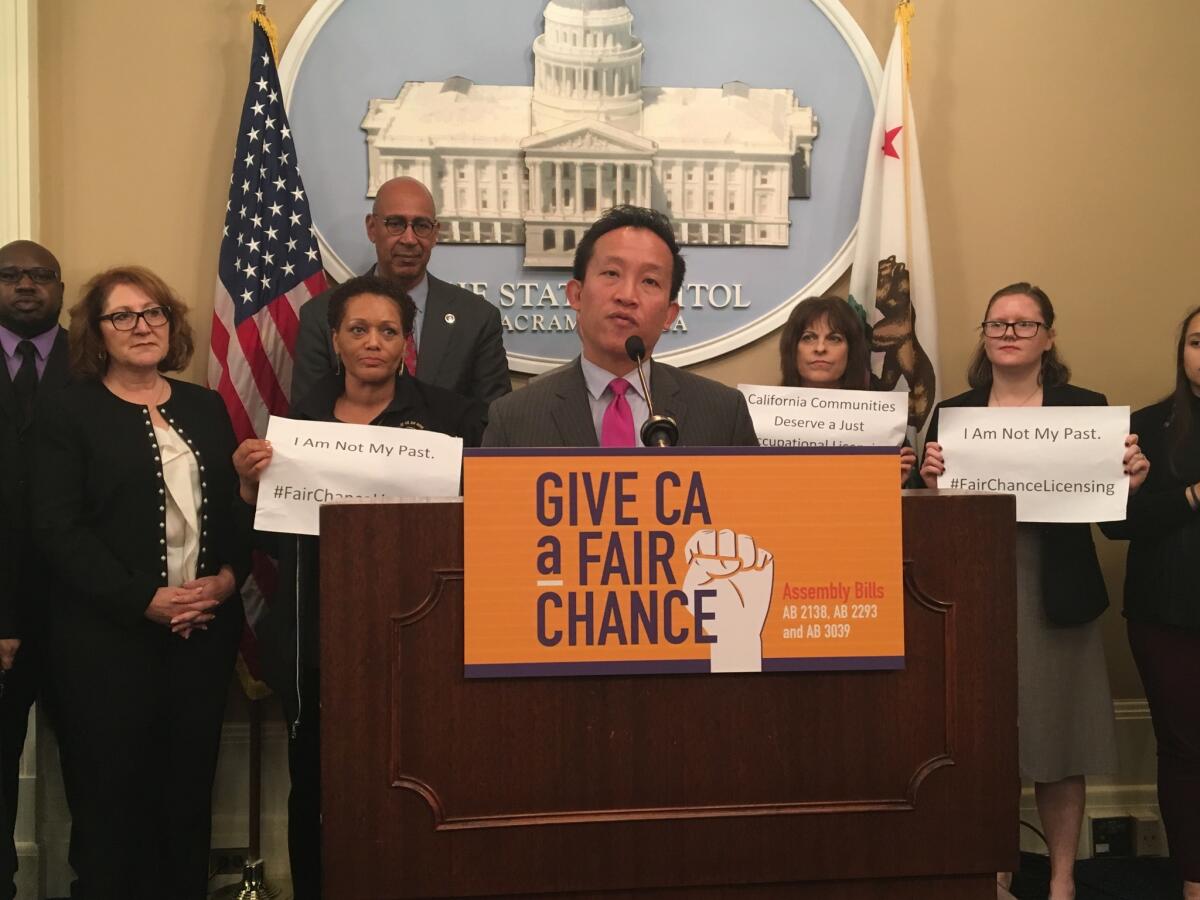
A trio of California Assembly members urged colleagues on Monday to pass legislation that would prohibit state commissions and agencies from rejecting a professional license for those who were once convicted of less serious crimes.
“We can’t say we want to rehabilitate people, and then block them from getting the jobs that they need when they’re released,” said Assemblyman David Chiu (D-San Francisco). “That leads to more recidivism and to more crime.”
The bills, scheduled to be heard in Assembly committees Tuesday, would ban the use of arrest or conviction records as the reason for denying a professional license. The bill would not apply to Californians who served time for any of the offenses on the state’s list of “violent crimes.”
The authors, all Democrats, said that a government-issued professional license is required for some 30% of all jobs in the state. Their bills would change the licensing process at the California departments of Consumer Affairs and Social Services and agencies that certify emergency medical technicians.
The bills would block prior convictions from leading to the delay or denial of a license unless that crime is “directly related” to the profession the person intends to pursue. Two of the bills also specifically say convictions less than 5 years old could continue to play a role in licensing decisions.
Last year, Gov. Jerry Brown signed a law that keeps private sector employers from inquiring about a job applicant’s conviction history prior to an offer of employment.
Advocates joined the lawmakers at a press conference in Sacramento to point out that limits on awarding licenses should focus only on those whose prior criminal activity could pose a threat to consumers.
“Continuing to hold people back for crimes that are 6, 7, 8, 10, 20 years old does not actually make sense if you’re looking at public safety,” said Jael Myrick of the East Bay Community Law Center.
One of the proposals, Assembly Bill 2293, seeks to make it easier for ex-felons to get a license allowing a job with the California Department of Forestry and Fire Protection — the same agency that often uses prison inmates to battle blazes around the state.
“If a person is good enough to risk their life fighting fires for the state of California as an inmate,” said Assemblywoman Eloise Gomez Reyes (D-Grand Terrace), “their previous actions should not prevent from having a job utilizing the skill set that they learned.”
- Share via
Newsom highlights liberal bona fides in his first ad in the governor’s race
Gubernatorial front-runner Gavin Newsom released his first television ad of the race on Monday, days after a well-funded effort to boost fellow Democratic candidate Antonio Villaraigosa went on the air with its own spot.
The 30-second ad, being aired statewide on broadcast and cable, highlights Newsom’s record on same-sex marriage, universal healthcare and gun control.
“The one candidate with the record of bold leadership and bold results,” a narrator says over images of Newsom looking serious and making a speech. It also mentioned endorsements he has received from Sen. Kamala Harris and various unions, and included the slogan, “Courage for a change.”
Newsom’s campaign declined to say how much it was spending to air the spot, which appears designed to appeal to Democratic-base voters.
The lieutenant governor and former mayor of San Francisco is dominating fundraising and polls in the race. Last week, an independent expenditure group called Families & Teachers for Antonio Villaraigosa for Governor launched a spot in support of the former mayor of Los Angeles. The group is funded by a trio of wealthy charter school backers, and by law cannot coordinate with a candidate.
Its ad is aimed at boosting Villaraigosa’s chances of coming in second in the June 5 primary and moving onto the general election. In recent polling, Villaraigosa has placed third, behind Republican businessman John Cox.
The group released the ad on Thursday. The following day, the Newsom campaign’s attorney demanded that California television stations stop airing it, arguing that it violated elections law because it used snippets of video from the Villaraigosa campaign. The independent expenditure committee’s attorney responded by saying the allegations have “no merit” and are misleading.
- Share via
Assembly speaker rebukes building trades union after it targets Assemblywoman Cristina Garcia
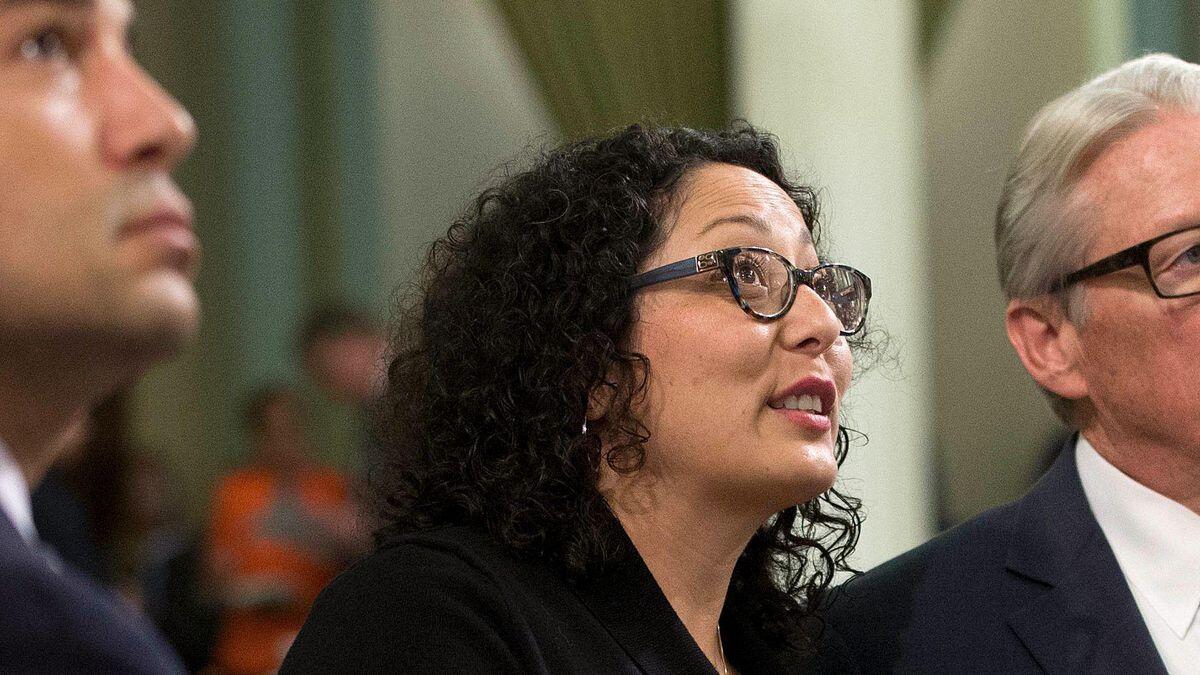
The decision by a politically powerful labor group to openly campaign against an embattled Los Angeles-area lawmaker drew a sharp rebuke on Friday from Assembly Speaker Anthony Rendon.
The Lakewood Democrat lashed out hours after the State Building and Construction Trades Council of California filed paperwork for a political action committee to defeat Assemblywoman Cristina Garcia (D-Bell Gardens). Garcia, who’s seeking her fourth term, took an unpaid leave of absence in February following allegations of sexual misconduct. She has denied the reports and an Assembly investigation remains underway.
Rendon didn’t criticize the labor group by name, insisting instead that the decision was driven by oil and gas industry interests.
“This is a thinly veiled attempt by Big Oil and polluters to intimidate me and my members. It is an affront to my speakership,” Rendon said in a statement. “We are proud of the work that the Assembly has done to increase jobs and wages while defending our environment. We will vigorously defend the members of our caucus from any ill-advised political attack.”
A statement from the labor group, which sparred with Garcia last year on her effort to link new climate change policies with a crackdown on air pollution, said it had decided to “reverse” past support for her.
“The Trades have thousands of hard working members in Garcia’s district, and we look forward to lifting up another Democrat in the 58th Assembly to better represent them and their families,” said the statement.
The political action committee’s campaign finance filing on Friday listed nonmonetary “in kind” contributions from Erin Lehane, a public affairs consultant aligned with the building labor group. Lehane said she had begun “researching” Garcia in November. In January, a former legislative staffer accused her of groping him in 2014.
Lehane, who identified herself as a spokesperson for the labor group’s political action committee, said on Friday that she believed Garcia’s “hypocrisy threatened a movement that will dictate how much harassment and abuse my daughter will face in her work life.”
Garcia, who has been an outspoken advocate for women in the #MeToo movement, has complained that her political opponents helped fan the flames of the accusations. Through a campaign consultant, she declined to comment on Friday.
Rendon’s critique came on the heels of a full-page ad in The Times on Friday, partly paid for by the Trades Council, that criticized “well-funded ivory tower elites” who push proposals that hurt the oil and gas industry.
“We are the real jobs that fuel the real California economy,” read the advertisement.
- Share via
See Team Politics at the Festival of Books this weekend
For anyone interested in politics, this weekend’s L.A. Times Festival of Books at USC will be the place for you.
It’s a great event — the biggest book festival in the country and a showcase for ideas and literature in California.
Members of the Times’ California politics team and the Washington bureau will be there in force. We’ll talk about the contest for governor and the midterm elections on Sunday at 1:20 p.m. There also are a number of panels on the Trump administration and politics, moderated by Times journalists.
Here’s the full schedule. To see where we’ll be, filter the list by Politics & History. Also, don’t miss the Ask a Reporter booth on campus.
- Share via
Legal tiff breaks out over independent committee’s ad backing Antonio Villaraigosa for governor
An attorney representing Gavin Newsom’s campaign for governor is demanding that California television stations cease airing an ad by an independent political committee supporting his Democratic rival Antonio Villaraigosa.
Attorney Thomas A. Willis, in a letter to the stations, said the ad is “false and misleading and violates California law” because it uses snippets of video footage from Villaraigosa’s own campaign ads. Willis called that illegal coordination between the campaign and PAC.
“Under California law, advertisements made by entities other than a candidate are presumed to be ‘coordinated’ — and thus not independent expenditures — when the advertisement replicates, reproduces or disseminates substantial parts of a communication, including video footage, created and paid for by the candidate,” the letter states.
A representative for the independent expenditure committee — Families & Teachers for Antonio Villaraigosa for Governor — fired back. Attorney Brian T. Hildreth says those allegations have “no merit” and accused the Newsom campaign of being misleading.
Hildreth sent a letter to the television stations in response, urging them to ignore the Newsom campaign’s accusations.
He said the Newsom camp “appears to intentionally misrepresent the law” and that the video use was permissible. He said only six seconds of video from Villaraigosa’s campaign ads was used, which is well within the legal limits.
The independent committee is sponsored by the group California Charter Schools Assn. Advocates, according to the California secretary of state’s office. The ad is airing on broadcast and cable stations statewide.
The committee’s ad is focused on Villaraigosa’s record as Assembly speaker and as mayor of Los Angeles when there was a drop in crime.
- Share via
Governor’s race snapshot: Californians are generally upbeat but not focused on the campaign
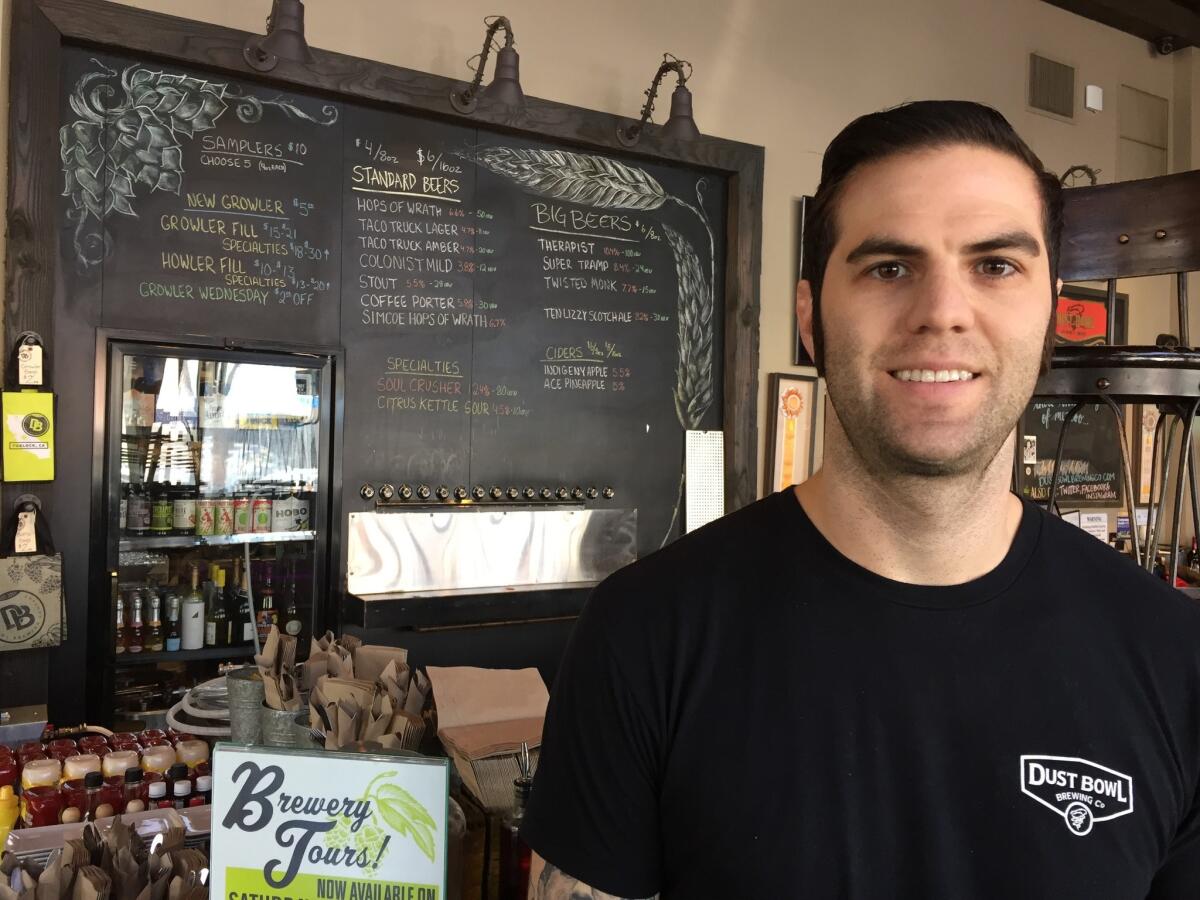
As California chooses a new governor — one of just a handful in the last 40 years not named Jerry Brown — the state seems to be enjoying something unusual in these tumultuous political times: a feeling of relative contentment.
Not to say things are perfect.
Still, more than 100 random interviews conducted over the length and breadth of the state — from Redding in the north to Santee in the south, from the Pacific coastline to the edge of the Sierra Nevada — found most saying things are looking up, at least so far as California’s direction is concerned.
- Share via
California housing crisis podcast: One of the nation’s biggest housing bills meets its demise
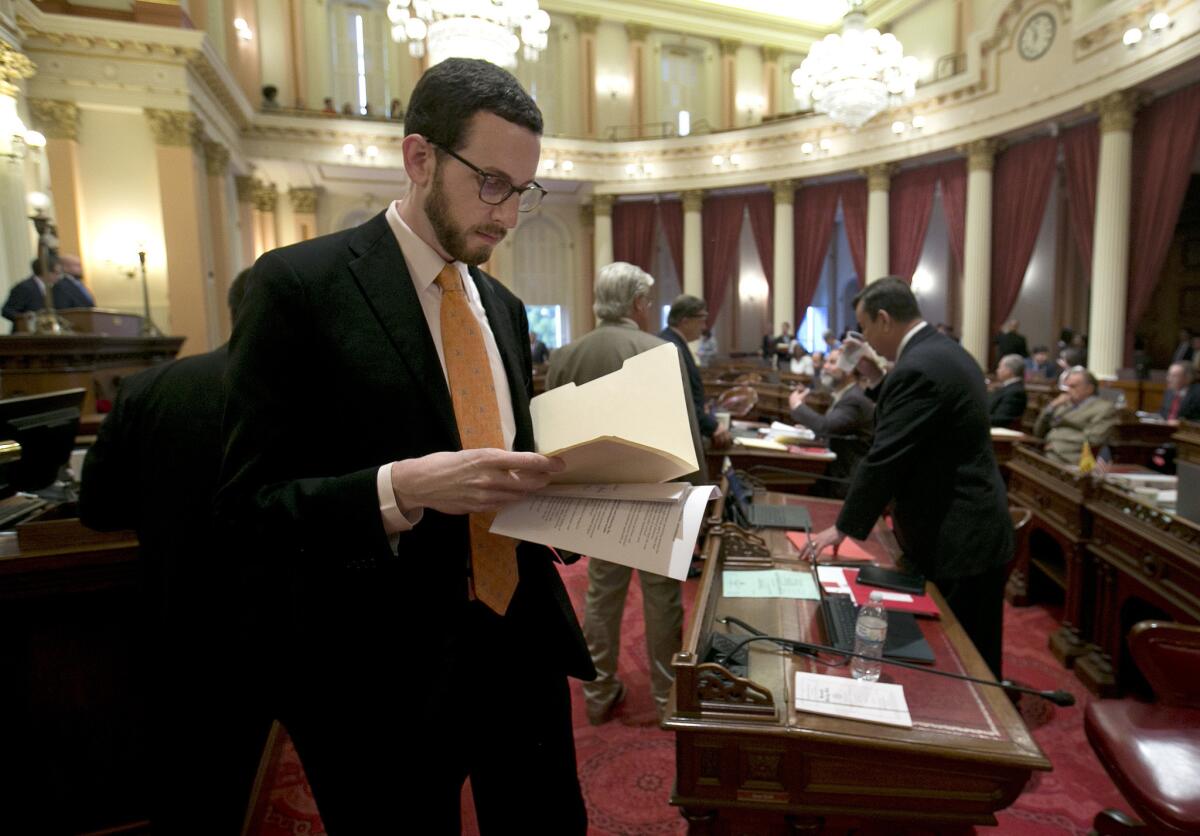
Earlier this week, state senators killed legislation that would have boosted the number of homes that could be built near transit stops across Los Angeles and the rest of the California.
The measure, SB 827, attracted national attention because it aimed to address both California’s housing shortage and environmental goals. But SB 827’s author, Sen. Scott Wiener (D-San Francisco), failed to garner enough support from his colleagues at the bill’s initial committee hearing.
On this episode of Gimme Shelter: The California Housing Crisis Pod, we break down why the bill failed and explain what might come next.
“Gimme Shelter,” a biweekly podcast that looks at why it’s so expensive to live in California and what the state can do about it, features Liam Dillon, who covers housing affordability issues for the Los Angeles Times’ Sacramento bureau, and Matt Levin, data reporter for CALmatters.
You can subscribe to “Gimme Shelter” on iTunes, Stitcher, Soundcloud, Google Play and Overcast.
- Share via
Sierra Club backs Gavin Newsom for California governor
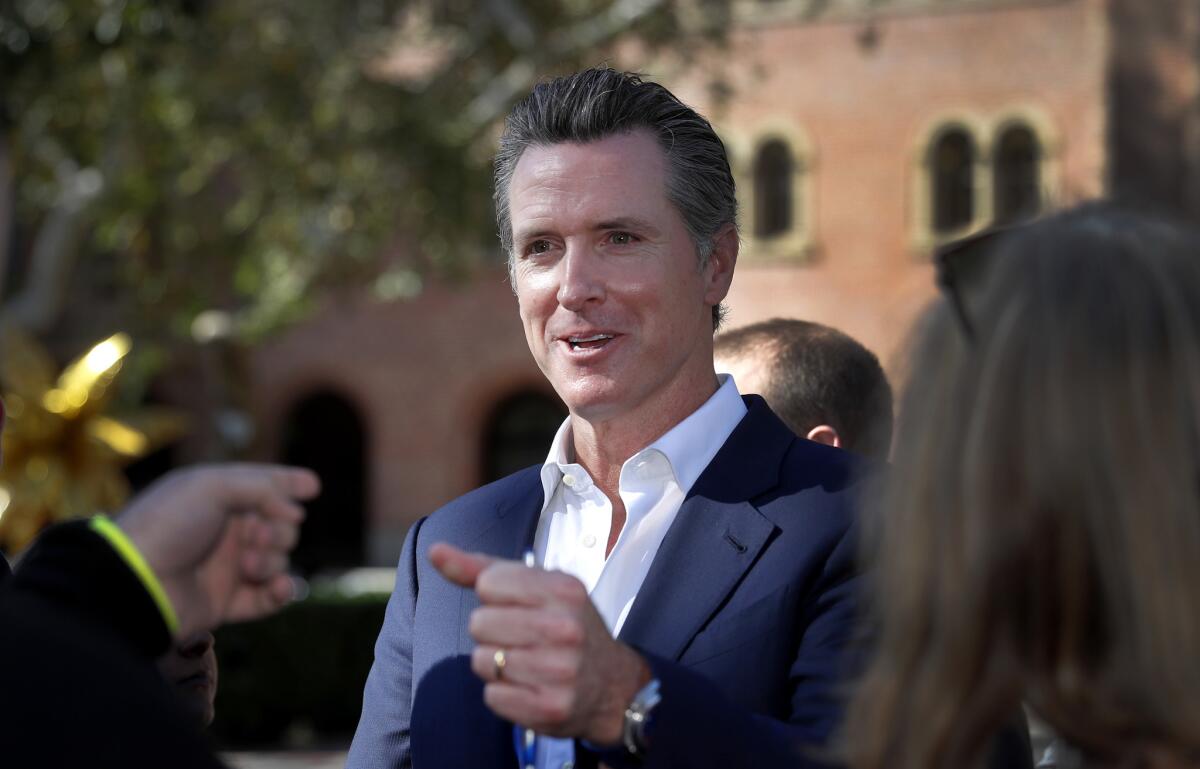
The Sierra Club endorsed Lt. Gov. Gavin Newsom in the race for California governor, with officials in the established environmental group praising the Democrat’s record on climate change and clean energy.
“He has a proven record for leading on environmental protection, public health and clean energy,” Kathryn Phillips, director of Sierra Club California, said in a statement released by the Newsom campaign. “He understands that we are feeling the effects of climate change and that California must reduce carbon emissions and reach 100% renewable energy to achieve our climate goals.”
Phillips said the Sierra Club’s extensive network of volunteers will campaign for Newsom as the June 5 primary approaches. Sierra Club executive director Michael Brune also praised the Democrat, saying he will protect California from “Donald Trump’s attacks on our clean air and water.”
The Sierra Club joins a series of other influential groups in California that have backed Newsom.
The California Medical Assn., the powerful state doctors lobby, announced its endorsement of Newsom on Thursday. The California Nurses Assn. and the Service Employees International Union, one of the most powerful labor unions in the state, also support Newsom.
Newsom is the race’s front-runner in polls and fundraising.
A poll released earlier this month by the nonpartisan Public Policy Institute of California found that 26% of likely voters backed Newsom. John Cox, a Republican from Rancho Santa Fe, was favored by 15% of likely voters and former Los Angeles Mayor Antonio Villaraigosa, a Democrat, by 13%.
- Share via
California’s GOP House members are taking their challengers more seriously and the numbers show it
For much of last year, consultants and campaign managers for some of California’s most vulnerable Republican incumbents maintained a bullish tone on the prospect that the GOP would hold the House in this year’s midterms.
The National Republican Congressional Committee insisted that longtime Republican incumbents in California had built up reputations as effective champions of local issues that would help them weather a flood of Democratic enthusiasm.
Since then Rep. Ed Royce (R-Fullerton) and Rep. Darrell Issa (R-Vista) have decided not to seek reelection and the NRCC has opened a West Coast headquarters in Orange County.
- Share via
GOP challenger to Rep. Dana Rohrabacher drops out, endorses another Republican opponent
- Share via
California officials say Pentagon has confirmed National Guard funding despite Trump threat

The awkward dance between Gov. Jerry Brown and the federal government over the National Guard jerked back toward discord on Thursday, when Trump said he would refuse to pay for a new deployment of troops — just hours after his administration said otherwise.
And a few hours later, California officials said they had received written confirmation from the Pentagon that the mission would indeed be funded.
Trump had earlier called Brown’s decision to approve 400 troops for a mission focused on combating transnational crime and drug smuggling a “charade” in a tweet. “We need border security and action, not words!” the president wrote.
A spokesman for Brown pointed to a tweet written Wednesday night by Homeland Security Secretary Kirstjen Nielsen, thanking the California governor for his efforts. Trump was meeting on Thursday with Nielsen at his Mar-a-Lago estate not long after his tweet was posted.
A tweet later posted by the California National Guard said that almost three hours after Trump’s comment, the state received “written confirmation from the Pentagon” to fund the mission as outlined by Brown the day before.
“In short, nothing has changed today,” said a subsequent Guard tweet.
Brown was the last of the nation’s border governors to respond to Trump’s insistence earlier this month that National Guard troops were needed to assist with immigration-related duties at the U.S.-Mexico border. And he has consistently refused to allow California troops to engage in any mission related to federal immigration law.
“This will not be a mission to build a new wall,” Brown wrote last week to Nielsen and Defense Secretary James N. Mattis. “It will not be a mission to round up women and children or detain people escaping violence and seeking a better life.”
Exactly what the California operations will cost remains unclear, as state officials have said it will depend on decisions made once the mission begins. The funds would not be transferred to the state, but instead would be paid directly by the Department of Defense.
Trump has critiqued California several times over the past few days, often writing tweets that embrace the actions by some cities and counties to join his administration’s lawsuit against the state’s sanctuary immigration law. He made similar comments to reporters on Thursday afternoon.
“If you look at what’s happening in California with sanctuary cities — people are really going the opposite way,” Trump said. “They don’t want sanctuary cities. There’s a little bit of a revolution going on in California.”
2:26 p.m.:This article was updated with additional information from the California National Guard and with remarks from Trump.
This article was originally published at 9:51 a.m.
- Share via
Gay ‘conversion therapy’ services would be banned under measure advancing in California
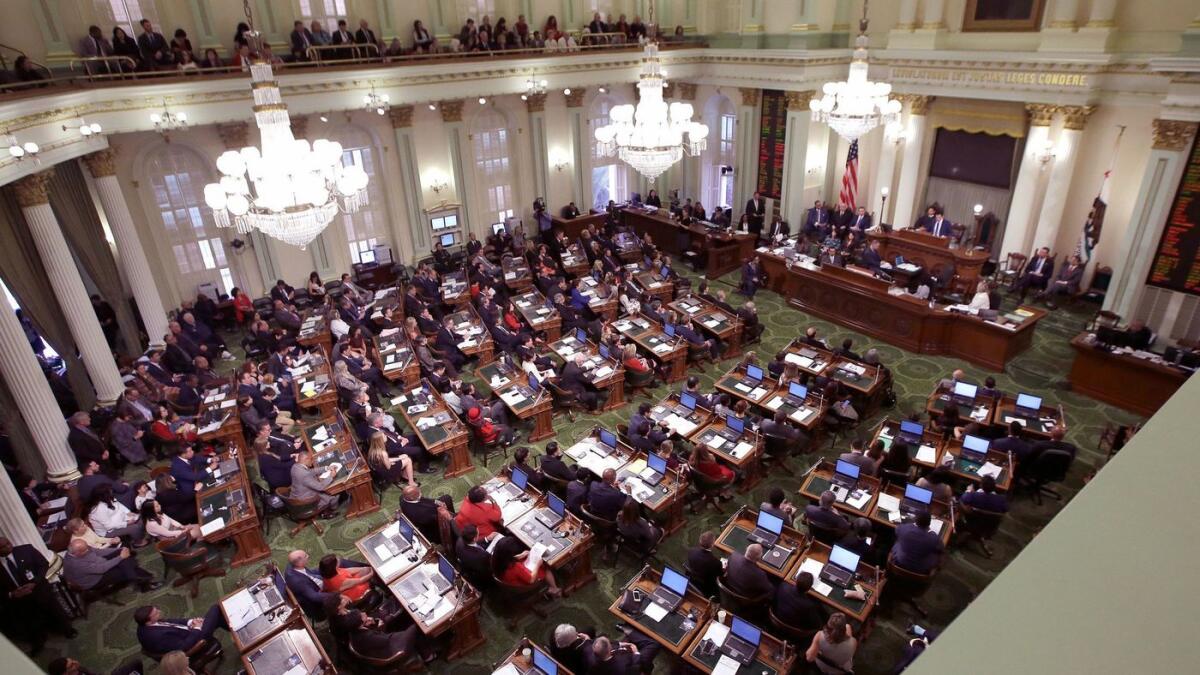
The California Assembly voted Thursday to add gay “conversion therapy” to the state’s list of deceptive business practices, following a debate that focused on the personal experiences of several lawmakers and hinted at potential lawsuits to come.
“It is harmful and it is unnecessary,” Assemblyman Evan Low (D-Campbell), the bill’s author and one of the Legislature’s most vocal LGBTQ members, said of the practice.
Low, who told Assembly members that he explored conversion therapy as a teenager and suffered depression over his sexual orientation, insisted that the bill would be limited to efforts that involve the exchange of money.
“There’s nothing wrong with me,” he said in an emotional speech on the Assembly floor. “There’s nothing that needs to be changed.”
The bill, which now heads to the Senate, has become the focal point of intense debate on social media. Some religious groups have said that such a law would be a violation of their constitutional rights, while advocates insist the provisions are narrow and there’s no credible evidence that the services work.
One key part of the debate centers on whether Assembly Bill 2943 would stretch beyond businesses that charge for these programs and extend to printed documents, even Bibles. An analysis by the Assembly Judiciary Committee says the bill would apply only to services that purport to change a person’s sexual orientation and offered “on a commercial basis, as well as the advertising and offering of such services.”
Lawmakers who spoke in support of AB 2943 also made clear that they believe those kinds of services have been discredited. “This is fraudulent, it should not be occurring,” said Assemblywoman Susan Eggman (D-Stockton). “But you can still try to pray the gay away, if you like.”
Assemblyman James Gallagher (R-Yuba City), who said the bill addresses a difficult issue, nonetheless said that it’s important to ensure laws don’t tamper with religious freedom.
“We have to think about the legitimate experience of people who have gone through conversion therapy and said this was a good thing for them,” Gallagher told his colleagues.
California law already bans the use of conversion therapy by mental health professionals on those under age 18. Low’s bill would expand the state’s efforts beyond minors. It would join a list of commercial activities deemed “unfair or deceptive acts or practices” and therefore banned under state law.
- Share via
Gavin Newsom gets backing from doctors group, despite differences over single-payer healthcare
California’s doctors are siding with Gavin Newsom in the governor’s race, even though they don’t see eye-to-eye on a defining issue of the campaign: single-payer healthcare.
The California Medical Assn., the state doctors lobby and a political heavyweight, announced its endorsement of the lieutenant governor on Thursday.
“Gavin is a lifelong champion for health care in California, and we know he will continue to fight for pragmatic solutions to our most crucial health care challenges, including working to achieve universal access and tackling our state’s physician shortage,” CMA President Theodore M. Mazer said in a statement.
Newsom has made his support for state-financed healthcare a centerpiece of his campaign, and he earned the early backing of the most ardent single-payer supporters, the state nurses union.
The doctors, meanwhile, oppose the nurses’ bill, SB 562, which emerged as a flashpoint in the healthcare debate last year. The CMA said the bill “would dismantle the healthcare marketplace and destabilize California’s economy.”
Newsom has said SB 562 should advance in the Legislature, but also said it has “open-ended” issues that still need to be addressed.
The doctors group is also battling with another prominent Newsom endorser, the Service Employees International Union, over a new measure that would impose price caps on an array of medical services paid for by commercial health insurers in the state. The SEIU is a leading sponsor of the proposal; the doctors fiercely oppose it.
Newsom and the physicians group have a history of political alignment. Newsom was the first statewide official to support Proposition 56, a 2016 tobacco tax pushed by the CMA that raised revenue in part to increase money for doctors who saw Medi-Cal patients. That year, the association also endorsed two initiatives championed by Newsom: Proposition 63, which imposed new gun control measures, and Proposition 64, which legalized recreational marijuana.
- Share via
Independent committee backing Antonio Villaraigosa for governor hits the airwaves with first ad
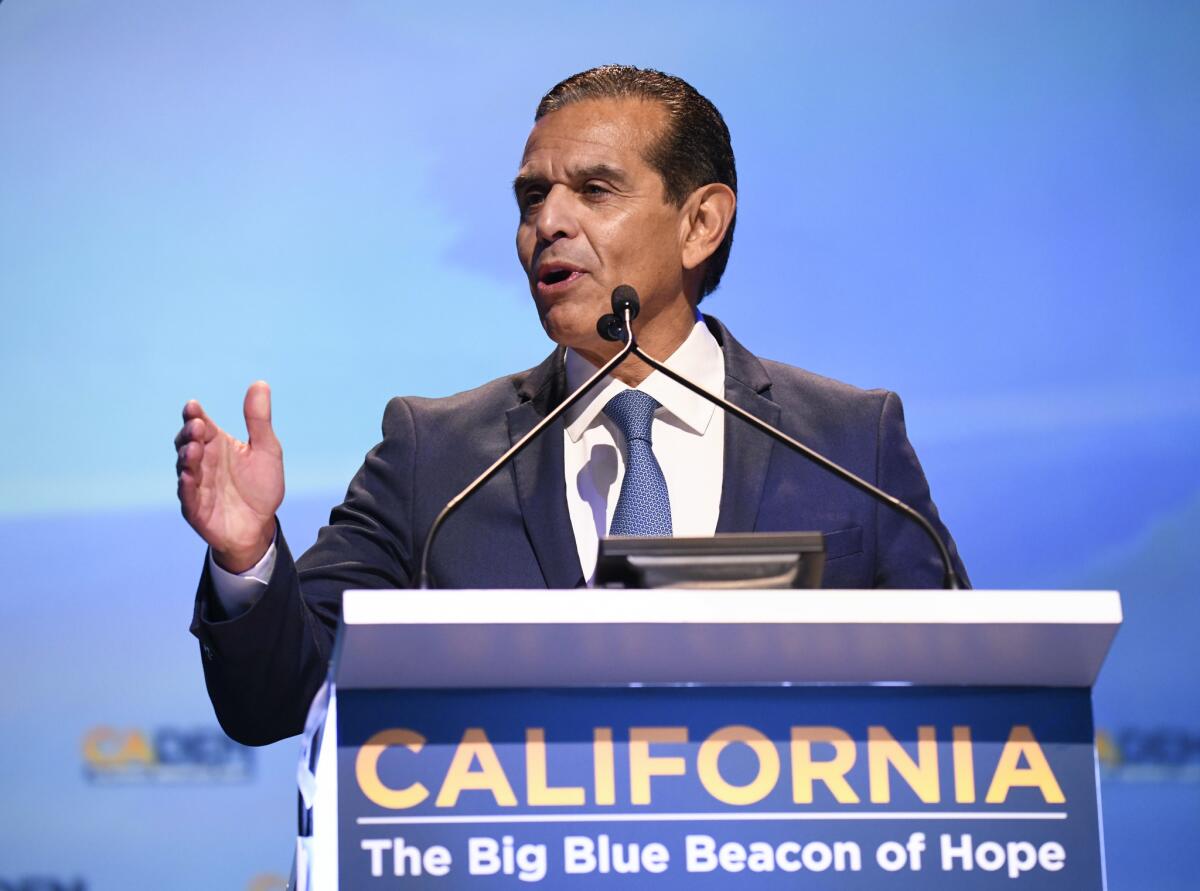
A well-financed independent committee backing Antonio Villaraigosa’s bid to be California’s next governor released its first television ad Thursday, praising his record for working with Republicans and as a candidate for “all of California.”
The ad, which is to air statewide on broadcast and cable stations, is focused on Villaraigosa’s record as Assembly speaker and mayor of Los Angeles, including on education and a drop in crime while he was at City Hall.
“To move California forward, we need to help more Californians get ahead,” the ad says. “That’s why Antonio Villaraigosa brought both parties together to balance the state budget with record investments in public schools and new career training programs.”
The independent expenditure committee behind the ad campaign, Families & Teachers for Antonio Villaraigosa for Governor 2018, is sponsored by the California Charter Schools Assn. Advocates, according to the California secretary of state’s office.
The committee is spending “seven figures” per week on the ad buy, said Josh Pulliam, a political consultant for the committee.
As mayor of Los Angeles, Villaraigosa clashed with teachers unions, starting with his failed attempt to take political control of the Los Angeles Unified School District. His fight with those unions continued after he left office in 2013.
Money has poured into the committee this month from wealthy charter schools supporters: Reed Hastings, chief executive of Netflix, donated $7 million, and Los Angeles billionaire and philanthropist Eli Broad donated $1.5 million. On Wednesday, former Los Angeles Mayor Richard Riordan donated $1 million.
The independent expenditure committee is expected to provide a boost to Villaraigosa’s campaign. Democratic front-runner Lt. Gov. Gavin Newsom has a major advantage in fundraising over all other candidates in the race and has received the backing of the California Teachers Assn. and other education unions.
A recent Public Policy Institute of California poll also showed Villaraigosa lagging in third place in the race, trailing Newsom and Republican businessman John Cox. The candidates who finish in the top two in the June 5 primary will advance to the November general election, regardless of their party affiliation.
- Share via
Gov. Jerry Brown says Trump administration will fund his National Guard mission — without immigration duties
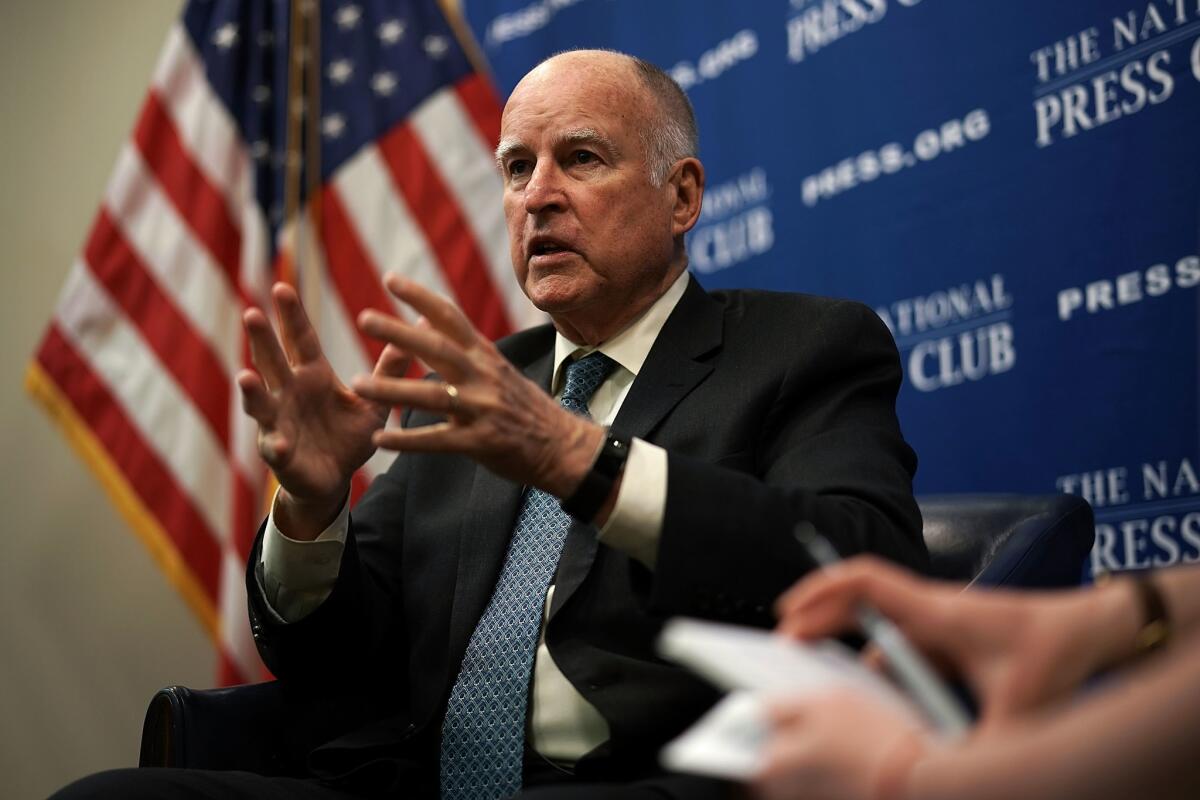
Gov. Jerry Brown formally mobilized 400 California National Guard members Wednesday for transnational crime-fighting duties, thus preventing any effort by President Trump to have the troops focus on immigration enforcement on the Mexican border.
The governor announced that federal officials have agreed to fund the plan he announced last week — a mission to “combat criminal gangs, human traffickers and illegal firearm and drug smugglers” in locations around California, including near the border. The order Brown signed makes clear that the troops will not be allowed to perform a broader set of duties as envisioned by Trump’s recent comments.
“California National Guard service members shall not engage in any direct law enforcement role nor enforce immigration laws, arrest people for immigration law violations, guard people taken into custody for alleged immigration violations, or support immigration law enforcement activities,” the order read.
The cost of the mission, a spokesman for Brown said, will be paid directly by the federal government. No initial estimate has been made, as the exact amount will depend on exactly how the troops will be used.
Though the duties of California Guard members were outlined last week, the state had been waiting for an agreement by federal officials to pay for the operations. Since that time, the president has taken Brown and the state to task over its decision to avoid any immigration-related duties at the border. On Wednesday morning, Trump tweeted, “Jerry Brown is trying to back out of the National Guard at the Border, but the people of the State are not happy. Want Security & Safety NOW!”
“Looks like Jerry Brown and California are not looking for safety and security along their very porous Border. He cannot come to terms for the National Guard to patrol and protect the Border,” Trump tweeted Tuesday.
There was no immediate reaction from the White House to Brown’s announcement.
On Tuesday, Brown told reporters in Washington that his plan was consistent with a safer border. “That sounds to me like fighting crime,” the governor said. “Trying to catch some desperate mothers and children, or unaccompanied minors coming from Central America, that sounds like something else.”
The order Brown issued Wednesday after returning from a brief trip to talk climate change in Toronto and to speak to a national trade union and visit with reporters in Washington is set to expire at the end of September. It specifically says no Guard service member may participate in a mission that would “exceed the mission scope and limitations” related to transnational crime activity. It also says troops cannot help build “any new border barrier.”
5:27 p.m.: This article was updated with information related to the cost of the Guard mission and Brown’s trip to Washington.
This article was originally published at 5:13 p.m.
- Share via
California bill aims to end practice that keeps workplace misconduct cases out of court
A California bill would prohibit employers from requiring workers to use private arbitration to settle disputes, a practice that critics say shields improper workplace conduct from public view.
The bill by Assemblywoman Lorena Gonzalez Fletcher (D-San Diego) would bar businesses from making employees, when they are hired, waive their future rights to take any harassment, discrimination or other claims to court.
“Arbitration can be a highly effective dispute resolution method when both parties can choose it freely, when both parties are equal,” Gonzalez Fletcher said at a news conference on Wednesday. “It is far less successful when the more powerful party forces the other to accept those terms, especially as a condition of employment.”
Forced arbitration has come under increasing scrutiny since the #MeToo movement, with high-profile figures such as former Fox News anchor Gretchen Carlson pointing to the practice as shielding workplace abusers from public disclosure because arbitration resolutions often include nondisclosure agreements. Last year, a bipartisan bill was introduced in Congress to end mandatory arbitration in employment agreements.
Gonzalez Fletcher said she was pursuing an unusual tool to draw attention to the issue — a subpoena issued by the Legislature to compel testimony from a worker bound by a nondisclosure agreement as a result of arbitration. The Legislature has subpoena power but it is rarely used. The bill’s sponsors believe lawmakers last issued a subpoena in 2001 while investigating price manipulation by Enron.
Gonzalez Fletcher said she has requested Assembly Speaker Anthony Rendon (D-Lakewood) to issue the subpoena to require Tara Zoumer, who sued the company WeWork in 2016 for overtime pay, to testify before the Assembly Judiciary Committee next week.
Zoumer’s suit was moved to arbitration and resolved. She is now subject to a nondisclosure agreement and could face a financial penalty for speaking publicly about her case.
A spokesman for Rendon said the subpoena request is under consideration.
Business groups oppose the bill, AB 3080. The California Chamber of Commerce has dubbed it a “job biller,” claiming it would dramatically increase legal costs for businesses.
“Banning such agreements benefits the trial attorneys, not the employer or employee,” the group said.
The bill must first advance from the Assembly Labor Committee on Wednesday.
- Share via
At least 240 House lawmakers want a vote on immigration. California supporters say they aren’t ready to force one
Rep. Jeff Denham says at least 240 of the 430 current House members have signed onto his resolution to hold votes on four immigration bills, and he hopes House Speaker Paul D. Ryan (R-Wis.) and President Trump are paying attention to the show of support.
But, the Republican from Turlock and his allies said Wednesday that they are not yet willing to commit to forcing Ryan’s hand through a little-used procedural move called a discharge petition; they acknowledged there’s no guarantee that all of 47 Republicans and 193 Democrats House co-signers will back them up if they try to force the issue.
“I’m sure that it is something that will be discussed in the coming weeks. You should not need a discharge petition. When you can show the overwhelming majority of the House, the support of it, you should not need a discharge petition, but it is something we would talk about in the future,” Denham said. “It is far too early to talk about next steps.”
Ryan said last week that he opposes Denham’s effort, saying it’s a waste of time for the House to vote on bills the president might veto.
Denham’s resolution would prompt debate and votes on four very different immigration bills: one favored by the Trump administration, one preferred by Democrats, one bipartisan proposal and another immigration bill of Ryan’s choice. Whichever got the most votes would move forward to the Senate.
All four bills would help Dreamers to differing degrees and include varying levels of border security or immigration enforcement. For example, the Trump-backed bill would also dramatically reduce legal immigration, while the Democrats’ would only deal with legal status for Dreamers.
Democrats say they don’t expect the show of support will sway Ryan. Congressional Hispanic Caucus Chairwoman Rep. Michelle Lujan Grisham (D-N.M.) said Tuesday night she expects Ryan will have to be forced into allowing a vote.
“It doesn’t matter how many signatures we get. We could have every signature, technically, except his, on the floor of the House and... if he doesn’t want to, it doesn’t happen,” Lujan Grisham (D-N.M.) said.
Rep. Pete Aguilar (D-Redlands), who gathered the Democratic co-sponsors for Denham, also wouldn’t give a deadline for House leaders to act, but said the co-sponsors are only willing to wait “weeks not months.”
“We do want to give them an opportunity to bring up the rule and to use whatever process they want,” Aguilar said. “They do have options, but I think they need to understand that we have options too.”
- Share via
DCCC elevates Democrat Gil Cisneros in hopes of uniting Democrats to flip Rep. Ed Royce’s seat
National Democrats are inching closer to weighing in on the race to replace retiring Rep. Ed Royce (R-Fullerton).
The Democratic Congressional Campaign Committee on Wednesday added Gil Cisneros, a Democrat running for the Orange County seat, to its national “Red to Blue” program, which highlights particularly strong campaigns in crucial districts.
The only other California Democrat on the Red to Blue list is T.J. Cox, running against Rep. David Valadao (R-Hanford).
DCCC chairman New Mexico Rep. Ben Ray Lujan lauded Cisneros’ status as a Navy veteran who is involved in education policy and called his campaign “formidable.”
The move is the latest signal that national Democrats are trying to get activists on the ground to pick a single candidate who can get through California’s tricky top-two primary, which advances the top two vote-getters, regardless of party. With six Democrats and seven Republicans on the ballot in June, national Democrats have long feared conditions will be so unpredictable they could be shut out of a crucial pickup opportunity.
This led national and state party leaders to privately pressure some of the Democrats to drop out of the race ahead of the candidate filing deadline last month.
A Democratic insider said Cisneros has consistently led in several private polls taken in the district.
The announcement does not amount to an official endorsement but could give Cisneros access to the organizational and fundraising support from the committee. It also opens up the possibility that the DCCC could spend funds before the primary to support Cisneros or attack one of his fellow Democrats, a tactic that was met with fierce criticism when the party used it in a Texas Democratic primary.
The contest in Royce’s district is ranked No. 1 on The Times’ list of the most competitive California House races.
- Share via
Billionaire Democratic activist Tom Steyer endorses Kevin de León in his insurgent bid against Sen. Dianne Feinstein
Billionaire Democratic activist Tom Steyer is endorsing state Sen. Kevin de León in his insurgent challenge to Sen. Dianne Feinstein, and did not rule out funding an outside effort to boost De León’s chances.
“I think he’s the kind of young progressive that reflects California and would be a very strong advocate for our state nationally,” Steyer said in an interview on Tuesday, pointing to De León’s efforts on issues such as immigration, climate change and gun control while he was the state Senate leader. “I know him well and he’s a friend. We share a lot of values.”
Steyer, who flirted with running for the Senate seat, did not criticize Feinstein as he has in the past.
“Sen. Feinstein has been an outstanding public servant who has dedicated the bulk of her adult life to the service of our state and the country,” he said. “These are two strong, very good Democrats. I just believe Kevin is the true progressive and he reflects something we need representing California going forward. I have nothing bad to say about Dianne Feinstein. I have a lot of good to say about Kevin de León.”
De León faces enormous odds as he tries to oust Feinstein, who has served in the Senate for a quarter-century, is well known to the state’s voters and has daunting leads in polls and fundraising.
But De León has gained notable endorsements, most recently from the 2.1-million-member California Labor Federation last week.
Campaign finance reports released this week show that Feinstein has more than $10 million in the bank, while De León has just more than $670,000.
Feinstein, a multimillionaire and one of the wealthiest members of the Senate, has already lent her campaign $5 million and could easily write another check.
But Steyer, a billionaire former hedge fund manager, could write a larger one.
He is among the largest Democratic donors in the nation and has already committed more than $50 million to push for the impeachment of President Trump and to register young voters.
He was noncommittal when asked if he would fund an independent expenditure group on behalf of De León.
“I don’t have any concrete plans for that,” he said.
- Share via
California’s largest pension fund sends next year’s invoice to state government: $6.3 billion
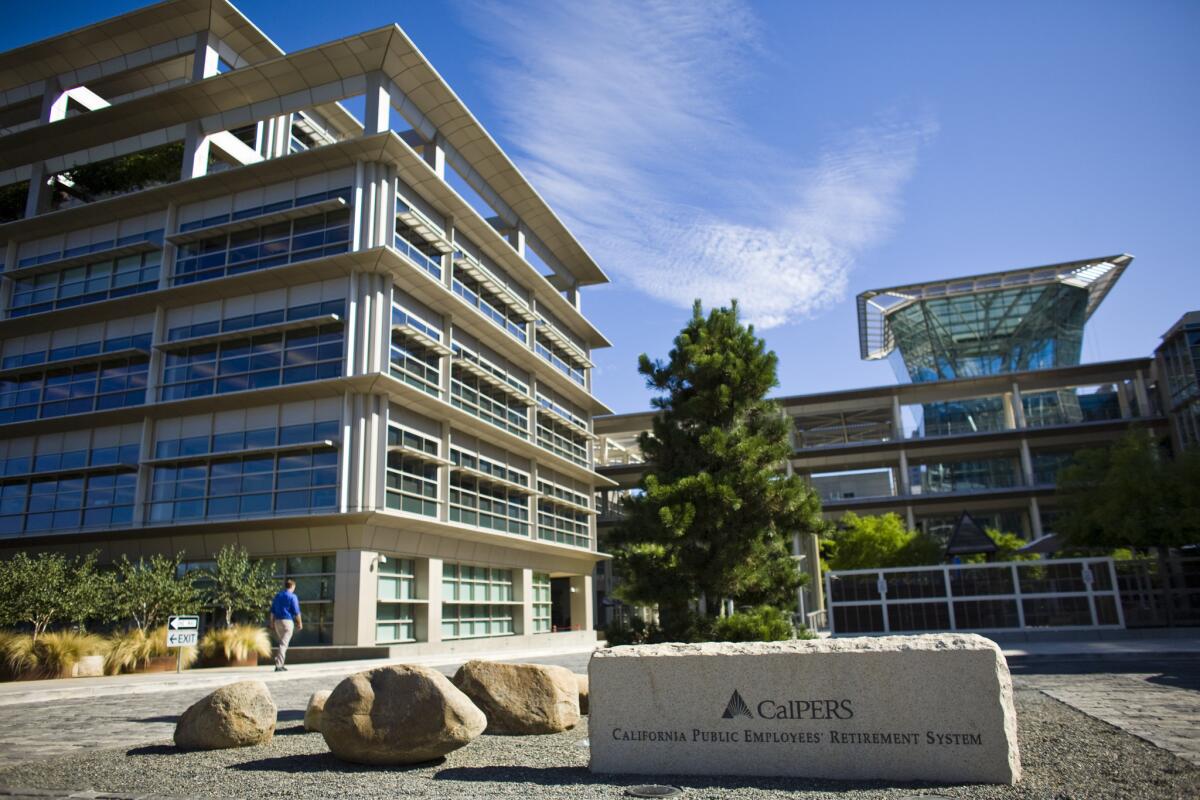
As part of a shift toward less optimistic expectations for investment returns to pay for government worker pensions, board members of the California Public Employees Retirement System voted Tuesday to require an almost $6.3-billion payment from the state budget in the fiscal year that begins on July 1.
The action, which could receive final approval on Wednesday, reflects a gradually higher annual contribution to public employee pensions by the state and from local governments across California. In 2016, CalPERS approved a half-percentage point decrease in its official estimate of the long-term investment return on its $353.3-billion portfolio. That shift was designed to happen over several years, in hopes it would lessen the financial shock of shifting more of the costs onto government employers. The highest costs are also, in part, a reflection of increases in the size of the state’s payroll.
The state’s CalPERS payment will be about $450 million more than the total paid in the current fiscal year and more than double what it was only a decade ago.
CalPERS board members voted on Tuesday’s staff proposal with little discussion, save for a question about the increase in contributions also required from workers hired after a pension overhaul that took effect in June.
“It seems like it will be a ding on people’s salaries,” said Theresa Taylor, the chairwoman of CalPERS’ finance committee and a member of SEIU Local 1000, the union that represents some 96,000 state employees.
The $6.299-billion payment required from California’s state government must now be factored into the budget crafted by the Legislature and signed into law by Gov. Jerry Brown in late June. Brown had already assumed a similarly sized payment in his budget proposal unveiled in January.
In February, a coalition representing city governments warned about the effects of rising pension costs under the expectations of less money from Wall Street investments. The report issued by the League of California Cities projected an average increase of more than 50% in annual pension payments made by the state’s largest cities over the next seven years.
A CalPERS staff report notes that the net return on all of the fund’s investments for the fiscal year that ended in July was 11.2%. But expectations on profits over the next 30 years remain significantly more modest, and there’s long been a robust debate about how to properly set those future expectations. The lower the rate of projected investment return, the larger the share of pension costs that must be covered by taxpayers and some employees. Overall, CalPERS officials believe the system has assets to cover 71% of its long-term obligations.
- Share via
California warns legal pot sellers not to participate in unlicensed 4/20 events

The state issued a warning Tuesday that businesses holding licenses to sell marijuana could face penalties if they participate in unlicensed temporary events away from their stores, including on Friday, April 20, which has become an annual celebration for counterculture groups.
The warning was issued ahead of 4/20 by the state Bureau of Cannabis Control. Since Jan. 1, the bureau has issued more than 700 state licenses to sell marijuana for medical or recreational use.
The bureau has issued 47 temporary event licenses to groups that are limited to holding the marijuana celebrations on county fairgrounds that have authorized such events with city approval.
“Any bureau licensee participating in an unlicensed cannabis event may be subject to disciplinary action,” the warning said, adding that “lawful participation by bureau licensees in any temporary cannabis event that allows sales and/or consumption is dependent upon issuance of the appropriate licenses from the bureau.”
While many Californians have been issued medical approval to sell or use marijuana, the law does not allow them to participate in unlicensed events, also referred to as “Proposition 215 events” after the ballot measure that legalized medical pot two decades ago in the state.
“Participation in such events may lead to civil penalties for unlicensed commercial cannabis activity,” the warning said.
Meanwhile, a survey of some 1,000 marijuana users that was released Tuesday by the firm LendEDU found that the average 4/20 participant plans to spend $71 on marijuana to celebrate the unofficial holiday, and about 35% of respondents are planning to take off work Friday.
- Share via
California police groups shift position on officer discipline records, now consider support for making some of them public

Some major law enforcement groups signaled Tuesday they are willing to support making part of police officer disciplinary records public, a dramatic departure from their past positions.
Local and national attention on police shootings and misconduct has led law enforcement organizations to reconsider their blanket opposition to proposals that would give public access to some internal disciplinary investigations of officers.
“We’re going to be open to supporting efforts that would allow for some records to be released,” said Ryan Sherman, a lobbyist with the Riverside Sheriff’s Assn.
Debate over secrecy provisions in officer disciplinary files came during a legislative hearing on Senate Bill 1421 from Sen. Nancy Skinner (D-Berkeley). Skinner’s bill, which advanced out of the Senate Public Safety Committee on Tuesday, would require public disclosure of all internal officer shooting investigations and confirmed cases of sexual assault and lying while on duty.
Currently, all police discipline information is confidential outside of a courtroom in California, which has some of the nation’s strictest standards against public disclosure.
“Unfortunately, the fact that we have such strict restrictions on any access to public records has affected certain communities’ trust towards our law enforcement,” Skinner said during the hearing.
Prior to Skinner’s effort, other have tried to loosen these rules, some of which date back 40 years. Most recently in 2016, a bid by then-Sen. Mark Leno (D-San Francisco) failed in a Senate committee. In debate two years ago, no major law enforcement groups indicated they would accept changes to state laws that would make individual internal investigations public, saying they were essential to protect officer privacy and safety.
But Tuesday, Sherman and other lobbyists including those representing the state’s largest police labor organization, signaled they might be willing to entertain changes. They said they were negotiating with Skinner on the bill’s details.
Law enforcement groups still have major concerns about SB 1421 as written. Ed Fishman, an attorney for the Police Officers Research Assn., told legislators that the bill would wrongfully expose police officers who acted within departmental policy to invasions of their privacy.
“It has unintended consequences that are extreme and will hurt the public,” Fishman said.
Tuesday’s hearing featured testimony from many who have had relatives killed by police officers in recent years advocating for the bill. Senators on the Public Safety Committee also gave public rebukes to law enforcement lobbyists, criticizing them for a lack of diversity and insensitivity to concerns raised by communities of color.
“I think that you are completely and utterly out of touch with the realities of how those you are representing are perceived by major segments of California,” said Sen. Holly Mitchell (D-Los Angeles). “You are not going to be able to continue to lobby your way out of it.”
The bill faces at least one more committee hearing in the Senate before reaching the floor. It will have to pass both houses of the Legislature by the end of August.
- Share via
Newest member of the California Assembly arrives ready to work on criminal justice issues
Two weeks after winning a Los Angeles special election, the newest member of the California Assembly says she hopes to focus on reforms to the state’s criminal justice system during her time in Sacramento.
Assemblywoman Sydney Kamlager-Dove (D-Los Angeles) took the oath of office on Monday, filling one of three vacant seats representing Los Angeles County in the lower house. The Democrat, a former community college trustee and legislative staffer, thanked her mentors in remarks from the Assembly rostrum.
“So many women, and in my life so many black women, have paid in giving me the kind of morals and integrity and grit that is required to fight on behalf of people that you know, and people that you don’t know,” she said.
Kamlager-Dove won handily on April 3, receiving 70% of the votes cast in the 54th Assembly District which encompasses communities west of downtown Los Angeles, from Crenshaw to Culver City and as far north as Westwood. She will serve the remaining eight months of the term of former Assemblyman Sebastian Ridley-Thomas, who resigned last year citing health concerns.
She has said she hopes to focus her attention on poverty issues and on reform of the state’s criminal justice system.
“I think we have an opportunity to really push the needle in terms of how we look at rehabilitation, how we look at incarceration, and how we look at changing the lives oftentimes of poor men and women of color,” Kamalager-Dove said on Monday in a video released by Assembly Democrats.
- Share via
Survivors of violent crime raise their voices in California to call for a new approach to criminal justice
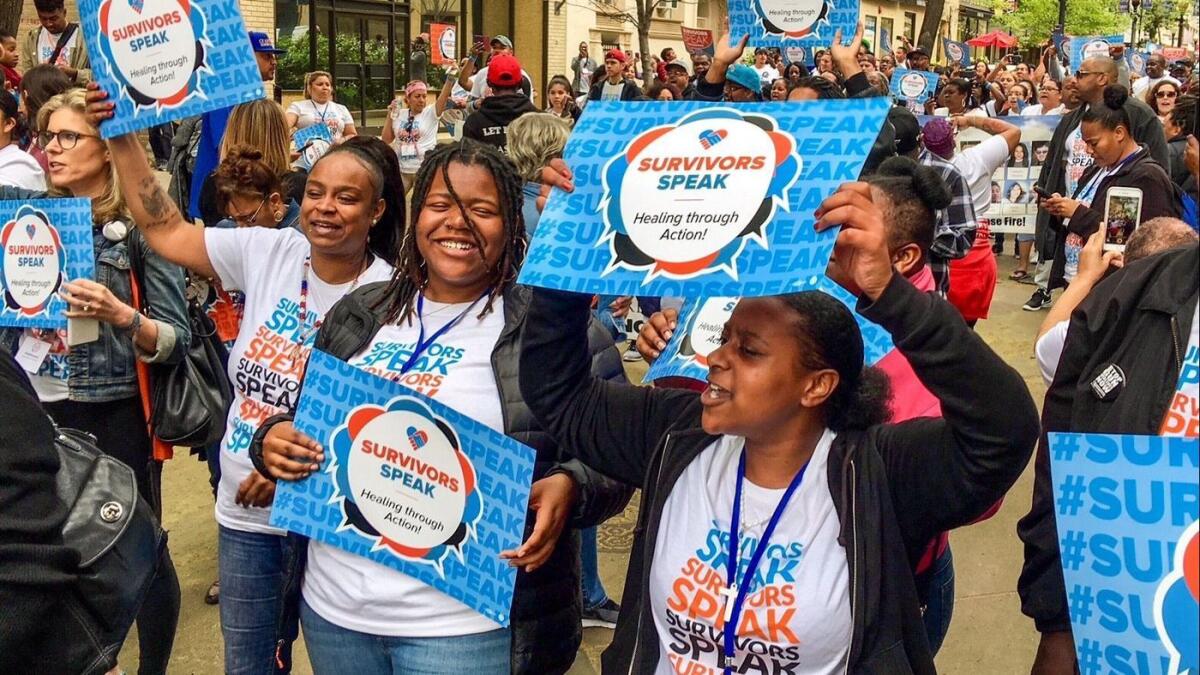
Her father, uncle, a cousin and two older brothers. Those are some of the family members 16-year-old Aaliyah Smith has lost to gun violence. Then there are her friends.
Jermaine Jackson Jr., 27, was shot and killed in 2016 while he painted over graffiti in San Francisco. Toriano “Tito” Adger, 18, was shot there a year later at a bus stop. He called Smith, who was nearby, and warned her to run. She made it inside a library moments before the crack of gunfire.
Last week, Smith was among hundreds who gathered in Sacramento for annual National Crime Victims’ Rights Week events, where calls were issued for a new approach to criminal justice and public safety in California, one that puts survivors at the center of policy. But a debate is brewing over what that entails.
- Share via
Republican group plans to spend millions on TV ads in some California House districts
A group that’s aiming to help Republicans keep control of the House says it plans to spend millions of dollars in several vulnerable California districts.
The D.C.-based Congressional Leadership Fund, which has the blessing of House Republican leaders, says it has reserved TV ad time to support:
• Rep. Jeff Denham (R-Turlock): $2.35 million
• Rep. Steve Knight (R-Palmdale): $2.1 million
• Rep. Mimi Walters (R-Irvine): $2.3 million
The planned ads are part of a $38-million TV budget in 20 districts nationwide, all but one in which Republicans are on the defense.
The group also plans to spend an additional $10 million in digital ads across the country, some of which will support the three, plus Rep. David Valadao (R-Hanford).
As the June 5 primary nears, The Times has ranked the three California races as some of the toughest for the incumbents.
- Share via
California expects $14 billion in tax payments this month

Gov. Jerry Brown’s proposed state budget is built on what taxpayers might find an audacious assumption: almost $14 billion in tax payments in the month of April, an average of $83 million collected per hour on every business day of the month.
Most of that money will come from the taxes Californians pay in advance of Tuesday night’s filing deadline for income tax returns. If history is any guide, the rate of payment could quadruple by week’s end.
While tax rules have shifted some of the payment schedules to other months, April remains a vitally important month to the fiscal health of state government. The state controller’s office reports more than 15% of all personal income tax revenues in 2017 were collected in April. In the recession years of a decade ago, tax revenue predictions were frequently off the mark by hundreds of millions of dollars.
The last two state budgets have seen significant windfalls of personal income tax revenue, thanks in part both to an improving economy and to the continuation of a temporary surcharge on the wealthiest taxpayers — extended by voters in 2016. In the budget plan he sent to lawmakers in January, Brown projected a $6.1-billion windfall and proposed using a sizable amount to top off California’s rainy-day fund ahead of schedule.
The independent Legislative Analyst’s Office reports that through the end of last week, the month’s income tax tally stood at $3 billion, slightly ahead of projections. By the end of the current week, a single day’s total could be almost that large.
Lawmakers began reviewing the governor’s $190.3-billion spending plan during the winter, but few decisions are made until they get a look at April’s tax revenues. The governor will release a revised plan based on the new data next month; lawmakers are required to send him a completed budget no later than June 15.
- Share via
Feinstein war chest tops $10 million while Kevin de Leon struggles to keep pace
Sen. Dianne Feinstein widened her already-massive fundraising advantage in the run-up to June’s primary, raising twice as much in the first quarter than her strongest Senate challenger has sitting in the bank.
Feinstein raised $1.3 million between January and March, bringing her war chest to just over $10 million as California’s U.S. Senate race begins in earnest, according Federal Election Commission reports.
Former state Senate leader Kevin De León, the best known of the more than 30 people who will appear with Feinstein on the June primary ballot, raised just $575,991 in that same period, bringing his cash on hand to $672,331, according to his quarterly FEC report.
- Share via
Newt Gingrich hits the airwaves to back Republican John Cox for California governor
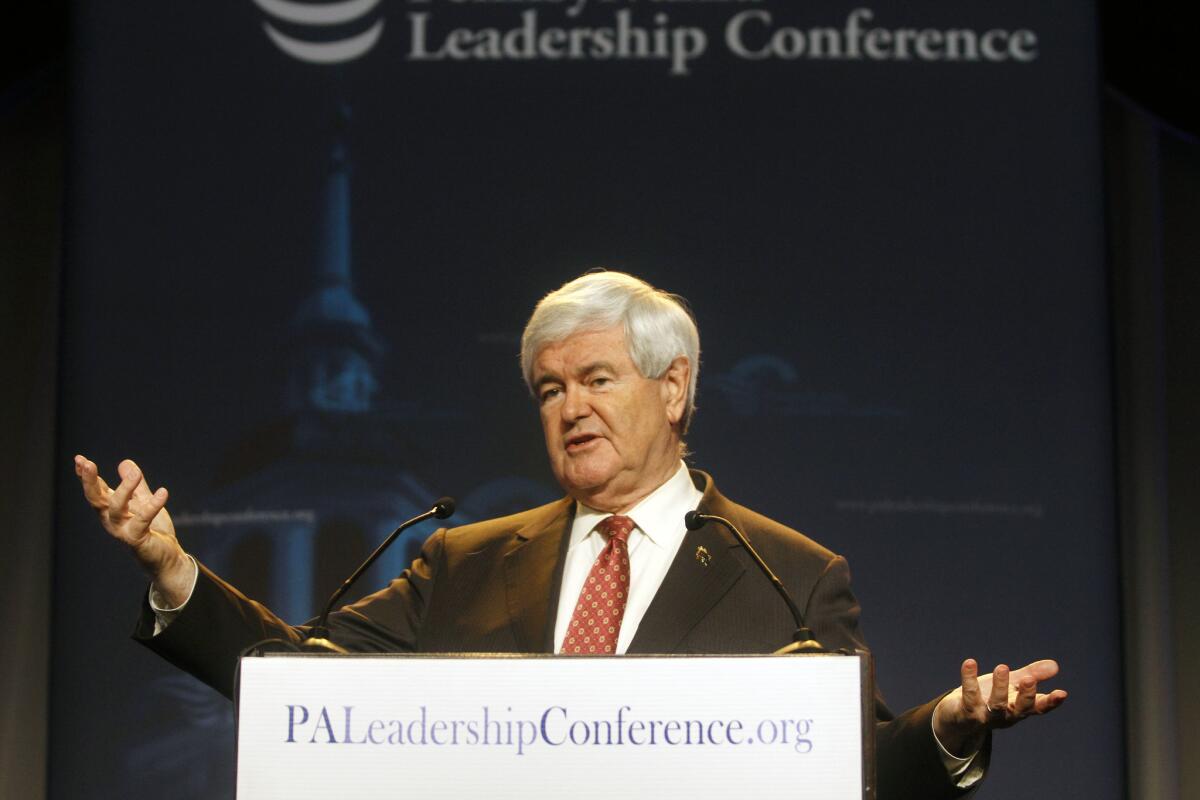
Former Republican House Speaker Newt Gingrich, in a new radio ad by GOP gubernatorial hopeful John Cox, calls the San Diego County businessman a “conservative champion” who is gaining momentum in California’s 2018 race for governor.
Gingrich notes that recent polls show Cox is second place in the race, behind Democratic front-runner Lt. Gov. Gavin Newsom, calling it evidence that the Republican candidate is leading a conservative resurgence in California.
“Why? Because they agree with John Cox on the two most pressing issues facing Californians — repealing Jerry Brown’s “sanctuary state” and his $52-billion gas tax increase,” Gingrich says in the ad.
Gingrich endorsed Cox in March.
The Cox campaign is spending $100,000 a week to air radio ads statewide, according to Cox spokesman Matt Shupe.
Cox, a wealthy Rancho Santa Fe businessman, is one of two prominent Republican candidates. Cox has poured $4 million into his campaign, giving him a major fundraising edge over his GOP rival, Assemblyman Travis Allen of Huntington Beach.
California has a top-two system, meaning if the Republicans don’t place first or second in the June 5 primary, there will not be a GOP gubernatorial candidate on the ballot in the November general election.
- Share via
‘Trump has met his match,’ says Gov. Jerry Brown in promoting climate action on a quick trip to Canada
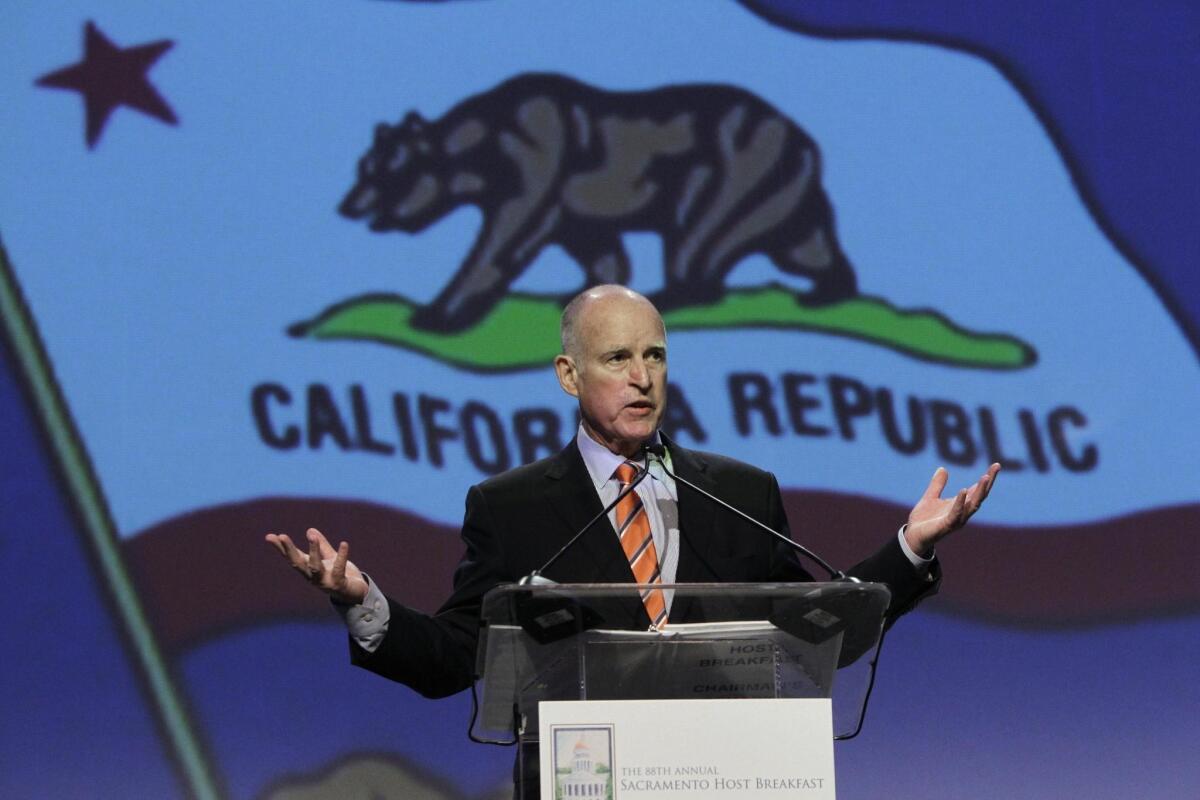
Gov. Jerry Brown told a Canadian audience Monday that he believes President Trump’s efforts to reverse course on climate change policy are a “momentary deviation” as others in the United States seek limits on greenhouse gas emissions.
“That’s very temporary, I can assure you,” Brown said at a joint event in Toronto with Ontario Premier Kathleen Wynne.
The governor’s quick international trip, announced only late last week, comes as Wynne’s Liberal Party faces a stiff challenge in June’s election from the Progressive Conservative Party of Ontario and its leader, Doug Ford. Critics of Wynne’s party have called for Ontario to pull out of the Western Climate Initiative, a cooperative agreement between three Canadian provinces and California on efforts to limit greenhouse gases.
Brown sought to link the efforts of Canadian conservatives with Republicans in the United States who oppose existing climate change programs. In contrast, he told the audience, several GOP lawmakers voted last summer to renew California’s cap-and-trade program.
”I would say to the conservatives of Canada, wake up and see what your friends in California are doing,” he said.
The Democrat took particular notice of Trump’s efforts to shift away from climate change policies from the administration of former President Obama, as well as a push by the Environmental Protection Agency to cancel California’s strict limits on automobile emissions.
“If Trump tries to change that, we’ll have litigation well beyond his term in office,” Brown said while also noting Chinese government efforts to produce more low-emissions vehicles. “Between California and China, Trump has met his match. What he’s saying is not going to happen.”
Many of the governor’s remarks, though, were aimed at the tough political situation in which Wynne finds herself with seven weeks to go before Ontario’s parliamentary elections.
“Dangers abound, but success is right in our hands,” Brown said. “So don’t blow it!”
- Share via
California voters are getting to know the state’s attorney general through his aggressive stance challenging Trump
Less than two months from his first statewide election, California Atty. Gen. Xavier Becerra has become adept not only at challenging President Trump but at using the bully pulpit of his office to raise his profile with voters.
The aggressive effort may help boost the former Los Angeles congressman’s chances at winning a full term in office this fall, almost two years after he was appointed to replace Sen. Kamala Harris in 2017.
Appointed by Gov. Jerry Brown, Becerra took office as attorney general four days after Trump’s inauguration. That’s afforded him an opportunity to get in front of Californians — and potential voters — on an array of issues including immigration, healthcare and the environment.
- Share via
Gov. Jerry Brown forms commission for 2020 census outreach
In an effort to make sure California has a strong showing in the next national census, Gov. Jerry Brown on Friday established a state commission to prepare outreach for the decennial count.
“It is vitally important for California to do everything it can to ensure that every Californian is counted in the upcoming census,” Brown said in a prepared statement.
The commission’s formation comes on the heels of a Trump administration plan to ask about citizenship status as a part of the census. State officials fear that such a question, which has not been asked in a census since 1950, could chill participation among California residents.
That could result in the state losing billions of dollars in federal funds and a seat in Congress.
The 23-member panel, appointed largely by Brown as well as picks by legislative leaders, comes from private- and public-sector backgrounds, including civil rights groups, religious institutions and educational institutions.
- Share via
Garcetti kicks off Iowa visit with 2020 on his mind and a hardhat on his head
- Share via
Asm. Rocky Chávez takes the lead in race to replace Issa, while Doug Applegate slips
A new poll shows that Republican Assemblyman Rocky Chávez has taken a clear lead over 15 other candidates running to replace Rep. Darrell Issa in Congress and has overtaken Democrat Doug Applegate, the previous frontrunner.
In a SurveyUSA poll by 10News and The San Diego Union-Tribune, Chávez, R-Oceanside, has support of 16 percent of likely voters, putting him ahead of Applegate, a lawyer, who was favored by 12 percent of voters and is in second place.
The top two vote-getters in June, regardless of party, will proceed to a November runoff election. Competing with Applegate for the No. 2 spot is Democrat Mike Levin, also a lawyer, with support of 9 percent of voters. Several other candidates were right at his heels. Democratic Businessman Paul Kerr and Board of Equalization Member Diane Harkey, R-Dana Point, were tied for fourth at 8 percent each.
- Share via
Gavin Newsom, Kevin de León scoop up labor endorsement
- Share via
Pro-Kevin de León group launches ad castigating Dianne Feinstein
A group that is supporting Kevin de León’s bid for the U.S. Senate launched a blistering ad against Sen. Dianne Feinstein on Thursday, questioning her progressive principles and tying her to President Trump.
The ad buy from A Progressive California is minuscule — $10,000 to air it in Los Angeles for one day on CNN and MSNBC during programming such as “The Rachel Maddow Show,” “Hardball with Chris Matthews” and “Anderson Cooper 360.”
The minute-long ad features news clips about Feinstein not getting the California Democratic Party endorsement earlier this year, as well as footage of Feinstein saying that Trump can be a good president and appearing to share a laugh with Trump.
That moment actually came during a White House meeting in the aftermath of the Parkland, Fla., school shooting when the president suggested an assault weapons ban should be included in a bipartisan bill to expand gun background checks.
It also features extensive clips of de León’s speech at the state party’s convention.
De León, who just ended his final term as leader of the state Senate, announced last year he would run against fellow Democrat Feinstein as she seeks her fifth full term.
Feinstein’s longtime political advisor dismissed the ad, noting the size of the buy.
“It’s not really a buy,” said Bill Carrick. “Ten thousand dollars in cable in L.A. Poof, it’s gone.”
Still, he said he planned to have the campaign’s lawyers review the ad to see if it violates campaign law that limits what outside groups like A Progressive California can do. Such groups cannot coordinate with campaigns or candidates, and are limited in how much their messages can support a candidate.
Ann Ravel, the former chair of the Federal Election Commission and the California Fair Political Practices Commission, said if the ad was in a state race, she is certain that the state commission would open an investigation into potential coordination with de León’s campaign because of the messaging and the types of footage in the ad. But the bipartisan federal commission can’t agree on how to enforce the federal regulations, she said.
“The problem is [outside groups] understand that given the lack of very strong enforcement at the federal level, there’s the ability to stretch the law,” she said.
A spokeswoman for the FEC declined to comment.
Dave Jacobson, a spokesman for A Progressive California, disputed the suggestion that the ad violated campaign law.
“This frivolous allegation shows that Sen. Feinstein is afraid of the public seeing an ad which showcases her own words, that ‘Donald Trump can be a good president,’” he said.
- Share via
Dispute over money emerges in campaign to repeal California’s gas tax increase

A proposed initiative to repeal hikes to California’s gas tax has been caught in the middle of a dispute involving Republican rivals in the governor’s race.
Assemblyman Travis Allen, a Republican candidate for governor, decided in January to drop plans for his own initiative and said he would urge supporters to sign a separate petition being supported by several Republican members of Congress. Then last week, the committee Allen formed to finance his ballot measure reported a $300,000 contribution from PISF Inc., a Novato, Calif., real estate firm.
Now, an organizer of the still active “Give Voters a Voice” committee is urging the Allen committee to “immediately donate their funds” in support of the ongoing signature gathering efforts.
“There is only one gas tax repeal measure currently in circulation and that is the measure sponsored by the Give Voters a Voice Committee,” said Dave Gilliard, a consultant to the group.
PISF Inc., he said, “gave to repeal taxes and there is only one committee that can do that.”
Allen rejected the request, noting that the active initiative drive is co-chaired by wealthy businessman John Cox, a Republican also running for governor whose campaign has donated $250,000 to the initiative drive.
“I would be doing the gas-tax-repeal contributors a huge disservice if I was to transfer any funds to a campaign committee involving John Cox,” Allen said. “John Cox has spent millions of dollars campaigning for office and he has lost every single time.” Cox ran unsuccessfully for three offices in Illinois before he moved to California.
Allen said he will use the donations received by his ballot measure committee to campaign for approval of the gas tax initiative if it makes the November ballot, including a get-out-the vote effort.
“With this generous contribution, our coalition is stronger than ever and we will absolutely ensure that all Californians know that they will now have an opportunity to repeal Jerry Brown’s gas tax,” he said.
- Share via
A change to California’s housing supply law could spur a big expansion in home building
A Bay Area lawmaker’s housing proposal could expand the size and scope of home building efforts in California at an unprecedented scale.
The legislation, Senate Bill 828, from state Sen. Scott Wiener (D-San Francisco), would require cities and counties to rezone land in their communities to permit many more homes than are currently in their plans.
Under the bill, local governments could have to double the amount of land made available for condominium and apartment complexes, and zone even more parcels for residential development in an effort to address a shortage of homes in the state that Wiener has estimated stands at 4 million.
- Share via
Another Democrat drops out of race against Rohrabacher, backs fellow challenger Harley Rouda
- Share via
Poll: Newsom still holds a solid lead in the governor’s race, and Cox remains in second place
Lt. Gov. Gavin Newsom remains the clear front-runner in California’s race for governor, with businessman John Cox and former Los Angeles Mayor Antonio Villaraigosa vying for second place, according to a new poll from the nonpartisan Public Policy Institute of California.
The survey, released Wednesday, found that 26% of likely voters backed Newsom, a Democrat and former mayor of San Francisco.
Only the top two finishers in the June 5 primary will advance to the November election, regardless of their party affiliation.
Cox, a Republican from Rancho Santa Fe, was favored by 15% of likely voters and Villaraigosa, a Democrat, by 13%. The narrow difference between the two candidates is within the poll’s margin of error.
Among the remaining candidates: Assemblyman Travis Allen (R-Huntington Beach) was supported by 10% of likely voters; state Treasurer John Chiang, a Democrat, by 7%; and former state schools chief Delaine Eastin, a Democrat, by 6%.
The results of the PPIC poll were very similar to those in a survey the organization released in March.
- Share via
California parents fear school shootings but don’t want to arm teachers, survey finds
Two months after a gunman killed 17 people at a Florida high school, a new survey finds that most California parents are concerned about the threat of school shootings but that a large majority opposes allowing more teachers and school officials to carry guns on campus.
The statewide survey, released Wednesday, was conducted by the Public Policy Institute of California after a string of school shootings, including a Feb. 14 massacre at Marjory Stoneman Douglas High School in Parkland, Fla.
“In the wake of the Florida mass shooting tragedy, many California public school parents are concerned about school safety,” said Mark Baldassare, president and chief executive of PPIC. “Yet most oppose having more teachers carry guns.”
Survey takers were asked how concerned they are about “the threat of a mass shooting in your local school.”
The survey found 73% of California adults and 82% of public school parents say they are very or somewhat concerned. While 55% of Democrats said they are very concerned, only 24% of Republicans have that level of worry, according to the survey.
The survey found that 68% of Latinos and 57% of African Americans are very concerned, while that alarm level is felt by 49% of Asian Americans and 34% of whites.
Proposals have been made in other states to allow teachers and school officials to carry guns on campuses as a deterrent and protective measure against attacks by firearms.
The California survey found that 67% of adults and 68% of public school parents oppose allowing more teachers and school officials to carry guns at schools. There is more opposition in California than the nation as a whole. A recent CBS News poll found that 50% of adults nationwide oppose arming school officials.
The responses in California differ widely based on political affiliation. Some 86% of Democrats oppose arming school officials, but 60% of Republicans favor the idea.
Last year, the governor signed into law a measure that eliminates the power of school district administrators to give non-security school employees with concealed weapon permits permission to have firearms on K-12 campuses.
California lawmakers are currently considering a bill that would assign armed law enforcement officers to all school campuses at state expense.
- Share via
Netflix CEO Reed Hastings donates $7 million to pro-Villaraigosa group
Reed Hastings, the chief executive of Netflix and a wealthy supporter of charter schools, donated $7 million on Wednesday to an independent expenditure group supporting Antonio Villaraigosa’s candidacy for governor.
The move is not surprising — Villaraigosa made waves taking on teachers unions as the mayor of Los Angeles, despite his roots as a labor organizer.
Villaraigosa is the most prominent Democrat in California to challenge the teachers unions, a fight he has continued since leaving the mayor’s office in 2013.
Hastings’ donation was made to Families & Teachers for Antonio Villaraigosa for Governor 2018, a group sponsored by the California Charter Schools Assn. Advocates, according to the California secretary of state’s office.
The money has the potential to increase Villaraigosa’s viability in the race. His chief rival is Lt. Gov. Gavin Newsom, who has received the backing of the California Teachers Assn. and other education unions.
Hastings was among the earliest contributors to Villaraigosa’s campaign, donating $56,400 in December 2016, according to filings with the state.
- Share via
Facebook will no longer fund campaign opposing proposed California consumer privacy initiative

A representative for Facebook said Wednesday that the company would stop contributing funds to a campaign against a 2018 statewide ballot measure that would require companies to disclose what personal information from Californians they collect, buy or share.
The statement comes after Facebook Chief Executive Mark Zuckerberg underwent a grilling by 44 lawmakers over the social media giant’s role in the 2016 election and its lax privacy protections.
“We took this step in order to focus our efforts on supporting reasonable privacy measures in California,” Facebook spokeswoman Rochelle Nadhiri said.
Alastair Mactaggart, chief proponent of the the California Consumer Privacy Act, applauded the move. In a letter to Zuckerberg last month, he had slammed the company for attempting to sink privacy advocates’ efforts while federal officials had opened an investigation into how a data analytics firm, Cambridge Analytica, accessed the personal data of millions of Facebook users without their knowledge to help elect President Trump.
“Now that they have seen the error of their ways, we hope they will work with us proactively to protect the personal information of all Californians, and support us publicly and financially,” said Mactaggart, chairman of Californians for Consumer Privacy.
But a spokesman for the tech coalition funding the opposition campaign said a Facebook representative had called the ballot measure flawed.
The ballot measure “simply disconnects California,” said Steve Maviglio, who is representing the California Chamber of Commerce, TechNet and the Internet Assn. “It is unworkable and requires the internet in California to operate differently — limiting our choices, hurting our businesses and cutting our connection to the globe.”
Maviglio said the tech coalition plans to make major announcements of new opposition in coming weeks. Facebook, Google, AT&T, Verizon and Comcast have each contributed $200,000 to the opposition campaign.
- Share via
Gov. Jerry Brown agrees to Trump’s National Guard request, but insists it won’t be to enforce immigration
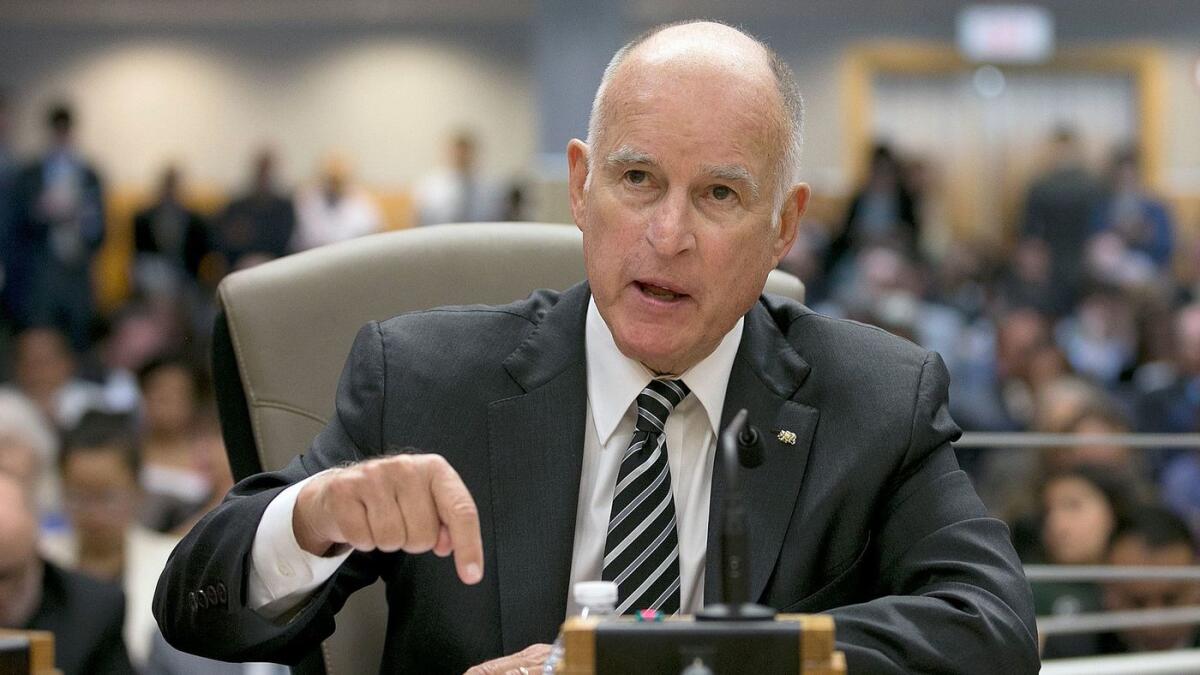
Gov. Jerry Brown agreed on Wednesday to expand the California National Guard’s efforts on crime and drug issues that cross the state’s border with Mexico, but insisted troops would not be used to enforce immigration directives from President Trump.
“This will not be a mission to build a new wall. It will not be a mission to round up women and children or detain people escaping violence and seeking a better life,” Brown wrote in a letter to Homeland Security Secretary Kirstjen Nielsen and Defense Secretary James N. Mattis. “And the California National Guard will not be enforcing federal immigration laws.”
The decision comes one week after the Trump administration asked governors in border states to provide Guard troops for assistance with the duties of Border Patrol agents. On Saturday, Mattis signed an order to send up to 4,000 Guard troops to the border, but barred them from interacting with migrants detained by the Border Patrol in most circumstances. The president later wrote on Twitter that “We are sealing up our Southern Border.”
But Brown suggested a very limited role for the 400 additional California troops, writing to Nielsen and Mattis that support operations would be focused on “targeting transnational criminal gangs, human traffickers and illegal firearm and drug smugglers along the border, the coast and throughout the state.”
A spokesman for Brown said the location and assignment of troops would “be dictated by the needs on the ground.”
And the governor insisted in his letter that Trump’s public pronouncements on border threats were misguided — pointing to statistics that show the number of detained immigrants in California is at its lowest point in nearly 50 years.
“Here are the facts: there is no massive wave of migrants pouring into California,” Brown wrote.
- Share via
Man who accused of threatening to kill Rep. Maxine Waters expected to plead guilty
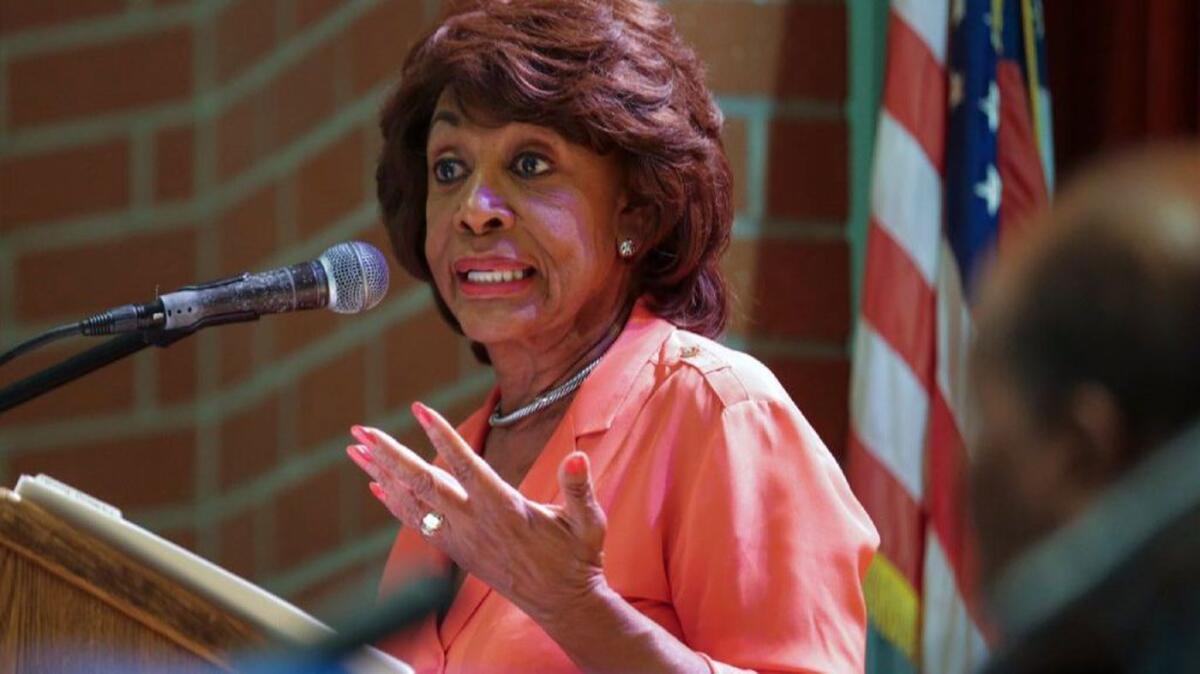
A San Pedro man is expected to plead guilty Wednesday to threatening to kill Rep. Maxine Waters over her criticism of President Trump.
Anthony Scott Lloyd, 45, faces a single count of threatening a United States official, according to a plea agreement filed March 26. It is punishable by up to 10 years in prison and a $250,000 fine.
According to the plea, Lloyd left a voicemail at Waters’ Capitol Hill office Oct. 22 using a racial slur to refer to Waters and an anti-gay slur, and stating that “if you continue to make threats towards the president, you’re going to wind up dead, Maxine, ’cause we’ll kill you.”
Waters’ staff forwarded the voicemail to Capitol Police, who referred it to the FBI.
According to the original complaint, Lloyd told the FBI that he was listening to talk radio and it was a “spur of the moment” decision to call Waters and leave the voicemail. Lloyd also told the FBI he had no intention of actually harming her.
Lloyd is scheduled to enter his plea Monday before U.S. District Judge Stephen V. Wilson in downtown Los Angeles.
- Share via
Garcetti says state money would ‘accelerate’ Los Angeles’ homelessness plan
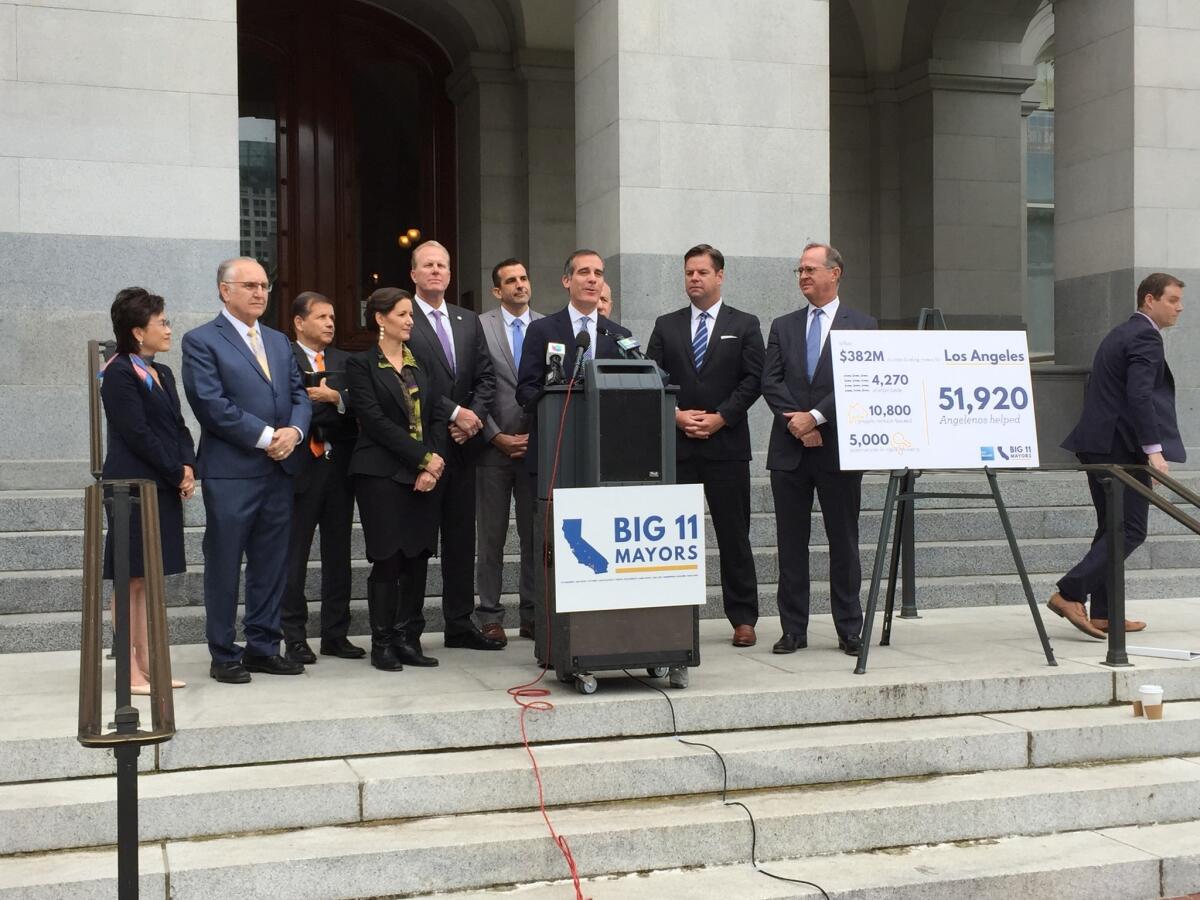
Los Angeles Mayor Eric Garcetti said Wednesday the city needs more money from the state to combat increasing homelessness, even though local voters recently approved ballot measures designed to bring in more than $1 billion in funding to help build new housing and provide supportive services.
Garcetti joined mayors from California’s other large cities at the Capitol to lobby for $1.5 billion in state homelessness funding, money that would come out of the more than $6 billion in a tax revenue windfall Gov. Jerry Brown is projecting in the coming year’s budget.
Although the city is working on using its new local dollars to build permanent homeless housing, state revenue could help with programs that could help people off the streets in the meantime, Garcetti said.
“We need help today from Sacramento,” he said. “We will be moving forward — I release my budget next week — on an immediate plan for shelter. But we can accelerate that and take thousands of people more off the streets if a portion of the surplus that we created comes here from Sacramento back to Los Angeles and to the other cities to immediately be able to have that housing.”
Wednesday’s news conference was the second one in recent months that large-city mayors have held to push for the homelessness dollars.
- Share via
Garcetti: ‘We’re the same as Iowa’
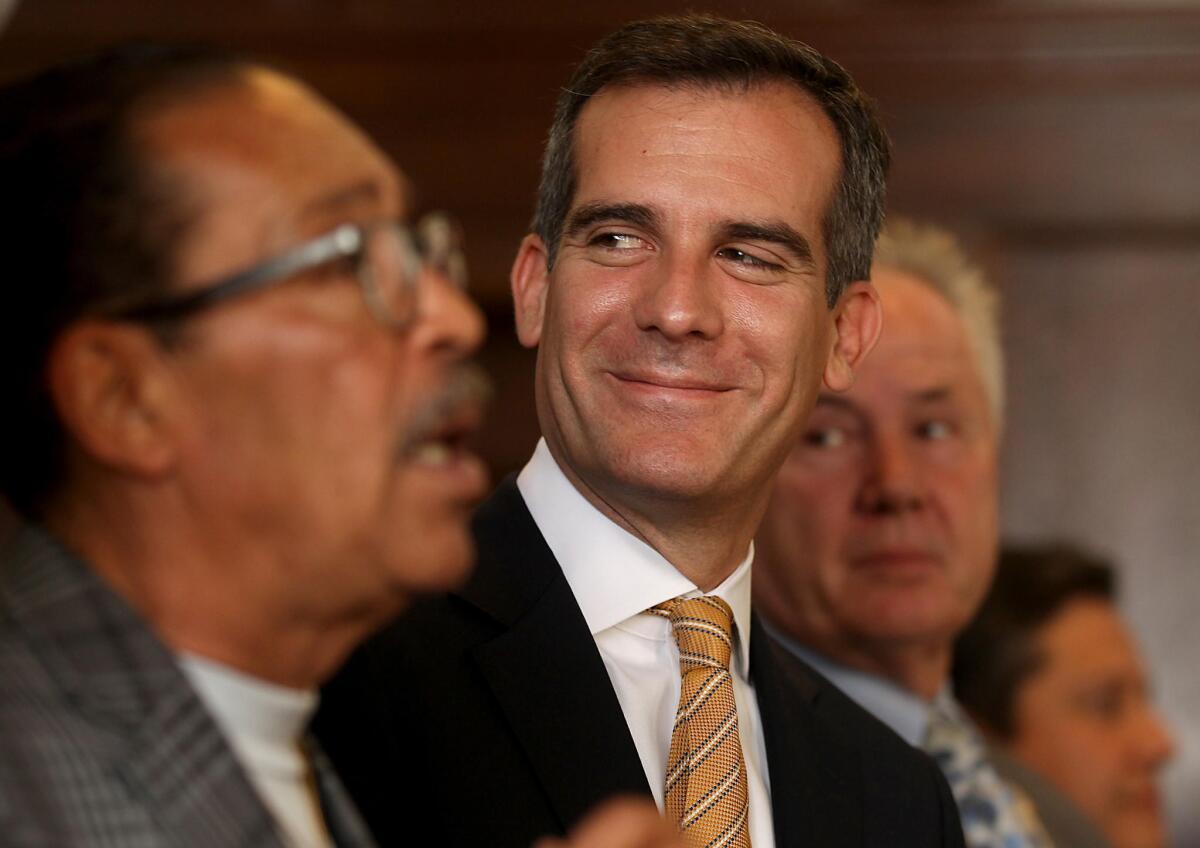
In advance of a trip later this week to the early presidential caucus state of Iowa, Los Angeles Mayor Eric Garcetti wants Iowans to know that they’re not any different from Angelenos.
“We’re the same as Iowa,” Garcetti said before a news conference in Sacramento. “These divisions that there’s the heartland and the coast to me are B.S.”
He went on to lavish compliments on the state. “Los Angeles is the heartland, and Iowa is the cutting edge. They have 31.3% of their power generated by wind, by renewable, the highest in the country,” he said. “They are a manufacturing capital like we are. They’re a farm state; we’re a farm state. I think we struggle with the same things: Will politicians listen to us? Will we have a country that brings us together rather than rips us apart?
“I think people probably imagine, as I’ve said before, that we’re mostly a city full of Kardashians and reality stars,” he said. “Well, we have a reality star leading this country. We’re actually everyday folks who are nurses and bus drivers and factory workers and firefighters, and we need to get back to work. We need a country that is not about driving people apart, but about multiplying our success.”
Garcetti, a Democrat, has said he’s considering a bid for the presidency in 2020.
- Share via
Lawmakers retreat from ‘zero tolerance’ policy for young motorists who use pot
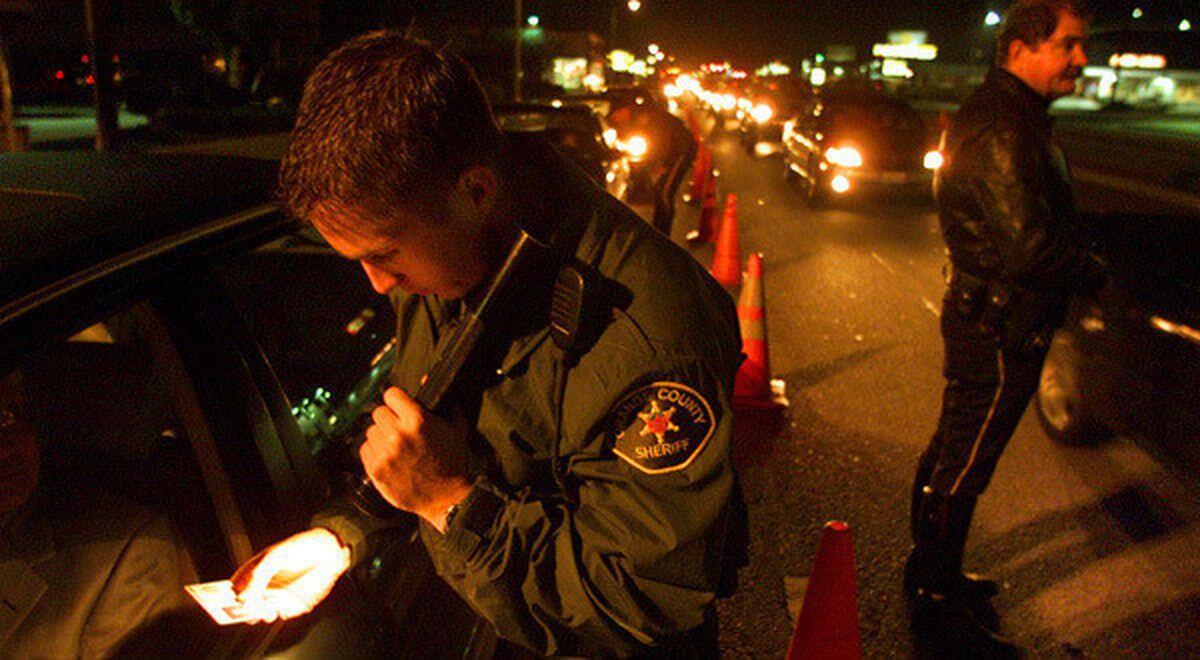
Faced with opposition from drug legalization advocates, California lawmakers backed away Tuesday from a proposal to adopt a “zero tolerance” policy on motorists under age 21 who drive after using marijuana.
A bill by state Sen. Jerry Hill (D-San Mateo) originally proposed a one-year suspension of driver’s licenses for minors caught for the first time driving with measurable amounts of marijuana in their system. Hill had said the state should have the same “zero tolerance” policy for cannabis that it has for those under 21 who drive under the influence of alcohol.
But faced with opposition, Hill agreed on Tuesday that the first offense would result in a warning, and the second offense would add one penalty point to the driver’s record, removable if they take a drug-awareness class. Only the third and subsequent offenses would result in suspension of the driver’s license.
The Senate Public Safety Committee recommended the amended bill with votes withheld by Democratic Sens. Holly Mitchell of Los Angeles and Steven Bradford of Gardena. The two lawmakers shared a concern that minority drivers would be disproportionately targeted by law enforcement.
“I think this is a slippery slope to target people of color,” Bradford said.
Sen. Nancy Skinner (D-Berkeley), the committee’s chairwoman, said she supported making the bill “a little more benign,” adding there is no “zero tolerance” policy for distracted driving, which she said causes more accidents by young people than do drugs.
Opponents included Glenn Backes, a lobbyist for the Drug Policy Alliance, which supported a measure that legalized the sale of marijuana for recreational use starting Jan. 1.
Backes said the oral swab saliva test proposed to determine the presence of delta-9-tetrahydrocannabinol has been known to produce “false positive” results.
“The tests that are being mandated in this bill are unreliable,” Backes told the committee.
The bill was also opposed by Mica Doctoroff, an attorney for the ACLU of California, who said the penalties — including suspensions and fees — are “too onerous,” and also said she is concerned they would disproportionately affect African American and Latino drivers.
“The uneven enforcement of California’s traffic laws on black and Latino drivers is very well established even though there are no documented differences in the driving behaviors of black, Latino and white drivers,” Doctoroff told the senators.
Sen. Joel Anderson (R-Alpine) was the only vote against the bill. He said he is concerned about innocent bystanders being cited after breathing secondhand marijuana smoke.
“I never smoked marijuana, but I went to a reggae concert once,” Anderson said.
Hill said it is unlikely those levels would register in the test.
He said the penalty for drugged driving is necessary, noting that 3.5% of minors killed in traffic accidents in 2013 in California had marijuana in their system, but the number jumped to 15% two years later.
“It shows that there is a problem,” he told his colleagues.
Students from UCLA and North High School in Torrance testified in favor of the bill and said their peers do not realize the danger of being impaired while driving after using marijuana.
The measure also was supported by retired California Highway Patrol Lt. Robert McGrory, whose son, CHP Officer Justin McGrory of Victorville, was killed by an 18-year-old who had been smoking marijuana before he got behind the wheel of his car.
“We have to educate the young,” McGrory told the panel.
- Share via
California Air Resources Board sues Trump administration over repeal of anti-pollution rule
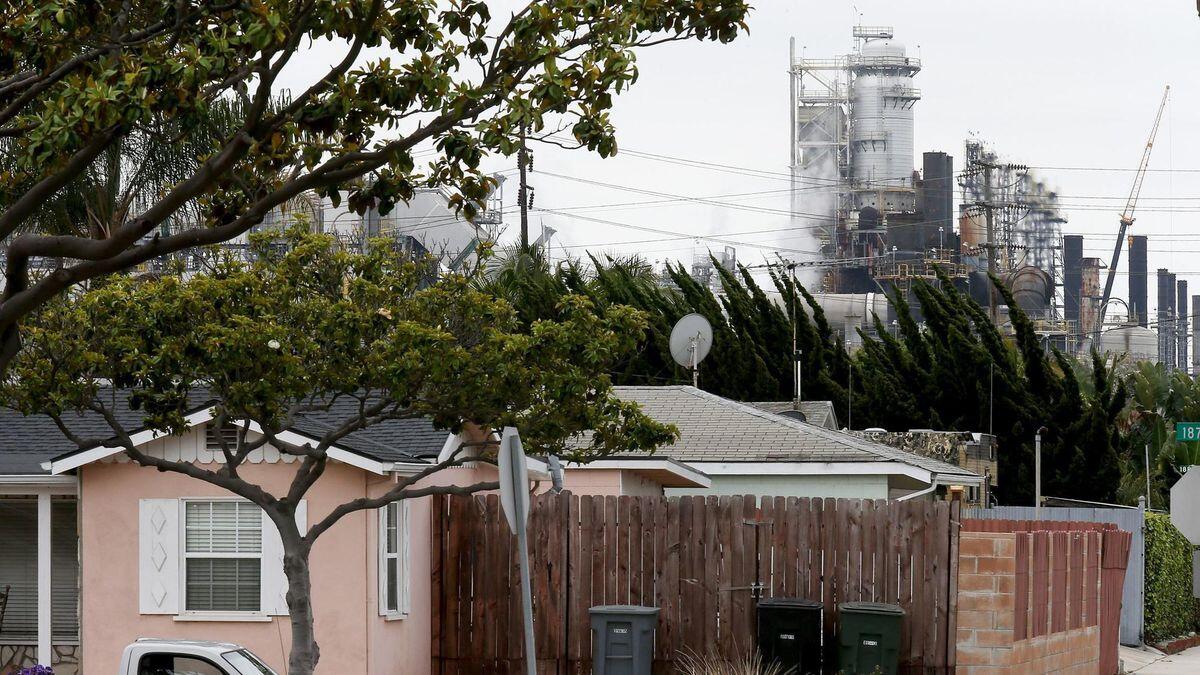
California’s clean-air board and its attorney general have sued the Trump administration to challenge as illegal the repeal of a policy that requires major sources of air pollutants, including oil refineries, to permanently take action to reduce their emissions, officials announced Tuesday.
The lawsuit filed by Atty. Gen. Xavier Becerra and the California Air Resources Board targets a policy change by the U.S. Environmental Protection Agency that would no longer require major polluters to install and operate equipment to permanently minimize the release of hazardous substances.
“Instead of prioritizing the health of hardworking Americans, EPA Administrator Scott Pruitt wants to let major polluters off the hook,” Becerra said in a statement. “That is unconscionable, and it is illegal.”
The lawsuit, filed in the U.S. Court of Appeals for the D.C. Circuit, is the 31st legal challenge undertaken by the Democratic attorney general against the administration of the Republican president, with others targeting Trump policies on immigration, healthcare and and the U.S. census.
Becerra has filed several other environmental lawsuits in the last year, including one to preserve a rule against release of methane from oil and gas operations on public lands. He also sued to challenge a delay in increased penalties for automakers whose vehicles fail to comply with fuel-efficiency standards. Yet another lawsuit challenged as unlawful the EPA’s one-year delay of ozone attainment standards.
- Share via
Labor leader Maria Elena Durazo endorses Antonio Villaraigosa for governor
- Share via
Delaine Eastin calls on rivals in California governor’s race to pledge pay equity and gender parity in hiring
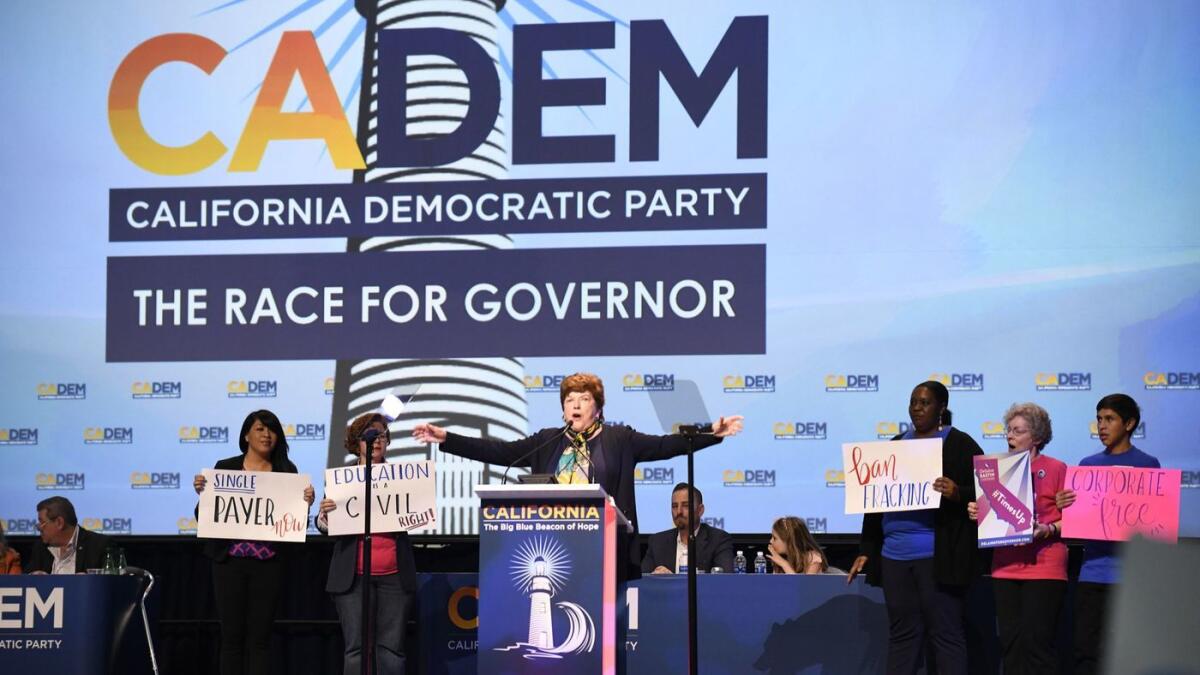
Democratic gubernatorial candidate Delaine Eastin marked Pay Equity Day on Tuesday by challenging her rivals in the race to pledge to hire equal numbers of men and women in their staffs and to pay them equally if elected.
“Several candidates have claimed to be feminists, so they should be more than comfortable making this pledge to gender parity in staffs and leadership, and pay equity for state workers in their administrations — or their claim is mere political grandstanding,” Eastin said in a statement.
The former state schools chief is one of only a handful of women to be elected statewide in California. The state’s voters have never elected a female governor, a glass ceiling Eastin hopes to shatter by campaigning vigorously around the state. But she badly lags behind her Democratic rivals in the polls and in fundraising.
Eastin announced her challenge on Equal Pay Day, which women’s rights advocates use to highlight the gender pay gap. The day marks how far into the year women must work to earn the same as men earned the previous year.
- Share via
Major California housing bill narrowed before its first legislative debate
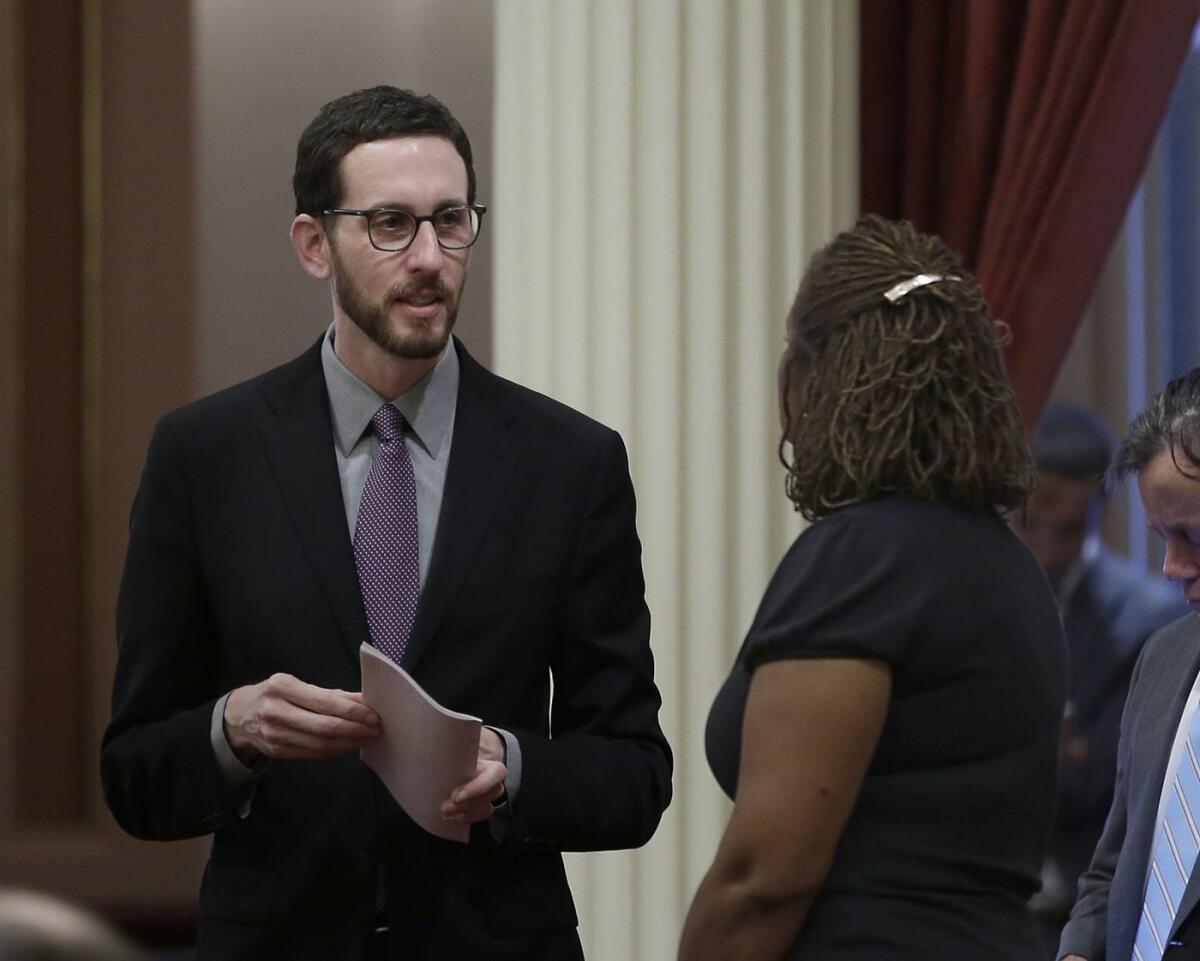
Ahead of its first legislative committee hearing scheduled for next week, a Bay Area lawmaker has narrowed his bill aimed at building more housing near transit across California.
Under the newly amended Senate Bill 827 from Sen. Scott Wiener (D-San Francisco), cities would be allowed to restrict building heights to four or five stories, down from a maximum of eight stories, within a half-mile of rail and ferry stops. Wiener also limited changes surrounding bus stops. The new version of the bill wouldn’t mandate height increases around bus stops, instead allowing for increased density and lower parking requirements. It also would apply only at bus stops with frequent service throughout the day, rather than just during rush hour.
SB 827 tries to address the state’s longstanding shortage of homes and a push by climate regulators to build near mass transit through dramatically changing development rules, particularly in the state’s largest metropolitan areas. Earlier versions of the bill would have affected nearly all of San Francisco and, according to a Times analysis, about 190,000 parcels currently zoned for single-family homes in Los Angeles — roughly half such parcels in the city.
The large swath of Los Angeles affected by the bill depended primarily on the legislation’s definition of bus stops. It was not immediately clear how much smaller the bill’s footprint would be in Los Angeles after the changes.
Major interest groups across the political spectrum already have weighed in on prior versions of the bill. Elected officials in San Francisco and Los Angeles, as well as smaller cities, are opposing SB 827 as an attack on their power. Development and business interests, including a group of tech executives, the California Assn. of Realtors and the California Building Industry Assn., have endorsed it. Environmental groups are split, with the Sierra Club California concerned that the bill might encourage communities to oppose new transit, while other organizations such as the Natural Resources Defense Council are in favor, arguing it helps the state meet its climate change goals.
Last week, 17 experts in the history of housing segregation across the country endorsed the bill, calling it a national model for addressing restrictive zoning practices. But nearly all groups representing low-income Californians and advocates for affordable housing that have taken a position on SB 827 oppose it, citing worries about displacement and gentrification.
Additional changes to the bill made this week try to address those concerns. All projects greater than 10 units will have to set aside a portion for low-income residents. It further restricts the demolition of rent-controlled or formerly rent-controlled properties. And the developers will have to provide monthly recurring transit passes to all residents at no cost.
“We have worked with both supporters and opponents on these amendments, and we will continue to work with anyone committed to solving our housing shortage as we move through the legislative process,” Wiener wrote in a Medium post announcing the changes. “We will bring more housing to our state if we work collectively on solutions.”
SB 827 is scheduled for its first hearing April 17 in the Senate Transportation and Housing Committee, Wiener’s office said.
- Share via
Gov. Jerry Brown endorses Sen. Dianne Feinstein for reelection
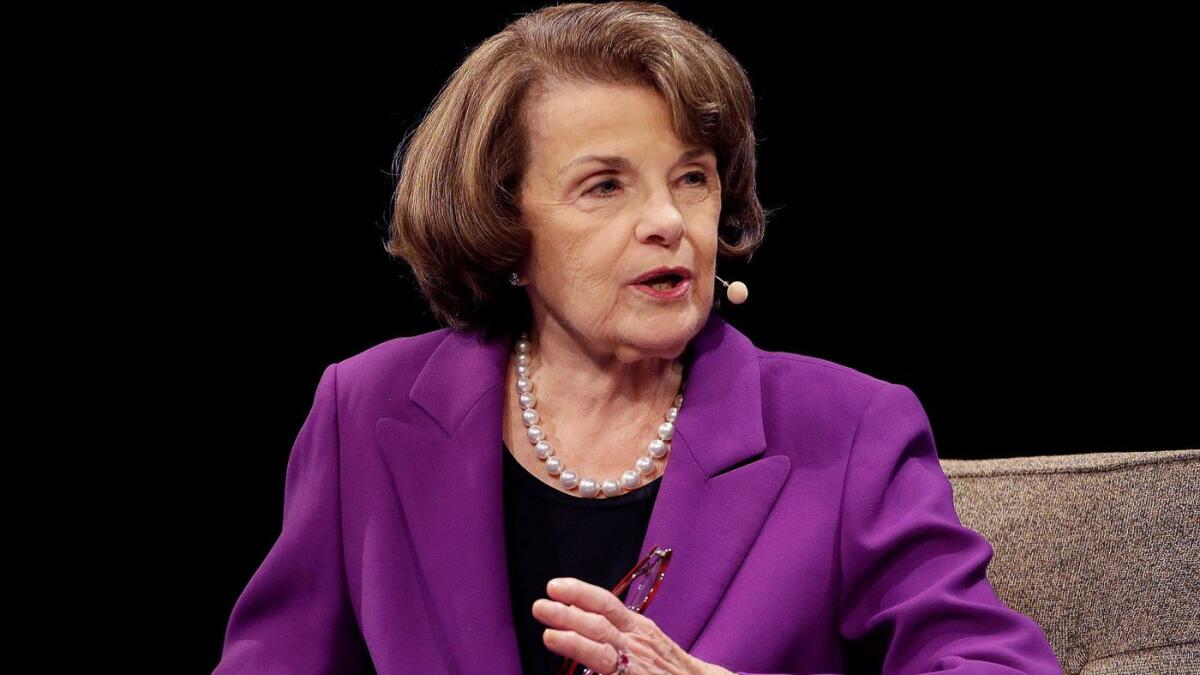
Gov. Jerry Brown on Tuesday endorsed Sen. Dianne Feinstein’s reelection bid.
“More than ever, we need Dianne Feinstein’s steady leadership in the U.S. Senate; she’s exactly the right person to ensure that Trump is held accountable. Dianne will continue to stand up for immigrants and fight to protect our healthcare and the environment,” Brown said in a statement.
The two San Francisco natives have developed a close relationship in the decades since Brown’s father, former Gov. Pat Brown, appointed Feinstein to the California Women’s Board of Terms and Parole. Feinstein officiated at Brown’s 2005 wedding and he has helped her raise cash in the past.
As she seeks her fifth full term, Feinstein’s opponents are trying to capitalize on progressive sentiment that Feinstein is too moderate and willing to compromise with Trump.
- Share via
Sacramento district attorney addresses crime victims amid chants of ‘Stephon Clark’ from protesters
Sacramento Dist. Atty. Anne Marie Schubert was met with boos, applause and chants of “Stephon Clark” Monday at the state Capitol as she joined several law enforcement officials who were honored for their work in public safety at a crime victims rally.
Speaking over the protesters, Schubert did not address Clark’s case or take questions. She pledged only to represent victims and help people get back on track, whether through school or youth intervention programs.
“I will always stand with victims,” she said at the event hosted by Crime Victims United of California. “I will always do what’s right, and I will always follow the facts of the law.”
In the audience, a handful of protesters held a banner with Clark’s photo, shouting, “Clark was a victim” and “Why are you protecting cops?”
Schubert, one of three district attorneys honored by the victims rights’ group, has been under pressure from activists to criminally prosecute police officers Terrence Mercadel and Jared Robinet for shooting and killing Clark, 22, last month outside his grandparents’ home. She also has been under fire for receiving $13,000 in campaign money from two local law enforcement unions.
She has said those donations had been in the works before the shooting.
Anger over Clark’s death has spurred many demonstrations in recent weeks. Protesters have flooded Sacramento City Hall, blocked Interstate 5 and prevented access to the Golden 1 Center during Sacramento Kings games.
Protestors said they were angered to see Schubert honored. Conrad Crump, a friend of Clark’s, said he did not want Clark forgotten from the conversation.
- Share via
California seeks to intervene to defend Obamacare in court

California on Monday jumped into the middle of a legal dispute over the future of the federal Affordable Care Act, seeking to preserve the law that is under assault in the courts by 20 other states.
California Atty. Gen. Xavier Becerra announced he is part of a coalition of 16 attorneys general who have filed a motion to intervene in the lawsuit filed in February by Texas, Wisconsin and other states seeking to overturn the Affordable Care Act, which provides tax credits for coverage and requires coverage for patients with pre-existing conditions.
“It is an irresponsible action,” Becerra said of the Texas lawsuit. “It is a legally unsound action, and it is a dangerous action for millions of Americans who left the bad days of pre-existing conditions and the inability to get care for their children.”
The lawsuit by Texas challenges Obamacare as unconstitutional, arguing that because Congress has set the penalty for going without insurance at zero, it does not count as a tax. A 2012 Supreme Court decision had upheld the law as a tax.
The motion to intervene by California, New York and other states argues that Texas’ lawsuit is legally insufficient and would cause chaos in the healthcare market.
The federal law has resulted in a reduction in the number of uninsured in California from double digits to about 7%, according to Carmela Coyle, president and CEO of the California Hospital Assn., who joined Becerra at a Sacramento press conference to announce the legal action.
“We can’t let the politics in a handful of states risk and erode the gains that we have made here in this state,” Coyle said.
The intervention to oppose the Texas lawsuit also drew support from Gayle Batiste, a nurse at Dignity Northridge Hospital and president of SEIU 121RN, a union representing registered nurses. She said before the Affordable Care Act, many patients waited until their illnesses were serious before seeing a doctor.
“They were waiting to come into the ER because they could not afford the care,” Batiste said during the event.
The states seeking to intervene have received more than half a trillion dollars in federal funding to provide healthcare to their residents under the federal law, with California getting $160 billion of that money, Becerra said.
“It’s our intent to protect the health of California families,” he added, criticizing the Trump administration for what he said was its history of not defending the Affordable Care Act.
- Share via
Super-PAC launched media blitz for congressional candidate Sara Jacobs after her family gave major donation
An influential political committee launched a campaign blitz for Encinitas congressional candidate Sara Jacobs after her grandfather gave it one of the largest contributions it has received this election cycle.
The Women Vote! super-PAC launched a television campaign, digital ads, a website and a series of mailers this week following a $250,000 contribution by Jacobs’ grandfather, Qualcomm co-founder Irwin Jacobs.
Jacobs, 29, is running for the seat held by Rep. Darrell Issa, R-Vista, who is not seeking re-election. Her candidacy has made national news, including a profile in the magazine Cosmopolitan.
- Share via
An ambitious California bill would put the state in charge of controlling prices in the commercial healthcare market
In one of the most aggressive efforts in the nation to curb soaring healthcare spending, a new California measure would put the state in charge of setting prices for hospital stays, doctor’s visits and most other medical services covered by commercial insurers.
The bill, backed by labor unions and consumer groups, is certain to rouse fierce opposition from physicians and hospitals, setting the stage for a brawl between some of the Capitol’s top lobbying heavyweights. Proponents also face friction on the left from advocates of single-payer healthcare, who espouse an alternate vision of how to overhaul the state’s healthcare.
Despite the political hurdles, an effort to rein in prices is tantalizing for policymakers, as healthcare costs gobble up more of state budgets, employers’ bottom lines and workers’ paychecks.
- Share via
California’s special elections are a waste of time and taxpayer money
Want to save tax money? Have more dollars for schools or police? Then stop holding special elections hardly any voters care about.
Unlike many states, California wastes public funds by calling special elections to fill vacant seats in the Legislature.
Few people show up. Local taxpayers are out anywhere from a few hundred thousand dollars to well over a million. But the governor could do it for free and much more quickly.
- Share via
Investigation finds sexual harassment allegations against top California legislative staffer ‘substantiated’
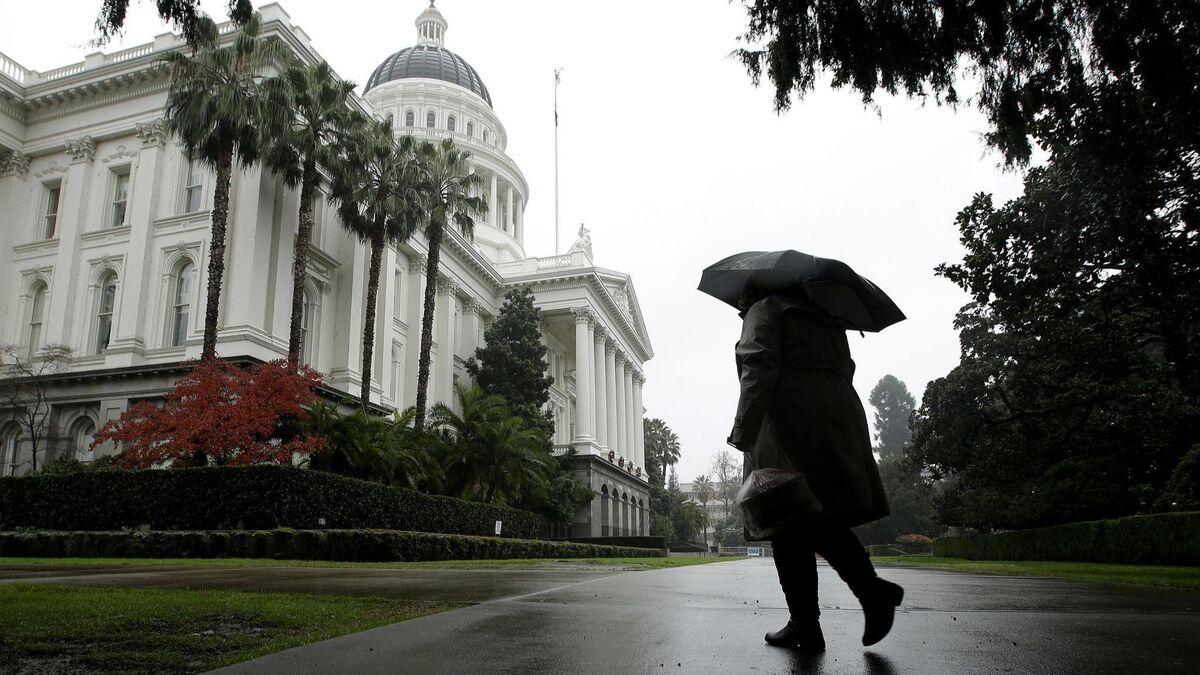
A top legislative staff member has resigned during an investigation that substantiated allegations he made sexually inappropriate comments to two female state employees in violation of state policies, according to internal documents and a letter to Wilson from Debra Gravert, the chief administrative officer for the Assembly.
The investigation looked at sexual harassment allegations against Rodney Wilson, who was chief of staff to Assemblyman Tom Daly (D-Anaheim) until Wilson resigned Jan. 2 to become a state lobbyist. One female state employee told Assembly personnel investigators that on the last day of session in September that Wilson came into an unidentified state office after hours and appeared intoxicated.
The staff member, whose name was redacted from investigative reports, alleged Wilson made “sexual innuendos” toward her and another woman who told her “she was upset with Wilson’s behavior,” according to internal documents and a letter to Wilson from Debra Gravert, the chief administrative officer for the Assembly.
The letter said there were two witnesses who heard sexually inappropriate comments made by Wilson toward another employee.
“Based on the interviews, the investigator determined this allegation was substantiated, that is, it is more likely than not that the alleged conduct did occur,” Gravert wrote March 13.
The investigator reached the same conclusion on an allegation that Wilson made “unwanted sexually suggestive” comments to a second employee.
“This finding is based on the fact that the complainant’s recollection of this conversation was found to be more credible than your denial,” Gravert wrote to Wilson.
The investigation also substantiated allegations that Wilson “leered at two Assembly employees, making them uncomfortable.”
Wilson said in a statement that his resignation had nothing to do with the allegations and he does not recall making offensive comments or looking at the women inappropriately.
“While I disagree with the `more likely than not’ conclusions of this investigation and believe I should be able to review the report, I respect the Assembly’s process in dealing with the complaint,” Wilson added. “I sincerely apologize to those who may have been offended by their perception of the way I looked at them or what they believe they might have heard.”
Although Wilson’s resignation precludes any personnel action, the Assembly Rules Committee will use the findings as the Assembly “works to improve the culture in the California State Capitol as it pertains to harassment including initiating remedial action designed to help preclude future occurrences of harassing comments,” Gravert wrote to the two female staffers who made the complaints.
Daly, who was not implicated in the allegations, said: “Today is the first that I have heard of any accusations against him (Wilson). I fully support the work of the Assembly toward reinforcing our zero-tolerance policy on harassment.”
The documents were released at the request of the Los Angeles Times and other newspapers as a series of allegations of sexual harassment have led to the resignation of three other state legislators.
Updated at 5 pm to include a comment from Daly. Updated at 6:25 pm to include a statement from Wilson.
- Share via
The effort to raise taxes on commercial property by changing Prop. 13 delays push to 2020
An ambitious effort to raise commercial property taxes through revamping California’s Proposition 13 will no longer be aimed at earning a spot on this fall’s statewide ballot, supporters said on Friday.
“The longer that we have to explain this issue, the better that we’re going to do,” said Mac Zilber, a political strategist working with the coalition of community and labor groups behind the plan.
Long discussed among liberal and Democratic activists, the proposed initiative would redefine Proposition 13’s limits on property taxes to focus mostly on homeowners. Commercially owned properties would be assessed at market values — a change the group believes could generate as much as $11 billion a year for local services and schools.
It would also have a significant impact on California’s state budget, which has subsidized K-12 education with personal income tax dollars since local revenues were slashed by Proposition 13 in 1978.
The backers of the “split roll” initiative conceded that California’s election laws offer a unique opportunity to qualify their initiative now — while the number of signatures needed to qualify for the ballot is low — and have the measure be held over until the November 2020 election.
State law sets the number of signatures needed for an initiative on the total number of votes cast in the race for governor — a threshold that dropped to a historic low after anemic voter turnout in 2014. Those requirements will be reset after this fall’s election to replace Gov. Jerry Brown.
The initiative, which was cleared for signature-gathering in February, has until August to collect support for the 2020 ballot. The longer time frame means the process is likely to cost much less than a hurried effort to meet the deadlines for the Nov. 6 statewide ballot.
“It helps us shepherd our funds and use them in the most efficient way,” Zilber said.
- Share via
Latino support becomes a flashpoint in race for California governor
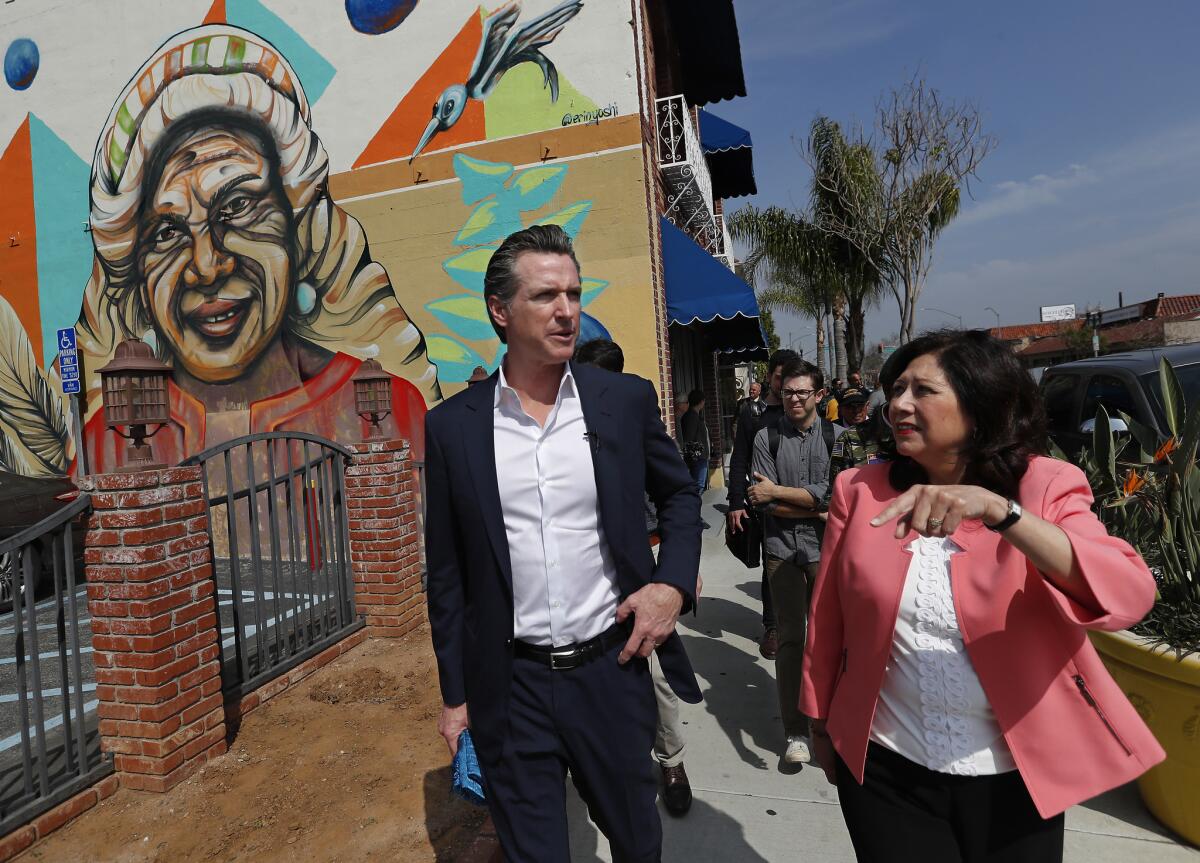
After facing criticism for not taking part in a Latino business group’s gubernatorial forum, Lt. Gov. Gavin Newsom has rolled out an endorsement from one of the most prominent Latino politicians in the state.
Hilda Solis, a former member of the Obama administration who now serves on the Los Angeles County Board of Supervisors, announced Thursday that she was backing Newsom at a campaign event in East Los Angeles.
“Gavin Newsom is a true champion for all Californians,” Solis said in a statement, pointing to his record on healthcare and city finances as mayor of San Francisco. “There’s no question that on issues that matter to families — from providing quality health care and good paying jobs to standing up for immigrant families and protecting Californians from Donald Trump’s attacks — Gavin’s the leader we need sitting behind the Governor’s Desk.”
The event took place the day after Newsom was the sole Democrat to skip a gubernatorial forum hosted by the L.A. Latino Chamber of Commerce in downtown Los Angeles.
A spokesman for his campaign previously said that Newsom had taken part in multiple debates and forums sponsored by labor, Democratic and education groups, and was not planning on attending another one until early May.
Former Los Angeles Mayor Antonio Villaraigosa, state Treasurer John Chiang and former state schools chief Delaine Eastin all noted his absence at the chamber gathering.
Gloria Molina, who represented Los Angeles for more than three decades in city, county and state legislative office, was among those who criticized Newsom for failing to attend the forum.
“Hillary Clinton and Bernie Sanders met more than 20 times in debates and forums — if the Democratic candidates for president were willing to show respect to the voters by debating, why won’t Gavin Newsom debate?” Molina said in a statement. “If Gavin won’t show up for our community when he is looking for votes, will he care about our community when he is Governor?”
Molina is backing Villaraigosa, who is fighting to make the top two in the June primary, and whose campaign is partly dependent on Latino voters turning out in large numbers. In a March poll by the Public Policy Institute of California, Villaraigosa won the support of 37% of Latino voters, with Newsom receiving 19%.
- Share via
No, California’s ‘sanctuary state’ law does not allow the release of dangerous criminals to the streets
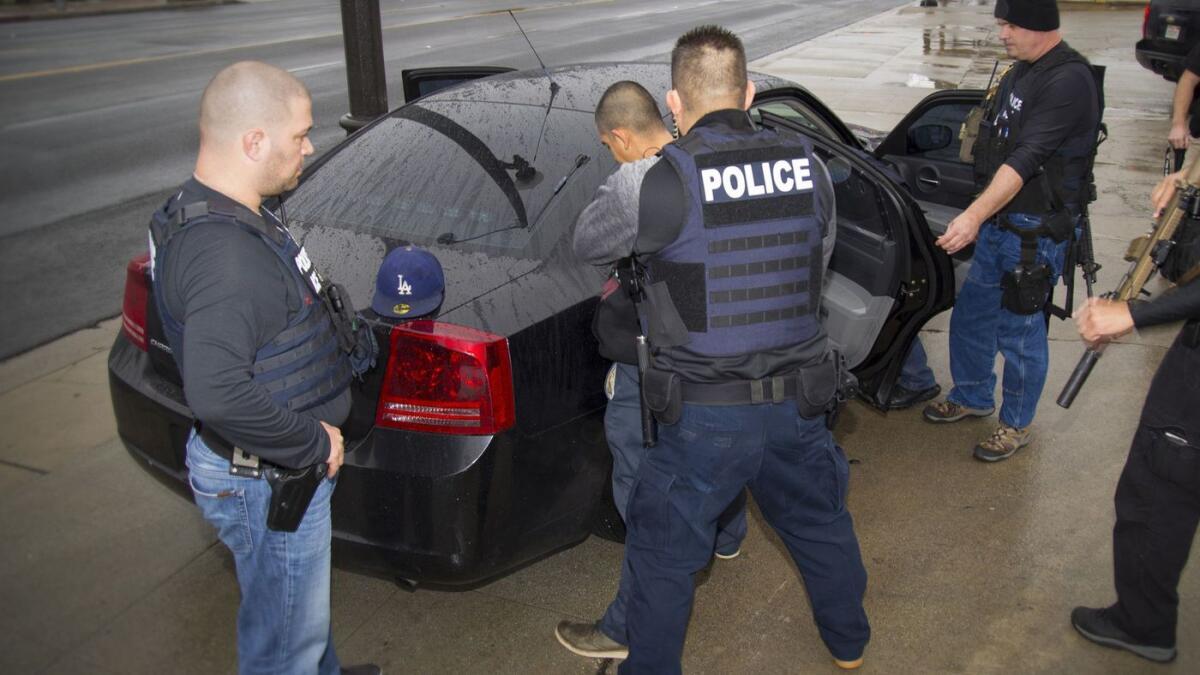
As the fight over California’s immigration policies intensifies, so have the attacks from opponents who argue its landmark “sanctuary state” law is allowing the release of violent criminals into the streets.
The California Values Act, which was signed into law last year, prevents law enforcement officers in many cases from holding and questioning people at the request of federal immigration agents, and limits them from sharing the release dates of some county jail inmates who are in the country illegally.
The law has set off a tense showdown over public safety. But some officials who oppose the measure have distorted its scope.
Here is a look at some of those statements.
- Share via
100,000 California teenagers are now pre-registered to vote
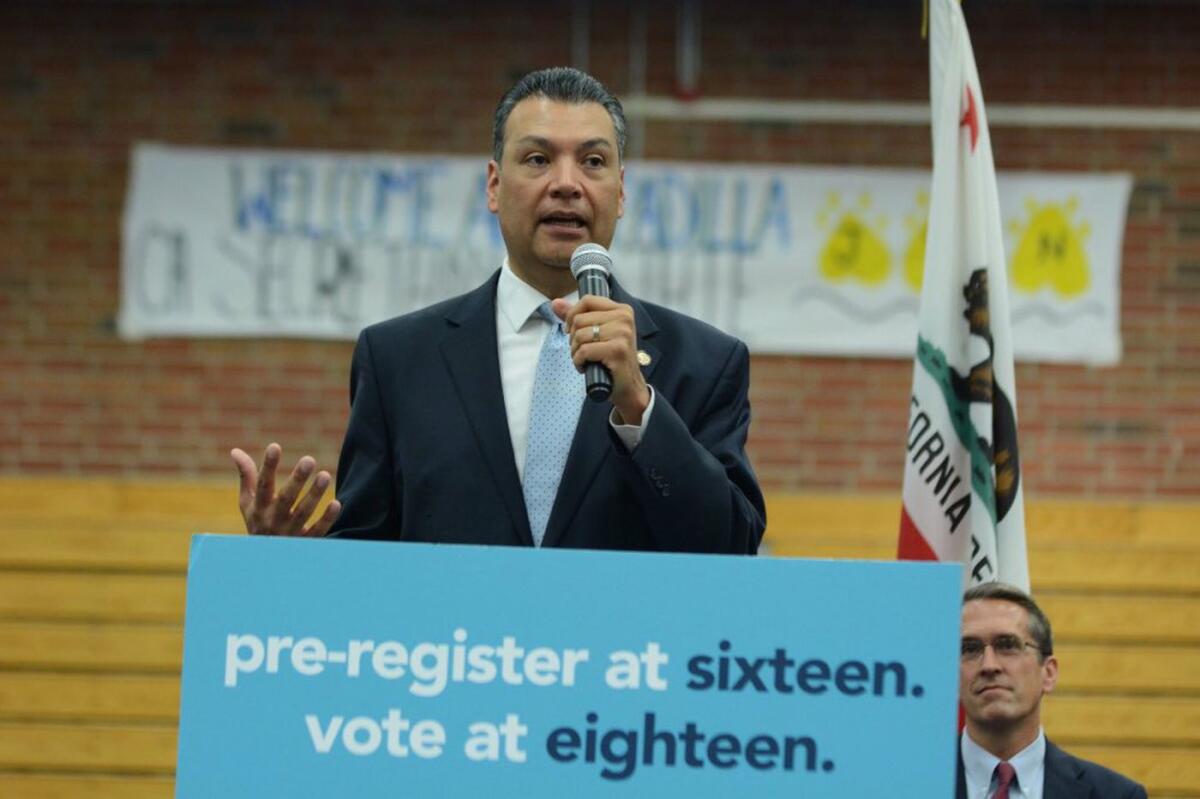
California’s effort to get 16- and 17-year-olds to pre-register to vote has now enlisted 100,000 teenagers, according to information released on Friday by Secretary of State Alex Padilla.
“This is a big milestone,” Padilla said. “I’m optimistic it’s going to translate into action at the ballot box.”
The program, which began in the fall of 2016, automatically activates the teen’s registration at age 18. State officials reported that more than 10% of the total number of pre-registrations have come in just the last few weeks.
Padilla said there’s been a noticeable uptick in teenagers signing up following the mass shooting at a Parkland, Fla., high school in February and last month’s nationwide protests over gun violence.
“The impact of recent events is undeniable,” Padilla said. “It’s absolutely served as a motivator for young people to pay more attention.”
About 43% of the pre-registrations were California teenagers who chose to be unaffiliated, non-party voters. About 38% chose the Democratic Party and just 10% chose to be ultimately registered as a Republican.
The state’s chief elections officer announced the new milestone for teenager pre-registration at the same time he unveiled a new state website designed to connect high school students with civic engagement opportunities, including mock elections and student poll worker programs.
- Share via
Compton Mayor Aja Brown drops congressional bid
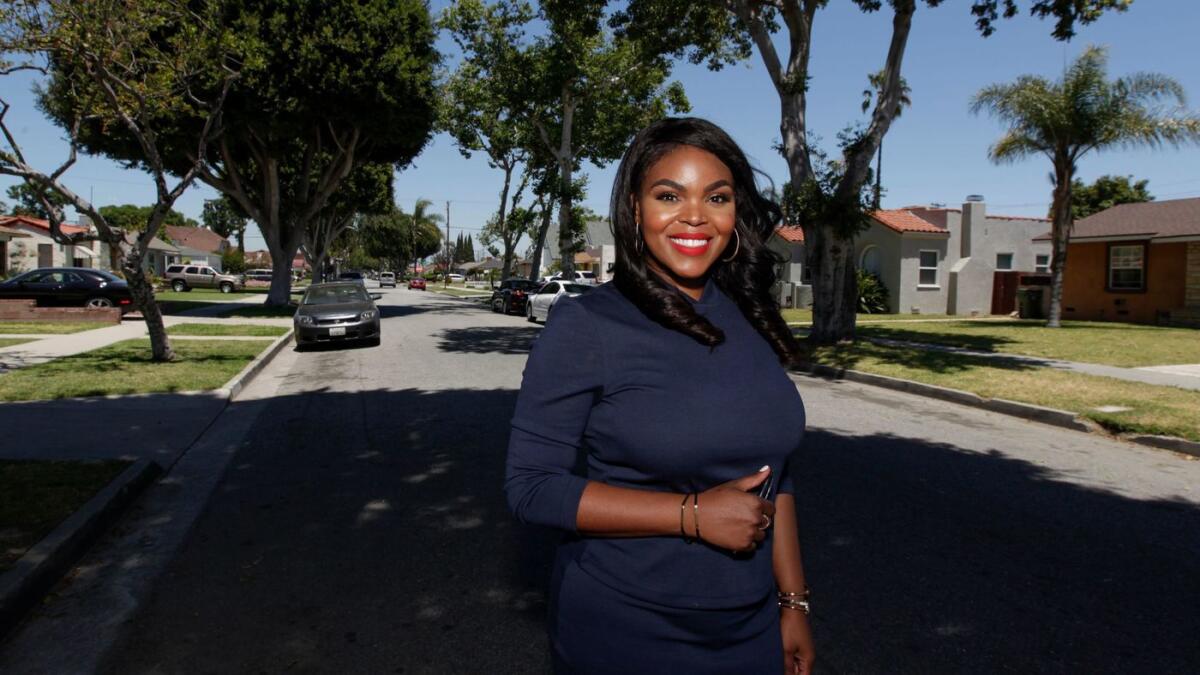
Compton Mayor Aja Brown said Thursday night she is withdrawing her candidacy in California’s 44th Congressional District, a week after conservative celebrity Stacey Dash dropped out of the race.
They each were trying to unseat freshman Rep. Nanette Barragán (D-San Pedro), who is running a well-funded campaign. The district is overwhelmingly Democratic.
Brown said she is expecting her first child. “My family commitments supersede my ability to expand my level of service,” the mayor said in a statement.
Brown, a Democrat, and Dash, a Republican, will still remain on the ballot.
The short-lived Dash candidacy shook up Barragán’s otherwise straightforward reelection race. Brown launched a last-minute bid last month citing Dash as a “motivating” factor in her decision.
- Share via
Sen. Kamala Harris on Stephon Clark: ‘My heart breaks for what has happened’
Sen. Kamala Harris told a Sacramento crowd Thursday she was grieving with them over the death of Stephon Clark, an unarmed black man whose shooting by police nearly three weeks ago has roiled California’s capital city.
Hosting a town hall at a church, Harris addressed the shooting at the outset and touted training for law enforcement to counter implicit bias, telling the audience that Clark’s life “is a life that should not have been lost. That is a loss that should not have been taken.”
The Democrat, who had been criticized by some black lawmakers during her previous job as California’s attorney general for not taking stronger action on police shootings, spoke of her work to establish implicit-bias training while serving as the state’s “top cop.”
That program, she said, “trained over 2,000 police officers to recognize that we all carry bias. We all do. But when your bias is coupled with the fact that you carry a gun, it is something that has to be a priority for us.”
Clark’s shooting was a constant thread through the afternoon. At one point, the church’s leader paused questions to acknowledge Clark’s grandmother in the audience. She received a standing ovation.
The incident was at the forefront of attendees’ minds as well. Patricia Holt, who traveled from Vallejo for the town hall, said that she wanted to hear Harris say that “she is going to do something to make the Police Department be held accountable for what they’ve been doing.”
Harris was less specific when it came to proposals pending before the state Legislature to address police shootings, including one that would raise the standard for the use of deadly force.
“I’m looking forward to seeing the language,” Harris told reporters after the event. “I think they’re very interesting. Certainly there’s work to be done.”
Asked whether she believed law enforcement had too much clout in the state Capitol, she did not directly address their influence.
“I think we need to have reform,” she said. “There’s no question.”
Speaking before a largely friendly crowd who delighted in Harris’ frank descriptions of life in Washington — “It’s a whole situation in D.C.,” she said — the senator appealed to Democratic orthodoxy, calling for an overturn of the U.S. Supreme Court’s Citizens United decision on campaign finance and vowing to support bipartisan comprehensive immigration reform.
A small but vocal group of President Trump supporters occasionally shouted questions at her, accusing her of prioritizing those in the country illegally over American citizens.
“I’m not putting anybody over anybody,” she responded to applause.
- Share via
California housing crisis podcast: Why aren’t there enough construction workers in the state?
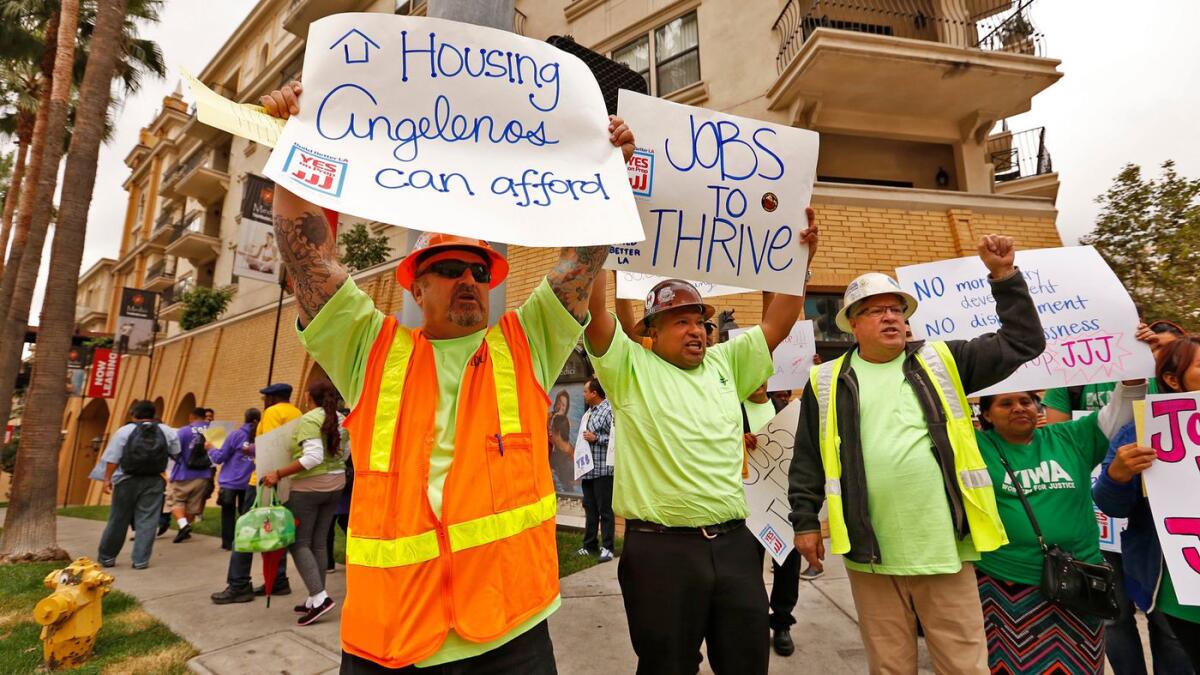
California has a shortage of homes, which is a key factor in the state’s affordability crisis.
To fix that problem, a lot more building will need to happen in the state. But there’s another issue: an ongoing shortage of construction workers.
On this episode of Gimme Shelter: The California Housing Crisis Pod, we talk about the labor shortage and how that is affecting homebuilding across California. We also debate the influence of the state construction workers union at the Capitol and the significance of union-level wages for building new houses.
Our guests are Rachel Bardis of Bardis Homes, a Sacramento-area developer, and Alex Lantsberg, an analyst with the San Francisco electricians’ union.
“Gimme Shelter,” a biweekly podcast that looks at why it’s so expensive to live in California and what the state can do about it, features Liam Dillon, who covers housing affordability issues for the Los Angeles Times’ Sacramento bureau, and Matt Levin, data reporter for CALmatters.
You can subscribe to “Gimme Shelter” on iTunes, Stitcher, Soundcloud, Google Play and Overcast.
- Share via
In an already tough election year, Dana Rohrabacher is struggling with his own party
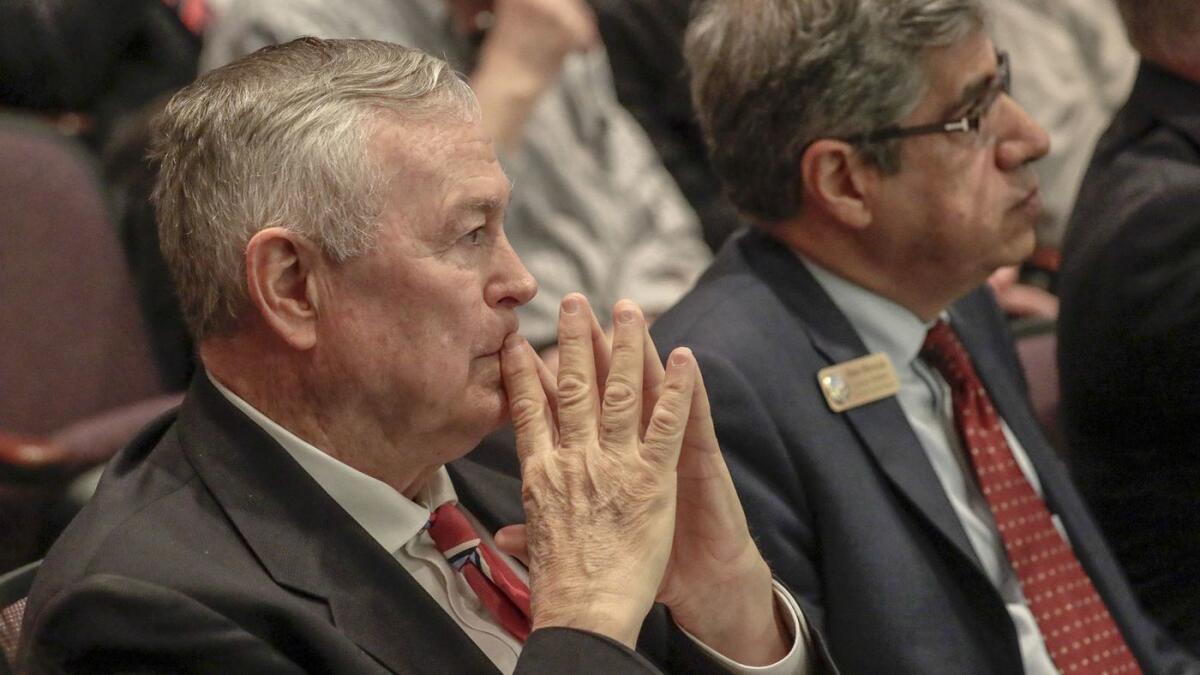
Rep. Dana Rohrabacher was already having a tough election year.
The Orange County Republican has drawn more than half a dozen Democratic challengers, some of whom have raised more cash than the 15-term congressman.
Election have handicappers declared his race a toss-up, protesters have shown up at his home and district office, and Rohrabacher’s name has frequently come up during the investigation into Russian election meddling because of his connections to key figures in the inquiry.
Then Scott Baugh, a well-known Republican who spent more than a decade leading the county party, decided to run against him.
As the GOP works to protect vulnerable incumbents whom Democrats want to oust in order to regain control of the House, Rohrabacher’s longtime local support network is starting to buckle.
- Share via
California lawmakers want to roll back some criminal sentencing laws, keep young offenders out of adult court
In a legislative hearing packed with criminal justice experts and former youth offenders, California lawmakers pushed forward a bill this week to keep minors who commit crimes out of adult courts.
The proposal, one of several in a package of bills introduced by Sens. Holly J. Mitchell (D-Los Angeles) and Ricardo Lara (D-Bell Gardens), is part of an ongoing effort to divert young people from a path to prison and create parity in state punishment laws. Other bills would roll back mandatory sentencing rules that research shows disproportionally affect black and Latino defendants.
At a news conference on Tuesday, Mitchell pointed to the fatal Sacramento shooting of Stephon Clark, an unarmed, 22-year-old black man shot by police in his grandparents’ backyard, challenging lawmakers and advocates to redefine the definition of public safety so that it applies to everyone.
- Share via
Watch: Democrats attend forum for Latino-owned businesses
Three gubernatorial candidates are talking about issues affecting Latino-owned businesses at a forum hosted by the Los Angeles Latino Chamber of Commerce in downtown Los Angeles.
Participating are Democrats Antonio Villaraigosa, John Chiang and Delaine Eastin. Front-runner Gavin Newsom is not attending.
- Share via
Two races to replace assemblymen accused of sexual misconduct go to runoff
Contests to replace two Democratic San Fernando Valley state assemblymen who resigned amid accusations of sexual misconduct are headed to a June primary with Democrats favored to keep both seats.
Democrats Luz Rivas and Jesse Gabriel each won the most votes in their respective races to fill the remaining terms of former Assemblymen Raul Bocanegra and Matt Dababneh in the heavily Democratic districts, according to initial but still unofficial results.
Rivas, a 44-year-old science educator and Los Angeles Public Works Commissioner, beat out four other Democrats on the ballot with 41% of the vote. She will face No. 2 finisher Republican plumbing and electrical contractor Ricardo Benitez, 60, who claimed 21% of the vote in the race to replace Bocanegra.
Rivas and Benitez are competing to represent the 39th Assembly District, which includes Sylmar, Sun Valley and North Hollywood. Just over 52% of voters in the district are registered Democrats; 14% are Republicans.
In the 45th Assembly District, Gabriel, a 36-year-old Encino attorney with degrees from UC Berkeley and Harvard, came away with 32% of the vote, besting five other Democrats on the ballot and one candidate with no party preference. Republican Justin Clark, a 19-year-old freshman at Cal State Northridge who also works at a Calabasas ice cream shop, won 27% of Tuesday’s vote.
About 48% of voters in the district, which includes Hidden Hills, Canoga Park and Northridge, are Democrats; about 22% are Republicans.
Voter turnout was low in both contests with just 6.45% of voters casting ballots in the 39th district and 9.43% of voters in the 45th district.
Gabriel and Rivas were among the top fundraisers in their races and were aided by outside spending from a pro-charter school group called California Charter Schools Assn. Advocates. Rivas benefited from $595,000 in support while Gabriel received $292,000 worth of support.
Clark said he had raised about $1,500 while Benitez said he has raised around $2,500. Both expressed confidence in the face of long electoral odds.
“Our challenge is going to be making a dent in the fundraising race,” said Clark, who identifies as a constitutionalist on Twitter, about his campaign. “We have the message, we have the passion we just need the funds.”
Eric Bauman, chair of the California Democratic Party crowed at Tuesday’s results of the two special elections. He also boasted about the election of Sydney Kamlager to the state Assembly in a different Los Angeles County seat, saying the results “show that the Resistance is thriving and our progressive values are advancing in California.”
“These results only further energize us as we prepare for a Big Blue Wave in June and November,” Bauman said in a statement.
Voters might get a little confused when they go to vote June 5 to pick a candidate in these two races to fill the remaining terms of the resigned Assemblyman.
That is because on the same day they will have to pick between a similar field of candidates in a general election primary to pick the person to fill the same seats during the next full term in Assembly.
- Share via
After Stephon Clark shooting, California lawmakers push to make it easier to prosecute police officers
Flanked by civil rights advocates, California lawmakers announced new legislation Tuesday designed to make it easier to prosecute police officers who kill civilians.
“We have been deeply saddened and frustrated by the killing of black and brown men by law enforcement,” said Assemblywoman Shirley Weber (D-San Diego), the bill’s author. “It seems that the worst possible outcome is increasingly the only outcome that we experience.”
The bill follows the Sacramento shooting of Stephon Clark, an unarmed, 22-year-old black man who was killed in his grandmother’s backyard last month by police looking for a vandal in the neighborhood. Lawmakers described Clark’s killing, and other instances in which officers shot black and Latino residents, as the impetus behind the legislation.
- Share via
Community college trustee Sydney Kamlager wins Assembly special election, two other races go to June runoff
Sydney Kamlager, a Los Angeles community college trustee, was elected Tuesday to the Assembly in a special election while candidates in two other nearby vacant seats are headed to a June 5 runoff.
Kamlager, 45, will serve the remaining seven months in the term of former Assemblyman Sebastian Ridley-Thomas, who cited health issues in his resignation late last year.
Unofficial returns on Tuesday showed her winning almost two-thirds of the votes cast for any of the four candidates on the ballot in the 54th Assembly District — more than enough needed to win the job outright without a runoff election.
“It’s an awesome responsibility I have ahead of me,” Kamlager said.
The Democrat was elected to the Los Angeles Community College Board of Trustees in 2015. She also serves as district director for state Sen. Holly Mitchell (D-Los Angeles). Kamlager cited not only education, but criminal justice reform and poverty as issues she hopes to focus on upon her arrival in Sacramento.
“I think people responded to my experience in the district,” she said.
The Assembly district encompasses communities west of downtown Los Angeles, from Crenshaw to Culver City and as far north as Westwood.
Elections to fill two other Assembly vacancies — caused by the resignations of Democrats Raul Bocanegra of Pacoima and Matt Dababneh of Woodland Hills — were unresolved Tuesday. No candidate received 50% plus one of the votes, and the top two vote-getters in each race will square off on June 5. Bocanegra and Dababneh both resigned in the wake of sexual misconduct allegations.
Early returns indicated bipartisan runoffs in those districts come June: Democrat Luz Rivas and Republican Ricardo Benitez in the 39th Assembly District, and Democrat Jesse Gabriel and Republican Justin Clark in the 45th Assembly District.
Kamlager, who will join the Assembly this month, isn’t finished with campaigning. She is also a candidate for a new full two-year term that begins in December and will have to compete for that stint — as the incumbent — in June.
- Share via
Former aide to Tony Mendoza sues him, California Senate alleging retaliation for whistleblowing
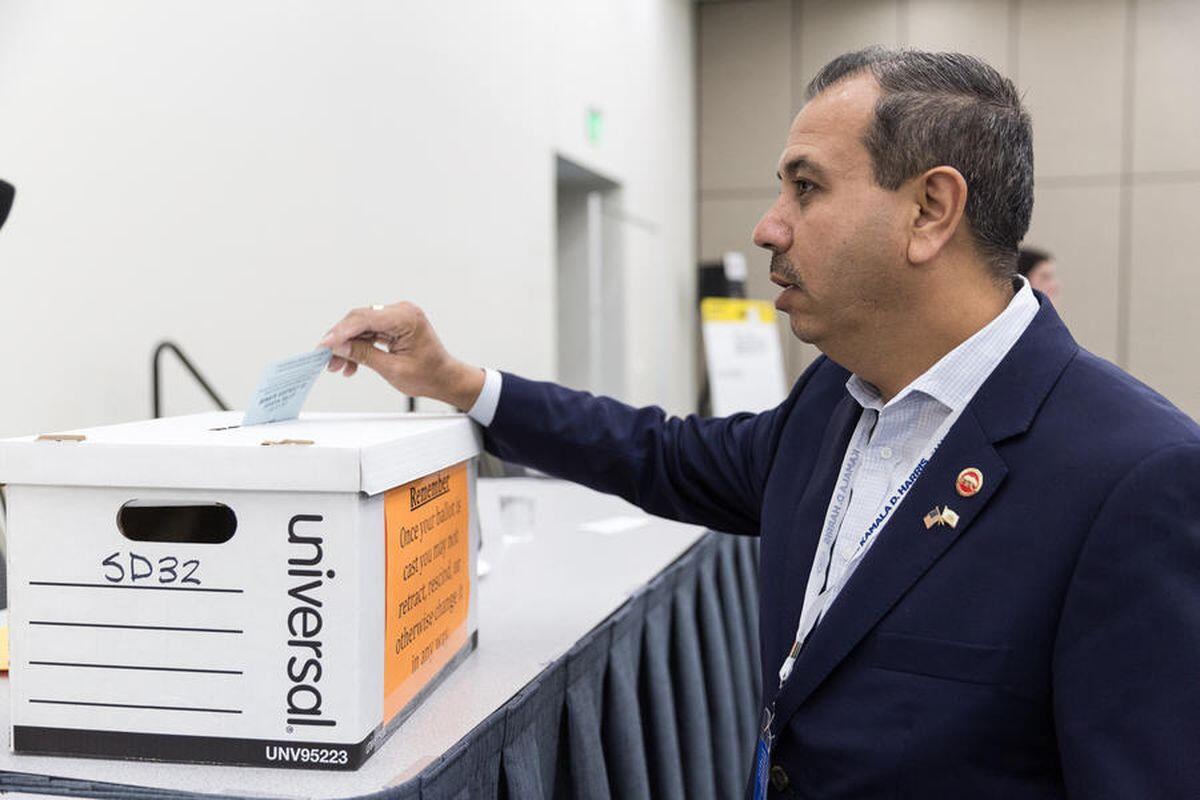
A former legislative aide sued the California Senate and recently resigned Sen. Tony Mendoza on Tuesday, alleging she was wrongfully terminated in retaliation for complaining about Mendoza’s alleged sexual harassment of a young female staff member.
Mendoza, a Democrat from Artesia, resigned in February under threat that the Senate would expel him after an investigation concluded that he made six female aides uncomfortable with a pattern of “unwanted flirtatious or sexually suggestive behavior.” He has denied wrongdoing and is running in the June election to reclaim his seat.
Adriana Ruelas, who filed the lawsuit in Sacramento Superior Court, was the legislative director for Mendoza when he terminated her in September. She was not one of the women allegedly sexually harassed.
The lawsuit, which seeks unspecified monetary damages and also names Senate administrators, alleges “unlawful termination” based on “retaliation” for Ruelas’ complaints regarding Mendoza’s “pattern of discrimination, harassment and inappropriate behavior towards a young female staff member.” Ruelas also alleges fraud and defamation by state officials.
Micha Star Liberty, Ruelas’ attorney, said she hopes the Legislature will change the system to address problems identified by the lawsuit. “This is the first step toward having a healthy, zero-tolerance policy for harassment and retaliation,” she said.
Ruelas says that she was warned in late 2016 by David Pacheco, then director of the California Senate Fellows program that Mendoza had “issues with women” in the past.
Mendoza twice asked a young female fellow assigned to his office to accompany him on overnight trips involving his post, making the aide uncomfortable, and invited her to his home with an offer to help her work on her resume, the lawsuit alleges.
The allegations of retaliation were previously contained in a formal complaint filed in January by Ruelas that was disputed by Dan Reeves, the chief of staff to then-Senate leader Kevin de León.
Reeves alleged that Ruelas did not complain about Mendoza’s behavior until after she was fired last year. An investigation by two outside law firms hired by the Senate concluded that Ruelas and two other former Mendoza staffers who complained about his conduct were terminated for “reasons unrelated to any complaint of sexual harassment.”
Ruelas’ lawsuit alleges the investigation was flawed and says she made complaints to Mendoza’s chief of staff, who told her he had relayed them to Jeannie Oropeza, head of human resources for the Senate, before Ruelas’ termination. The lawsuit disputes Mendoza’s claim that Ruelas’ termination was based on her work performance.
Oropeza and Senate Secretary Daniel Alvarez are also named as defendants in the lawsuit, which also alleges a hostile work environment was created by Mendoza’s district director.
- Share via
Former California legislator Matt Dababneh, who resigned amid sexual harassment allegations, opens new campaign committee
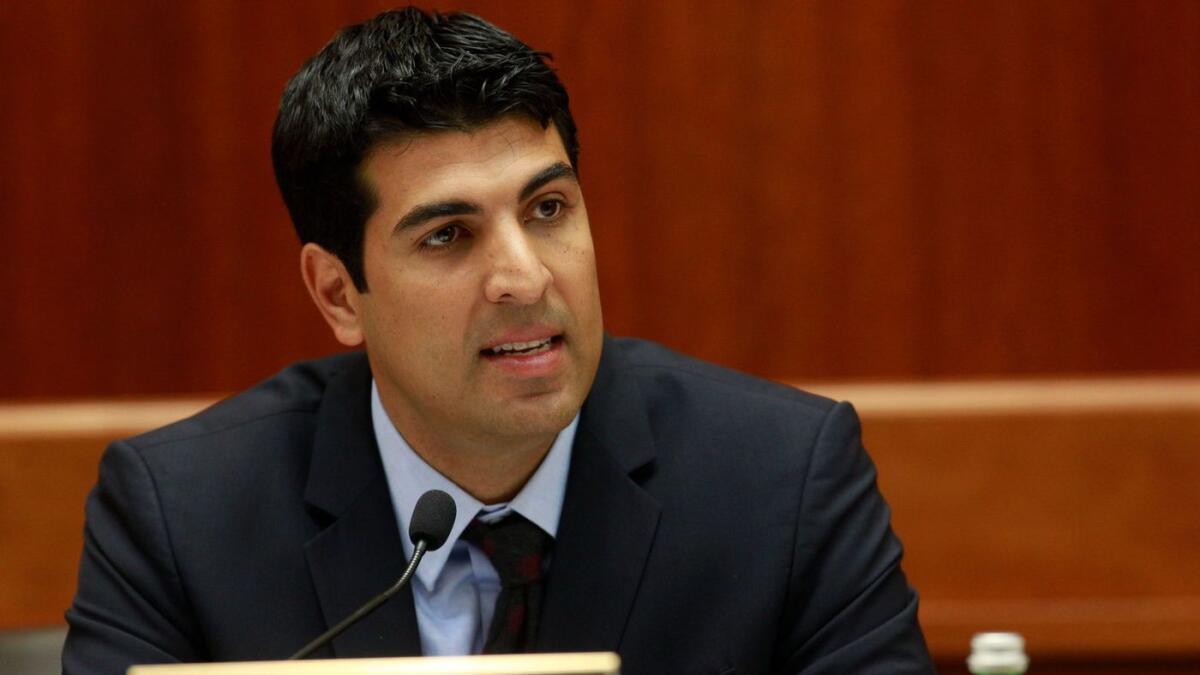
Matt Dababneh, the former Democratic assemblyman who resigned last year amid allegations of sexual misconduct, has opened a new fundraising committee that would enable him to tap into previously raised campaign cash.
Dababneh, who represented Woodland Hills from 2013 through 2017, stepped down at the end of last year after being accused of sexual misconduct by multiple women, including a female lobbyist who said he masturbated in front of her. Dababneh denied any wrongdoing but resigned in December, saying the current environment made it too difficult to do his job. A legislative investigation into those claims is ongoing.
A prolific fundraiser, Dababneh had more than $1.1 million in his reelection account as of January. Under campaign finance law, those funds would become “surplus” 90 days after he left office. Surplus funds are restricted in how they can be used, such as paying off debts or refunding contributors. They cannot be used for future elections.
But if those funds are transferred to a new campaign committee, they would be usable for a campaign in the future. A “Matt Dababneh for Lieutenant Governor 2022” committee was filed Friday with the Secretary of State. The move does not necessarily mean Dababneh is planning a run, but it keeps his campaign cash available.
A representative for Dababneh declined to comment.
- Share via
Republican John Cox launches radio ad in the Central Valley blasting Democratic rival Antonio Villaraigosa
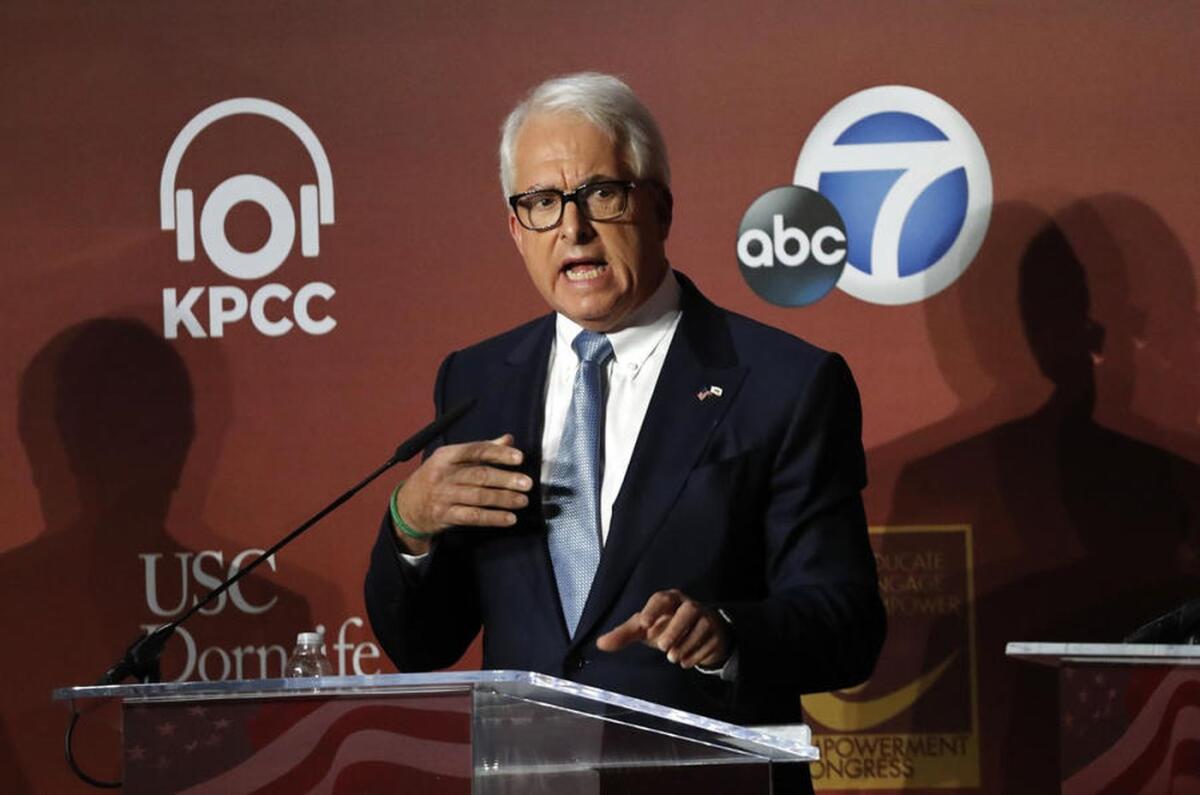
GOP gubernatorial candidate John Cox launched a radio ad in the Central Valley on Monday blasting Democratic rival Antonio Villaraigosa over his support for high-speed rail.
“L.A. Democrat Antonio Villaraigosa would spend billions on the bullet train because - quote – ‘it connects the two engines of the California economy.’ Apparently, Mr. Villaraigosa doesn’t realize that the Central Valley is home to another economic engine – one that actually produces something,” Cox says in the 60-second ad. “It’s called California agriculture, and it’s feeding the world.”
Cox, who inched ahead of Villaraigosa in a recent poll for second place in the race, is spending about $70,000 to air the ad for two weeks on radio stations between Bakersfield and Modesto, according to his campaign.
Villaraigosa has been spending considerable time in the Central Valley as he runs for governor. The quote Cox cites, from a July campaign event in Orange County, is incomplete.
While Villaraigosa did say that high-speed rail would connect Southern California and the Bay Area, he said it would connect those regions to affordable housing and benefit the swath of land between the two.
“In the Central Valley, it’s going to connect affordable housing with the two economic engines and provide more access to jobs,” Villaraigosa said, according to the Orange County Register.
A spokesman for Villaraigosa responded to the ad by reiterating the former Los Angeles mayor’s support for high-speed rail.
“Mayor Villaraigosa supports infrastructure investments, including the high-speed rail, which will create thousands of jobs and strengthen our economy by connecting the two economic engines of the state,” spokesman Luis Vizcaino said. “He has also said time and again that as governor, he will work to require greater efficiency in all aspects of the process.”
The Central Valley was once a GOP stronghold, but has moved leftward in recent years. In his ad, Cox noted his familial ties to the region as he sought to court its voters.
“I have family that lives in the Central Valley and they treasure its unique way of life and shared good-neighbor values,” he says. “Those values include hard work, faith and family – values worth fighting for. And fight we must.”
Cox noted that former state Senate leader Kevin de León called the region remote and full of tumbleweeds, and tried to tie Villaraigosa to De León.
“For the political elite, the Central Valley is just a whistle stop. Oh, and a place to steal water,” he said, before calling for a “Tumbleweed Rebellion.”
- Share via
State senators condemn fatal police shooting of Stephon Clark
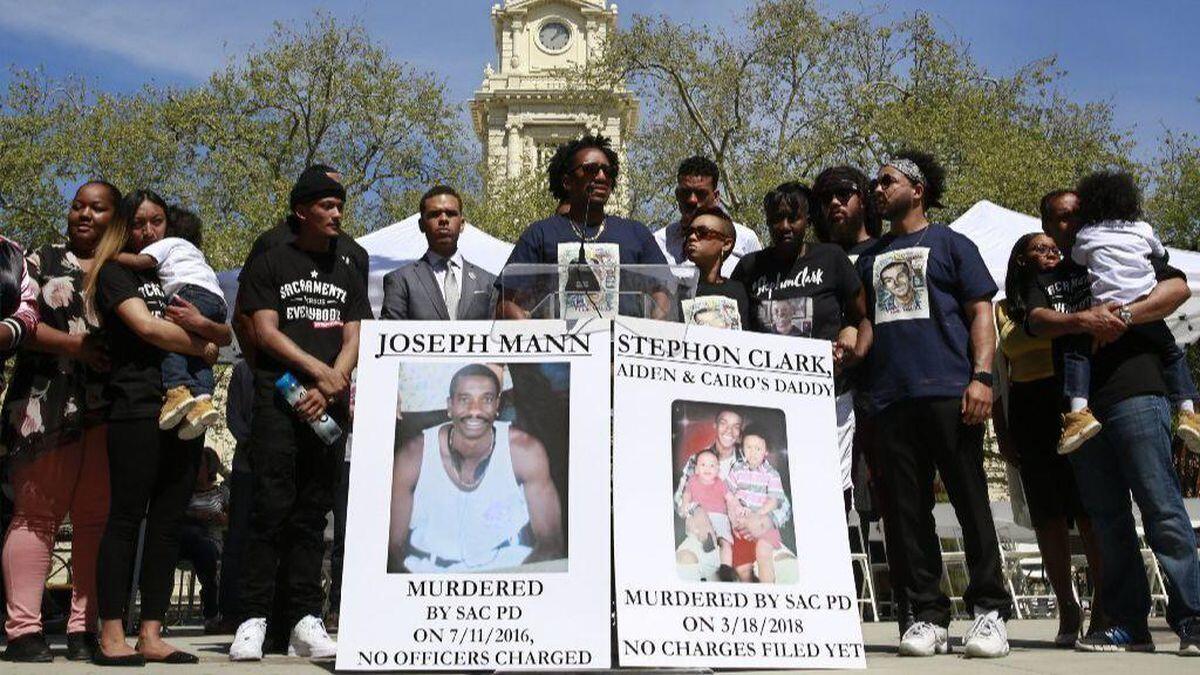
Lawmakers’ tempers flared Monday as the California Senate adjourned in memory of Stephon Clark, an unarmed African American man who was shot to death by Sacramento police officers on March 18.
Sen. Steven Bradford (D-Gardena) denounced the shooting, saying Clark did not get a day in court “because the police chose to be judge, jury and executioner.”
Bradford, who is black, said the shooting was part of a pattern of “brutalization of African Americans by law enforcement.”
Clark was shot dead in his grandmother’s backyard as two officers pursued reports of a vandal in his neighborhood. The shooting has led to demonstrations in Sacramento and condemnation from civil rights leaders across the country.
Sen. Holly Mitchell (D-Los Angeles), who is black, said “race matters” when it comes to the treatment of the public by the police.
“We clearly have a big problem here in America,” added Sen. Richard Pan (D-Sacramento).
Republican Sen. Ted Gaines of Rocklin said change is needed in police policies, adding “clearly something went wrong” in the outcome of the police response. Several lawmakers are introducing legislation in response to the Clark shooting.